Sites: news | india | latam | brasil | indonesia
Feeds: news | india | latam | brasil | indonesia
topic: Protests
Social media activity version | Lean version
As miner quells protests in Ecuador, Canadian firms’ rights record faces scrutiny
- In March, violent clashes erupted between Ecuadorian security forces and campesino farmers over prospects for the revival of a mining project that has been rejected by protestors for at least 15 years.
- The company behind the project, Atico Mining, called in hundreds of police and paramilitary personnel to quell the protests, in what critics say is a disturbing pattern of Canadian resource companies running roughshod over human and environmental rights in other countries.
- Human rights advocacy groups and Indigenous organizations say the Canadian government, especially the embassy in Quito, has failed to safeguard human rights and environmental obligations despite its legal duties to do so.
- A spokesperson for the Canadian foreign ministry said the government expects Canadian companies operating abroad to abide by internationally respected guidelines on responsible business conduct — then cited guidelines that aren’t legally binding.
At its fourth summit, 170 nations strive toward a global plastics treaty by 2025
- Last week, the International Negotiating Committee of the United Nations Environment Programme wrapped up the fourth of five scheduled negotiating sessions to develop an international treaty to control plastic pollution.
- Environmentalists say the atmosphere in Ottawa was better and more cooperative, with more achieved than at the third meeting, which took place in November and bogged down in procedural disagreements. However, there was little forward progress in Ottawa on a proposal to significantly reduce plastic production.
- For the first time ever, the pollution of the world’s oceans by large amounts of “Ghost gear” came under discussion at a treaty summit. This plastic waste includes a variety of fishing equipment, including plastic traps, nets, lines, ropes and artificial bait left floating in the world’s seas which can harm marine life and degrade into microplastics.
- Two committees have been authorized to work during intersessional meetings on draft language for discussion and possible adoption at the next, and potentially final treaty session, scheduled for late November in Busan, South Korea. The goal is to achieve a plastic pollution treaty by 2025.
Indigenous communities along Argentina’s Río Chubut mobilize to conserve waterway
- A caravan of Indigenous Mapuche activists recently concluded an 847-km (526-mi) trek down Argentina’s Chubut River, meeting with communities along the way to raise awareness of the issues they face along the shared waterway.
- From each trawün, or gathering, they determined that Indigenous access to land and water is diminishing, that large-scale projects on their lands are going ahead without their prior informed consent, and that Mapuche communities need a unified stance toward state decisions.
- Huge swaths of land along the river have been bought up by private interests, including foreign millionaires, cutting off access for the Mapuche to the Chubut that they consider not just a physical resource but a spiritual entity.
- The Mapuche are also concerned about policy changes under Argentina’s new libertarian administration, which has already kicked off a massive deregulation spree and could lift a ban on open-pit mining in the region.
Uttarakhand limits agricultural land sales amid protests & tourism development
- Following widespread protests, Uttarakhand’s Chief Minister Pushkar Singh Dhami has issued orders to district magistrates to deny permission to sell agricultural lands to those outside the state.
- With just 14% of its land designated for agriculture and more than 65% of the population relying on agriculture, calls for legislation to safeguard residents’ land rights have intensified.
- With a lack of comprehensive, updated land records, monitoring the usage of farmlands for nonagricultural purposes has become challenging.
- Lack of employment opportunities and resources as well as shifting weather patterns and climate change have pushed numerous farmers to sell their land holdings.
Effective climate activism requires honest conversations about its challenges
- Climate activist Clover Hogan says environmental activists face growing challenges not just from outside their movements, but also from within.
- She shares how the prevalence of unpaid labor can make young activists’ lives even more difficult in the present while they advocate for a more livable future.
- Add to that criticism for perceived imperfections over lifestyle choices and infighting between colleagues that can lead some to choose not to identify as activists at all, or leave movements altogether, she says.
- On this episode of the podcast, Hogan discusses these challenges in addition to direct and existential threats that environmental defenders face worldwide, and how she thinks more inclusive and effective activism can be fostered.
Critics fear catastrophic energy crisis as AI is outsourced to Latin America
- AI use is surging astronomically around the globe, requiring vastly more energy to make AI-friendly semiconductor chips and causing a gigantic explosion in data center construction. So large and rapid is this expansion that Sam Altman, the boss of OpenAI, has warned that AI is driving humanity toward a “catastrophic energy crisis.”
- Altman’s solution is an audacious plan to spend up to $7 trillion to produce energy from nuclear fusion. But even if this investment, the biggest in all of history, occurred, its impact wouldn’t be felt until mid-century, and do little to end the energy and water crises triggered by AI manufacture and use, while having huge mining and toxic waste impacts.
- Data centers are mushrooming worldwide to meet AI demand, but particularly in Latin America, seen as strategically located by Big Tech. One of the largest data center hubs is in Querétaro, a Mexican state with high risk of intensifying climate change-induced drought. Farmers are already protesting their risk of losing water access.
- As Latin American protests rise over the environmental and social harm done by AI, activists and academics are calling for a halt to government rubber-stamping of approvals for new data centers, for a full assessment of AI life-cycle impacts, and for new regulations to curb the growing social harm caused by AI.
Lula’s deforestation goals threatened by frustrated environmental agents
- Brazilian environmental agents worked hard in 2023 to control the Amazon deforestation, with impressive results that President Luiz Inácio Lula da Silva has used to promote himself in the international arena.
- But since early January, these public servants went on strike, claiming their salaries do not make up for their risky and highly-qualified work, in a threat to Lula’s zero deforestation target.
- The workers’ movement has provoked a sharp decrease in environmental fines, besides affecting the licensing of infrastructure works and the importing of vehicles.
Indonesians uprooted by mining industry call for a fairer future amid presidential vote
- Ahead of Indonesia’s presidential election on Feb. 14, people from across the country affected by extractive industries gathered at the site of a notorious mudflow disaster in East Java province.
- The Lapindo mudflow continues to impact thousands of residents with diverse social repercussions, including displacement, environmental pollution, and obstructed access to education and health care.
- The gathering attracted participants from various regions across Indonesia to raise awareness of the impact of mining and extractive industries on affected communities.
Sarawak government’s hydropower plans worry Indigenous communities
- Indigenous residents begin submitting petitions as Sarawak officials announce three new cascading hydropower dams throughout the state.
- While Sarawak’s chief minister appears all-in for the dam in comments, other officials say plans hang on the results of upcoming feasibility studies.
- After some villages were devastated by older dams, Indigenous residents ask officials to consult them fully or simply drop the plans.
Report: Rush for ‘clean energy’ minerals in Africa risks repeating harmful extractivist model
- The nonprofit Global Witness investigated lithium mining projects in Zimbabwe, the Democratic Republic of Congo, and Namibia, which appear to reproduce the same model of extractivism that has impoverished African countries for centuries.
- In March, residents of the Namibian town of Uis took to the streets to protest the activities of Chinese miner Xinfeng, alleging the company was carrying out large-scale industrial mining without the proper permits or social license.
- In Zimbabwe, activist Farai Maguwu from the Centre for Natural Resource Governance described a similar experience of exclusion and exploitation at Chinese miner Sinomine’s Bikita lithium operation, calling it “typical extractivism.”
- One of the ways to prevent exploitation is to shut out companies that “socialize the costs and privatize the profits,” Maguwu said, adding he remains hopeful that encouraging competition between companies from across the world is the way to ensure better outcomes for Zimbabweans.
Shrinking civil space and persistent logging: 2023 in review in Southeast Asia
- Home to the third-largest expanse of tropical rainforest and some of the world’s fastest-growing economies, Southeast Asia has seen conservation wins and losses over the course of 2023.
- The year was characterized by a rising trend of repression against environmental and Indigenous defenders that cast a shadow of fear over the work of activists in many parts of the region.
- Logging pressure in remaining tracts of forest remained intense, and an El Niño climate pattern brought regional haze crises generated by forest fires and agricultural burning returned.
- But some progress was made on several fronts: Most notably, increasing understanding of the benefits and methods of ecosystem restoration underpinned local, national and regional efforts to bring back forests, mangroves and other crucial sanctuaries of biodiversity.
‘The police are watching’: In Mekong countries, eco defenders face rising risks
- Activists, journalists, environmental lawyers and others who raise attention for environmental issues in the Mekong region say they feel threatened by authoritarian governments.
- Environment defenders say they feel under surveillance and at risk both in their home countries and abroad.
- The risks they face include violence and arrests, as well as state-backed harassment such as asset freezes and smear campaigns.
A lithium ‘gold mine’ is buried under one of Europe’s last heritage farming systems
- The hilly Barroso region of northern Portugal has been recognized for its centuries-old and “globally important” farming system that combines agricultural biodiversity, resilient ecosystems and a valuable cultural heritage.
- But the region is also home to what’s believed to be one of Europe’s largest deposits of lithium, an element that will be critical in the ongoing clean energy transition, with EU and Portuguese officials saying mining projects in Barroso will be key to securing domestic supplies of the metal.
- Residents and environmental activists, however, warn the mines will scar the landscape, contaminate the water, erode the soil, disrupt local livelihoods, and deprive them of communal lands.
- Yet even as they continue to oppose the planned mines, the state can declare lithium projects to be of strategic public interest to force residents to lease the lands needed for the mining projects.
The Cloud vs. drought: Water hog data centers threaten Latin America, critics say
- Droughts in Uruguay and Chile have led residents to question the wisdom of their governments allowing transnational internet technology companies to build water-hungry mega-data centers there.
- As servers process data, they need lot of water to keep them cool. But if demand grows as expected, the world will need 10-20 times more data centers by 2035, and they’ll be using far more water. Many will likely be built in economically and water-challenged nations already facing climate change-intensified droughts.
- Latin American communities fear that this “data colonialism” will consume water they desperately need for drinking and agriculture, and are critical of their governments for giving priority treatment to transnational tech giants like Google and Microsoft, while putting people’s access to a basic human necessity at risk.
- Surging digital data use by 2030 may cause each of us in the developed world to have a “digital doppelganger,” with our internet use consuming as much water as our physical bodies. But much of the stored data is “junk.” Critics urge that nations insist on tougher regulations for transnational companies, easing the crisis.
Australia crackdown on climate protesters grows amid fight against gas project
- The Indigenous ancestral land of Murujuga in Western Australia is home to the world’s oldest and largest collection of petroglyphs, which would be partially destroyed by the country’s biggest fossil fuel project, the Burrup Hub, owned by Woodside Energy.
- As the company argues more gas is needed, direct action tactics by protesters, like releasing non-toxic stench gas or painting on art, have erupted across the state, as well as crackdowns by the police who have begun imposing the strongest form of charges on activists — some facing up to 20 years in prison.
- This is on trend with a general increasing intolerance toward environmental protesters in Australia and an uptick in the use of direct action by protesters who feel the time is running out to meet climate targets and protect endangered species.
- Environmentalists and researchers worry the project will endanger marine life through seismic blasting and say studies show it is not necessary to meet the country’s energy needs.
Tensions flare as Ecuador’s environment consultation process is put to the test
- In July, farmers in Las Naves, Ecuador, got into violent clashes with police while protesting a new environmental consultation process and a large-scale open-pit mine soon to begin operations in their canton.
- The environmental consultation is part of the new controversial Decree 754 passed in May by outgoing President Guillermo Lasso which may speed up environmental permits for infrastructure projects — including mining — as its oil economy flounders.
- This conflict highlights an important tension that lies at the heart of all extraction projects in Ecuador: the consultation process. Amid much dispute between environmental lawyers and the ministry on the legality of the decree, the Constitutional Court is stepping in to review it.
- Addressing tensions like these will be on the plate of Daniel Noboa, newly elected to become the next president, as he promises to revamp the country’s economy.
Cambodia bars green activists from traveling to accept international award
- Three Cambodian environmental activists have been barred from leaving the country to accept an award in Sweden, prompting criticism of the government.
- Long Kunthea, Phun Keo Reaksmey and Thun Ratha are with the group Mother Nature Cambodia, which last month was named a winner of the Right Livelihood award for its “relentless” activism against environmental destruction in the country.
- The three are currently under court supervision following early release from jail in a case related to their activism, which means they can’t travel abroad.
- Mother Nature Cambodia’s founder says the government has put itself in a “lose-lose situation” by barring them, as the incident has both garnered international scrutiny and revealed the shrinking space for civil society in Cambodia.
What does land mean to Australia’s Indigenous groups fighting logging?
- Many Indigenous Gumbaynggirr people in Australia feel an intimate connection to their ancestral lands, which holds the trees, animals, ancestral spirits and creation stories that form a core part of their identity and sense of belonging.
- This landscape, part of the Newry State Forest in New South Wales, Australia, is facing a logging project by the state-owned Forestry Corporation that threatens the habitat of the vulnerable koala species — also a cultural totem.
- Gumbaynggirr protesters resisting logging plans say they believe every part of the world is in deep relationship with each other, including humans to nature and the land. Their cultural duty to protect totems, they say, pushes them to try to stop extractive industries.
- In this piece, Indigenous Gumbaynggirr protesters explain what land — this piece of the Earth — means to them.
Indonesian islanders draw line in sand as Dubai-style reclamation nears
- Residents of the island of Lae-Lae off the Makassar seafront in eastern Indonesia are stepping up their opposition to a major reclamation project conceived in 2009.
- The community has staged seven demonstrations this year to press their opposition to the ongoing development, which they warn will decimate their near-shore fisheries.
- The provincial government has previously said the island’s population will not be required to move, and that Lae-Lae will derive economic benefits from the development.
Bolloré blacklisted over alleged rights violations on plantations in Africa and Asia
- French logistics giant Bolloré SE has been deemed an unethical investment by some of Switzerland’s most powerful pension funds.
- Bolloré failed to act to resolve accusations of human rights abuses committed by its subsidiary, Socfin, around oil palm and rubber plantations in West Africa and Southeast Asia, the Swiss Association for Responsible Investments (SVVK-ASIR) determined.
- Investigators commissioned by Socfin recently found credible claims of sexual harassment, land disputes and unfair recruitment in Liberia and Cameroon; field visits to other sites will take place later this year.
Mother Nature Cambodia’s ‘relentless’ activism earns Right Livelihood Award
- Environmental activist group Mother Nature Cambodia has been named one of Right Livelihood’s 2023 laureates.
- The award, established in 1980, recognizes groups and individuals striving to preserve the environment and those who protect it.
- Mother Nature Cambodia has played a key role in campaigns against environmentally destructive dams, logging and sand mining, resulting in the imprisonment of multiple group members and banishment of its founder.
10 years after land grab, local Nigerian farmers continue fight against palm oil producer
- A decade after transnational palm oil company Wilmar took control of a derelict oil palm plantation, local residents continue to fight for the farmlands, forests and rivers they use.
- The government leased land from several local communities in 1962, but abandoned it in the 1970s.
- In 2012, against the backdrop of a drive to expand Nigeria’s palm oil production, the land was transferred to Wilmar in a move bitterly resisted by local residents.
- Critics say expanding oil palm plantations are accelerating deforestation and local residents complain that Wilmar has encroached on their farms and wastewater from the plantation has contaminated watercourses.
Panama protests to protect ecosystems and canal against pending mining deal
- Demonstrations are taking place daily in Panama against a new deal with the Cobre Panamá copper mine in Colón province.
- The protesters argue it gives mine operator First Quantum Minerals too much power and will lead to environmental damage over the next 40 years.
- They also claim the mine threatens the Panama Canal and global trade as the mine may vie for the same water sources as the canal.
- Panama’s National Assembly will vote soon on approving or rejecting the contract; with a general election due in 2024, protesters hope they can kill the deal by pressuring candidates.
Is the genetically modified, nutrient-rich Golden Rice as safe as promised?
- In April, the Philippines’ Supreme Court heeded farmers’ and activists’ calls to look into the safety promise of Golden Rice, a genetically modified grain created to tackle the vitamin A deficiency that impacts millions, over concerns about its potential impact to rice biodiversity, farmer livelihoods and human health.
- The debate over Golden Rice is long-standing and heated, spanning two decades and primarily centered in the Philippines, where it was initially approved for commercial release.
- As legal debates over its safety promise continue, the country’s Golden Rice rollout is on track and officials aim on cultivating 500,000 hectares (1.24 million acres) of the crop by 2028.
- Mongabay spoke with health experts, Filipino officials, conservationists, farmers’ groups and civil society organizations about the contentious issue.
In the clash over Dutch farming, Europe’s future arrives
- Despite months of protests by farmers and an electoral rebuke, the Dutch government has pressed ahead with an attempt to make its farming system more ecologically sustainable.
- But there are deep divisions in the Netherlands over how extensive any reforms should be, and clashes over the role that new technologies should play in them.
- This summer, talks over a potential consensus position between the Dutch government and the national farmers’ union collapsed in failure.
- The clash between the continent’s green movement and its agricultural industry is building steam, with the EU’s flagship conservation law barely squeaking through parliament in June.
In the Netherlands, pitchforks fly for an empire of cows
- In response to a court ruling, the Dutch government announced in 2022 that it would aim to halve emissions of nitrogen from livestock like cows, pigs, and chickens.
- The announcement enraged farmers in the country and sparked a massive protest movement that upended Dutch politics.
- For years, farmers in the Netherlands were encouraged to produce more milk, eggs, and cheese to meet Dutch export targets.
- The sudden u-turn and subsequent backlash gave rise to a new political party in the Netherlands, the Farmers-Citizens Movement, which swept provincial elections in March.
How manure blew up the Netherlands
- The Netherlands is one of the smallest countries in Europe, but also one of its biggest food producers and exporters, thanks to a wildly successful intensive agriculture sector.
- With the highest density of livestock in Europe, the Netherlands has been in the throes of a years-long crisis over nitrogen emissions from manure, which ecologists say are destroying the country’s ecosystems.
- When the Dutch government announced plans to buy out farms close to nature reserves and cut the country’s livestock herd by as much as one-third, farmers revolted, staging massive demonstrations and destabilizing politics in the Netherlands.
- The “nitrogen crisis” has become a flash point in Dutch society, raising difficult questions over how to reform unsustainable food systems and offering a preview of what’s to come for other countries as well.
South Africa community members decry traditional leaders’ power amid mine plans
- Community members, commercial farmers and environmentalists are raising concerns that Jindal’s proposed $2 billion iron ore mine project, slated to be one of the largest in the Southern Hemisphere, could be allowed to exploit the mineral without community consent — but only with that of their leader.
- Due to the structure of South African law, traditional leaders tend to see themselves as the sole decision-makers in their communities and approve of extractive projects for their stated economic benefits in the region.
- Many communities sit on valuable resources like platinum and titanium, and there is a significant possibility that with the current structure of the law, people will be removed from their lands to make way for extractive industries, say land policy researchers.
- Traditional leaders maintain that it is important for the law to recognize traditional authorities after decades and centuries of fighting for formal recognition after colonization.
Sumatra women farmers celebrate court win against China-backed zinc mine
- A court in Indonesia’s capital has ordered the cancellation of an environmental permit for PT Dairi Prima Mineral, an Indonesia-based mining company majority-owned by a Chinese enterprise.
- The July 24 ruling throws new uncertainty over the zinc and lead project, which was first given permission to operate in 1998.
- International scrutiny of the proposed mine has focused on designs for the mine’s tailings pond, which engineers have characterized as a potential disaster.
- The lawsuit, filed by women farmers from Dairi district, was directed at the environment ministry, which can still appeal the ruling.
Investigation confirms most allegations against plantation operator Socfin
- After visits to plantations in Liberia and Cameroon, the Earthworm Foundation consultancy has confirmed many allegations against Belgian tropical plantation operator Socfin.
- Investigators found credible claims of sexual harassment, land disputes and unfair recruitment practices at both of the sites they visited.
- Activists in both countries remain unsatisfied, saying the consultancy should have spoken to a wider range of community members and calling for Socfin to answer directly to communities with grievances.
Cambodia awards swath of national park forest to tycoon Ly Yong Phat’s son
- A Cambodian tycoon notorious for his association with illegal logging has expanded his grip over the country’s largest national park, with a swath of forest awarded to his son’s rubber company.
- This gives Ly Yong Phat, a ruling party senator, and his family members effective control of tens of thousands of hectares of land inside Botum Sakor National Park.
- The carving up of the park, awarded in parcels to politically connected tycoons, has led to widespread deforestation that’s driven both people and wildlife out of Botum Sakor.
- Longtime residents evicted by Ly Yong Phat’s various operations in the park have protested to demand their land back, but to no avail, with many even being jailed for their activism.
Civil society changes up campaign against jailed Kalimantan farmers
- In April, three farmers from Kinjil village in Central Kalimantan were arrested on suspicion of oil palm theft from land controlled by a plantation firm following a land dispute.
- The farmers’ case has been taken up by a coalition of civil society groups, and a complaint has been lodged with the Roundtable on Sustainable Palm Oil.
- Several complaints have been launched against companies associated with Bumitama Agri Ltd., a Singapore-based plantation firm tied to Indonesia’s Harita Group.
Element Africa: Ghanaian communities challenge mining regulation and Shell spills more oil in the Niger Delta
- Anger rises as Shell pipeline contaminates river and farms in southeastern Nigeria.
- Activists call for new mining legislation to be scrapped as Ghana’s government grants license to mine gold in a forest reserve.
- Also in Ghana, residents march in protest against a community mining scheme.
- Element Africa is Mongabay’s bi-weekly bulletin of brief stories from the extractives industry in Africa.
At sea as on land? Activists oppose industrial farming in U.S. waters
- Aquaculture produces more than half of the world’s seafood, mostly in inland and coastal waters. Industrial marine and coastal finfish aquaculture, such as salmon farming, accounts for just a fraction of that production, and comes with a host of negative environmental impacts.
- A set of agribusiness giants and other corporate interests are pushing to expand industrial finfish aquaculture into U.S. federal waters — the open seas — where proponents argue that it will help feed a growing global demand for seafood and have less environmental impact. They want Congress to pass legislation establishing a federal aquaculture system.
- Though Congress has not yet acted, in 2020, Donald Trump issued an executive order that gave the industry a boost, and government agencies have begun the permitting process for several projects in which finfish would be raised in open-ocean pens miles out to sea.
- Environmental advocates, including the campaign group Don’t Cage Our Oceans, are fighting against the proposed congressional bills, calling for a reversal of the executive order and a stop to the proposed projects in U.S. federal waters.
Element Africa: offshore oil threatens fisheries, gold mining topples homes and forests
- Mensin Gold’s mine at Bibiani threatens Ghanaian villagers’ health and homes.
- Fishers fear impacts of cross-border oil and gas exploration in waters shared by Cameroon and Equatorial Guinea.
- Illegal miners in a forest reserve in Ghana are brazenly shooting back at law enforcement agents.
- Element Africa is Mongabay’s bi-weekly bulletin of brief stories from the extractives industry in Africa.
License to Log: Cambodian military facilitates logging on Koh Kong Krao and across the Cardamoms
- Cambodia’s largest island, Koh Kong Krao, off its southwest coast, is covered in largely untouched old-growth forest, but recent satellite imagery shows deforestation is spreading.
- Much of the forest cover loss is in areas tightly controlled by Marine Brigade 2, a navy unit stationed on the island that has historically been accused of facilitating the illicit timber trade.
- Residents of the island said the navy controls almost every aspect of life there, with provincial officials afraid to intervene or investigate the military’s actions on Koh Kong Krao.
- Cambodia’s military has long been a key factor in illegal logging across the country, and reporters found evidence of its continued involvement in logging across the Cardamoms.
Cambodian activists commemorate 11th anniversary of Chut Wutty’s murder
- April 26, 2023, marks 11 years since Cambodian environmental activist Chut Wutty was gunned down, with no one ever facing justice for his death.
- Wutty was a frequent thorn in the side of Cambodia’s ruling elite, both in the government and in the security forces, for his repeated exposés of their role in illegal logging.
- In a vigil and march in Cambodia to commemorate his death, fellow activists demanded the Ministry of Justice reopen the investigation into Wutty’s killing.
- They also denounced the killings, arrests and prosecutions of environmental activists in recent years as a message from the government to stop.
For Dutch farming crisis, agroforestry offers solutions: Q&A with Lennart Fuchs & Marc Buiter
- The Dutch government aims to halve nitrogen emissions by 2030 by downsizing and closing farms, sparking a wave of farmer protests and a surprising win for a new agrarian political party.
- Agricultural and environmental experts are calling for the need to introduce food system solutions that both address farmer livelihoods while tackling the climate and environmental crises.
- Agroforestry, agroecology and silvopasture — climate change and conservation solutions that can be profitable — are among the solutions they say can contribute positively to the country’s nitrogen goals.
- Mongabay spoke with two Dutch agricultural experts — Lennart Fuchs from Wageningen University & Research, and Marc Buiter from the Dutch Food Forest Foundation — on how agroforestry could be part of a solution that works for both farmers and the environment.
‘Impact assessments need a shake-up’: Q&A with Georgine Kengne & Morgan Hauptfleisch
- Environmental and social impact assessments as they’re implemented in development projects across Africa need a “shake-up” to ensure they’re fit for purpose, experts say.
- Georgine Kengne, from the WoMin African Alliance, says the ideal ESIA process would be one in which “the government and the mining company are not just colluding to make profits.”
- Morgan Hauptfleisch, a professor of nature conservation in Namibia, says the fundamental problem is that ESIAs and other safeguards can simply be ignored with little consequence other than fines that the companies just budget for anyway.
- Mongabay spoke with both Kengne and Hauptfleisch about ESIAs, community participation, and the underused tool that is the strategic environmental assessment (SEA).
Element Africa: Claims of mining encroachment in DRC and broken promises in SA
- Activists say Canada-registered miner Alphamin Bisie has been operating outside its concession in the DRC’s North Kivu province, and encroaching into community forests.
- Police in South Africa have arrested seven activists protesting against Anglo American Platinum for what they say is the mining giant’s failure to report back on its social and work commitments to the mining-affected community.
- Element Africa is Mongabay’s bi-weekly bulletin rounding up brief stories from the commodities industry in Africa.
Element Africa: A lawsuit over oil, deaths over mining, and worries over lithium
- A community in Nigeria’s oil heartland is suing Shell in a U.K. court for oil-related pollution and compensation dating back to 1989.
- Two teenage boys fleeing a raid by forestry officers on illegal gold mining in Ghana’s Ashanti region have been found drowned, but the district chief alleges they were assaulted before being thrown into the river.
- A lithium boom in Zimbabwe looks set to benefit foreign mining firms and exclude local communities, activists say, drawing a parallel to an earlier diamond bonanza that has left many communities mired in poverty today.
- Element Africa is Mongabay’s bi-weekly bulletin rounding up brief stories from the commodities industry in Africa.
In South Africa, a community says no after a coal miner said go
- A South African court has ordered one of the country’s largest coal mines to redo an environmental impact assessment for expanding its footprint by nearly 18 square kilometers (7 square miles).
- The court agreed with residents of Somkhele who said that the pre-2016 public participation process to expand the mine — and extend its productive life — was seriously flawed.
- Communities around the mine are deeply divided; the traditional authority and some residents support its extension and the jobs and income this would provide, while others stand firm against the destruction of their homes and way of life.
- The new EIA process is allowing community members to raise a range of concerns about the mine’s social and environmental impacts.
‘I have anger every day’: South African villagers on the mine in their midst
- Rural families removed from their homes in Somkhele, in northern KwaZulu-Natal province, to make way for a giant coal mine are suffering from collective trauma, a new report has found.
- A psychologist evaluated members of 26 of the 220 families displaced and found alarming levels of clinical depression and suicidal feelings.
- He found they had been traumatized by witnessing the exhumation of family graveyards as well as the loss of both income and cultural space provided by cattle encosures.
- The report, commissioned by a law firm representing opponents of the mine, recommends that the mine rehabilitate polluted land and water resources and make greater financial compensation available to allow families who wish to leave to reestablish themselves elsewhere.
Southern Philippine coal project moves ahead despite community opposition
- Heavy machinery has begun operating at a coal mining site on the southern Philippine island of Mindanao.
- The concession is held by three subsidiaries of Philippine conglomerate San Miguel Corp., which estimates the mine will produce 180 million metric tons of coal and plans to build a mine-mouth power plant.
- The project has been opposed by environment activists, the local Catholic Church and some tribal groups, who say it threatens the environment, food and water security and will displace Indigenous people in the area.
- Opponents of the project also say that San Miguel’s plans to strip mine run afoul of a provincial ban on open-pit mining.
Forests & Finance: Sit-ins, seeds over seedlings, and fuel-saving cookstoves
- Liberian communities affected by logging have staged a sit-in protest in front of the country’s ministry of finance, demanding unpaid royalties.
- Cookstoves and woodlots are the first step in a plan to halt deforestation in southern Zimbabwe.
- And a reforestation initiative experiments with providing Zimbabwean farmers seeds from indigenous trees rather than seedlings.
- Forests & Finance is Mongabay’s bi-weekly bulletin of briefs about Africa’s forests.
Cambodian mega dam’s resurrection on the Mekong ‘the beginning of the end’
- Cambodian authorities have greenlit studies for a major hydropower dam on the Mekong River in Stung Treng province, despite a ban on dam building on the river that’s been in place since 2020.
- Plans for the 1,400-megawatt Stung Treng dam have been around since 2007, but the project, under various would-be developers, has repeatedly been shelved over criticism of its impacts.
- This time around, the project is being championed by Royal Group, a politically connected conglomerate that was also behind the hugely controversial Lower Sesan 2 dam on a tributary of the Mekong, prompting fears among local communities and experts alike.
- This story was supported by the Pulitzer Center’s Rainforest Investigations Network where Gerald Flynn is a fellow.
Thailand’s contentious plan to curtail bottom trawling unfolds in slow motion
- To rebuild its dwindling fish stocks, Thailand has implemented a series of reforms to its fishing sector since 2015, reining in illegal fishing while curtailing catches and the size of its commercial fishing fleet.
- In July, the Thai government announced a ban on new registrations for bottom trawlers, a particularly destructive and indiscriminate kind of fishing vessel, coupled with a $30 million buyout program for them and other gear types.
- Small-scale fishers say the reforms don’t go far enough to protect fish stocks, while commercial fishers say the new rules are hobbling their industry and should be scrapped.
Indigenous Brazilians demand justice as 4 killed in escalating violence
- Two Indigenous Guajajara men were killed on Sept. 3 in Brazil’s Maranhão state and a 14-year-old Guajajara boy shot and hospitalized, Indigenous leaders and rights groups say.
- The day after, a 14-year-old Indigenous Pataxó boy was also allegedly gunned down and a 16-year-old shot and wounded as they sought to retake a farm that had reportedly been established illegally within their territory in Bahia state.
- On Sept. 11, another Indigenous Guajajara was murdered in Maranhão. In the past 20 years, more than 50 Guajajara individuals have been killed in the state, with none of the alleged perpetrators ever going on trial, advocates say.
- Indigenous groups and advocacy organizations are demanding justice for these and earlier killings, and have raised concerns about escalating violence against native peoples throughout the country.
‘Brazilians aren’t familiar with the Amazon’: Q&A with Ângela Mendes
- Environmental activist Ângela Mendes coordinates the Chico Mendes Committee as part of her efforts to keep alive the memory and legacy of her father, a leader of the rubber tapper community and environmental resistance.
- In an interview with Mongabay Brasil, Ângela Mendes talks about the role of social networks as a fundamental instrument for resistance in the 21st century.
- She also reflects on the culture of impunity that allowed the masterminds of her father’s murder to evade justice, and which she says persists in Brazil today.
- But she also holds out hope for change, noting that Brazilians are largely concerned about the environment, but that they need to channel this concern into concrete actions, including in the national elections coming up in October.
Fighting extractive industries in Ecuador: Q&A with Indigenous rights activist María Espinosa
- Human rights defender Lina María Espinosa has been an outspoken critic of Ecuador’s push for increased mining and oil development. But her work has also made her a target of death threats.
- This year, national protests by Indigenous communities pushed the government to revoke a decree that would have expanded oil investment. It also announced major reforms to the country’s mining plan.
- But Espinosa and members of CONAIE (the Confederation of Indigenous Nationalities of Ecuador) say the government needs to do more. This month, they’ll sit down with government officials to negotiate future policies.
Cambodian government cancels development of Phnom Tamao forest amid outcry
- Cambodia’s prime minister has intervened to stop the destruction of a forest outside the country’s capital, but not before developers managed to clear between 500 and 600 hectares (nearly 1,250-1,500 acres) in a week.
- More than half of the Phnom Tamao forest had been parceled out to politically connected tycoons, prompting widespread condemnation from conservationists, environmental activists, and the general public.
- Environmental activists and local communities have welcomed Prime Minister Hun Sen’s order canceling all the developments in the forest, but say the damage already done is extensive.
- This story was supported by the Pulitzer Center’s Rainforest Investigations Network where Gerald Flynn is a fellow.
Brazil’s new deforestation data board sparks fear of censorship of forest loss, fires
- A new council set by the Brazilian government to vet deforestation and forest fire data from the country’s space agency has been widely slammed as a political ploy to aid President Jair Bolsonaro’s reelection bid.
- The National Institute of Space Research (INPE) has provided and analyzed deforestation and forest fire data in the Amazon since 1988 and is globally renowned for its monitoring expertise, but was left out of the new council.
- The Bolsonaro government has questioned the credibility of INPE’s data since taking office in 2019, drawing outrage from scientists and researchers for claiming that data showing a spike in deforestation under Bolsonaro was false.
- Experts have raise concerns that the new council could prevent the release of annual deforestation data, scheduled at the same time as this year’s elections, that are expected to show an alarming increase in both forest loss and fires.
In Thailand’s deep south, a fight to stop quarrying in a global geopark
- Activists in the southern Thai province of Satun have for years protested against plans to open a quarry in the limestone mountain Khao Toh Krang.
- The limestone mountain sits just outside a UNESCO global geopark, notable for its Paleozoic fossils and karst landscape, and is also flanked by villages and a large school.
- Officials say the quarry will promote jobs and ensure a local source of construction material, but opponents say a group of planned quarries threaten the geopark’s UNESCO status as well as cultural and archaeological sites and the health of nearby residents.
Nickel, Tesla and two decades of environmental activism: Q&A with leader Raphaël Mapou
- Nickel mining in New Caledonia, a French overseas territory in the south Pacific, is receiving international attention after the electrical vehicle giant Tesla recently invested in its largest mine, Goro.
- The mine has been plagued by environmental and social issues for the last decade. It is related to five chemical spills and Indigenous Kanak struggles for sovereignty over its resources.
- Raphaël Mapou is a Kanak leader who established the environmental organization Rhéébù Nùù in 2002 as a means to address concerns about the effects of mining at Goro.
- In an interview with Mongabay, Mapou talks about the legacy of Rhéébù Nùù and if a change of ownership at Goro, combined with Tesla’s investment, can deliver positive outcomes for surrounding communities.
All eyes on Tesla as it invests in a troubled nickel mine
- American manufacturing giant Tesla invested in New Caledonia’s Goro mine in 2021, raising local expectations that international scrutiny and the mine’s new owners could help the plant overcome past environmental mismanagement issues and social woes.
- Since 2010, there have been five recorded acid leaks at the Goro mine into nearby bays and reefs. The mine is also related to Indigenous Kanak struggles for sovereignty over its resources and violent protests in 2020.
- The mine was bought by Prony Resources, whose shares are largely owned by New Caledonian stakeholders, including local communities. Kanaks now see themselves as stakeholders and watchdogs in the mine’s production.
- Local organizations and researchers plan to keep a close eye on the environmental impacts of mining in New Caledonia, especially as Prony Resources proposes a new waste management process and China lays out its interests in the region.
Deaths of Phillips and Pereira shine light on a region of the Amazon beset by violence
- Brazilian police reported on June 15 that they had found the bodies believed to be those of Brazilian Indigenous defender Bruno Pereira and British journalist Dom Phillips deep in the western Amazon.
- The bodies were found not far from where the pair disappeared on June 5, in the Vale do Javari region, considered the most violent region of Brazil, where criminal groups vie to seize land occupied by Indigenous and traditional communities.
- Similar conflicts occur all over the Amazon, with some land grabbers admitting that they will, if necessary, use violent methods to achieve their goals.
- The Brazilian Senate has launched an investigation into the disappearance of Pereira and Phillips, but observers say it’s unlikely to deliver the far-reaching change required to tackle the violence.
Brazil shows no progress in response to U.N. calls on Indigenous rights
- Brazilian civil society groups say the government has failed to implement any of the 34 recommendations on Indigenous rights made by a U.N. council in 2017.
- Those suggestions were part of a larger set of 242 human rights recommendations, of which Brazil has fully implemented just one, according to the civil society coalition.
- Indigenous rights advocates say the fact that the government is highlighting its distribution of food aid to Indigenous communities in its report shows just how little it has done in terms of actual policy.
- A similar analysis by a congressional group also concluded that the government had failed to implement any recommendations on Indigenous rights.
Maasai protesters shot, beaten as Tanzania moves forward with wildlife game reserve
- Tanzanian police officers and authorities have shot and beaten about 31 Maasai villagers, including children, during early June protests over the demarcation of ancestral land for a trophy hunting and safari game reserve. One Maasai man and one police officer have been killed.
- At least 700 Maasai villagers from Tanzania’s Loliondo division of Ngorongoro have fled across the border to Kenya, seeking humanitarian and medical aid.
- According to government spokesperson, Gerson Msigwa, authorities were sent to demarcate the land, not pursue evictions. The government will take legal action against people who interfere with the demarcation process or incite hostility between pastoralists and security forces, he says.
- Human rights groups say the Tanzanian government and authorities are violating a 2018 East African Court of Justice (EACJ) injunction on the land dispute by intimidating, harassing and attacking villagers.
Push for potash mine in Brazil’s Amazon looms over Indigenous people
- A Canadian-backed company seeking to mine potash in the Brazilian Amazon has finally begun a consultation process with Indigenous inhabitants — more than a decade after it arrived and started prospecting.
- Potássio do Brasil has promised jobs and prosperity for the municipality of Autazes, but Indigenous Mura communities say they’re worried the mine could pollute their rivers, killing the fish they depend on.
- But their resistance is undermined by the government’s long-standing refusal to acknowledge their land claims; officially recognized Indigenous territories in Brazil are off-limits to mining.
- The proposed mine is part of a wider push to exploit the Amazon by President Jair Bolsonaro, who says the potash project specifically will ease Brazil’s reliance on fertilizers imported from sanctions-hit Russia.
Forest loss shows stopgap decrees failing to protect Brazil’s isolated Indigenous
- Decrees issued by the Brazilian government to protect Indigenous territories from outside threats have failed to deter illegal deforestation and may even be encouraging invaders who are betting on them not being renewed, critics say.
- In the first two months of this year, 116 hectares (287 acres) were deforested for cattle pasture and mining in Indigenous lands supposedly protected by these decrees, according to Instituto Socioambiental (ISA), a nonprofit that advocates for the rights of Indigenous and traditional peoples.
- Despite the figure representing an 83% reduction in deforestation from a year ago, Indigenous rights groups say deforestation continues to threaten isolated Indigenous peoples, especially in the absence of government action against the illegal occupation of their lands.
- Ancestral land rights are at the heart of protests currently underway in Brasília, where thousands of Indigenous people have converged for the country’s largest annual Indigenous demonstrations.
More than half of activists killed in 2021 were land, environment defenders
- An analysis by Front Line Defenders and the Human Rights Defenders Memorial recorded at least 358 murders of human rights activists globally in 2021.
- Of that total, nearly 60% were land, environment or Indigenous rights defenders.
- The countries with the highest death tolls were Colombia, Mexico and Brazil.
- Advocates say the figure is likely far higher, as attacks on land and environment defenders in Africa often go unreported.
Brazil Congress fast-tracks ‘death package’ bill to mine on Indigenous lands
- Thousands of protesters, including celebrities, activists and 150 Indigenous people from eight ethnic groups, gathered for the biggest environment protest ever held in Brazil’s capital against a series of bills dubbed the “death package” by critics.
- Protesters say the slate of five key bills will cause unbridled environmental damage and violate Indigenous rights by encouraging commercial activities in vulnerable regions and invasions of Indigenous territories.
- While the protests were taking place, the lower house of Congress voted to fast-track one of those bills, which would allow mining on Indigenous lands — an activity that’s banned under Brazil’s Constitution.
- While some lawmakers say they oppose the bills and will vote against them, the bills enjoy the support of President Jair Bolsonaro and the powerful agribusiness lobby.
Indigenous-led report warns against ‘simplistic take on conservation’
- To deal with climate change and biodiversity loss effectively and equitably, conservation needs to adopt a human rights-based approach, according to a new report co-authored by Indigenous and community organizations across Asia.
- Unlike spatial conservation targets such as “30 by 30,” a rights-based approach would recognize the ways in which Indigenous people lead local conservation efforts, and prioritize their tenure rights in measuring conservation success.
- Without tenure rights, strict spatial conservation targets could lead to human rights abuses, widespread evictions of Indigenous communities across Asia, and high resettlement costs, the report warned.
- Also without tenure rights, the inflow of money into nature-based solutions such as carbon offsets and REDD+ projects could also result in massive land grabs instead of benefiting local communities.
Standing Rock withdraws from ongoing environmental assessment of Dakota Access Pipeline
- The Standing Rock Sioux Tribe has withdrawn as a cooperating agency from the U.S Federal government’s ongoing environmental assessment of the Dakota Access Pipeline (DAPL) operations, citing lack of transparency by the U.S Army Corps of Engineers and the pipeline operators, Energy Transfer.
- Standing Rock tribal leaders have raised concerns about the oil spill emergency response plans made available to them and believe that Energy transfer has understated how big the potential of an oil spill might be.
- Janet Alkire, the newly elected Standing Rock Sioux tribal chairperson, has called on the Army Corps to address the issues they have highlighted in the emergency response plans or to shut down the Dakota Access pipeline immediately to safeguard the lives of tribal members.
- According to U.S. Army Corps of Engineers, concerns raised by the Standing Rock Sioux Tribe will be considered as it issues the draft Environmental Impact Statement and the organization would have preferred if the tribe remained involved as a cooperating agency.
Despite sanctions, U.S. companies still importing Myanmar teak, report says
- U.S. timber companies undercut sanctions to import nearly 1,600 metric tons of teak from Myanmar last year, according to a new report.
- Advocacy group Justice for Myanmar said in its report that firms have been buying timber from private companies acting as brokers in Myanmar, instead of directly from the state-owned Myanma Timber Enterprise, which is subject to U.S. sanctions.
- With MTE under military control, Myanmar’s timber auctions have become more opaque, making it difficult to take action against companies circumventing sanctions.
How does political instability in the Mekong affect deforestation?
- Myanmar’s return to military dictatorship earlier this year has sparked worries among Indigenous communities of possible land grabs.
- It has also ignited concerns about a return to large-scale natural resource extraction, which has historically been an important source of funding for the junta.
- In the months since the coup, many of the country’s environmental and land rights activists have either been arrested or gone into hiding.
- The military has bombed forests and burned down Indigenous villages in Karen state, forcing minorities to flee to neighboring Thailand.
Indigenous communities in South Africa sue, protest off-shore oil and gas exploration
- Thousands of South Africans, including Indigenous communities, mobilized in a national protest last Sunday against Shell’s planned seismic survey in search for oil and gas reserves off the country’s eastern Wild Coast – with more protests planned this weekend.
- Two court applications were submitted last week challenging the government’s license for oil and gas exploration, and demanded their constitutional right to a safe and healthy environment, as well as their Free, Prior and Informed Consent.
- Activists and communities fear the surveys and possible oil extraction will impact marine life and pollute coastal ecosystems which the Indigenous Xhosa rely on for their livelihood and traditional rituals.
- On Thursday, the Minister of Minerals Resources and Energy underlined the government’s support for oil exploration, criticizing environmental protesters for actions seen as “apartheid and colonialism of a special type.”
In Laos, a ‘very dangerous dam’ threatens an ancient world heritage site
- The government of Laos plans to build a 1,460-megawatt hydroelectric dam upstream of the ancient city of Luang Prabang, a UNESCO World Heritage Site.
- The dam is part of the government’s aim to bring in revenue by selling electricity to its neighbors; the country already has 78 dams in operation, including the Xayaburi mega dam 130 kilometers downstream from Luang Prabang.
- Public dissent is muted within the one-party state, but experts and downstream countries are raising the alarm about the dam’s potential impacts on the heritage site and the broader Mekong ecosystem.
Newly released Cambodian activists honored among Front Line Defenders awardees
- In early November, six young activists associated with environmental advocacy group Mother Nature Cambodia were released from prison after spending up to 14 months behind bars.
- Rights groups are calling on the Cambodian government to drop all charges against the activists and to release 60 other political prisoners who remain incarcerated.
- Front Line Defenders, an international rights group, recently recognized Mother Nature Cambodia in its 2021 awards.
- The young activists say the award serves as a source of motivation for them to continue their work to expose corruption and environmental abuses, including illegal mining, deforestation and pollution.
At a ‘certified’ palm oil plantation in Nigeria, soldiers and conflict over land
- The Okomu Oil Palm Company is majority-owned by Socfin, a French-Belgian multinational that operates plantations across West and Central Africa.
- Okomu’s concession lies inside a forest reserve that was gazetted by British colonial authorities in 1912 and that was once among the most pristine rainforests in Nigeria, home to forest elephants, leopards and chimpanzees.
- For more than a decade, Okomu has been in conflict with some of the communities inside its concession over land ownership and usage rights in the reserve.
- In early 2020, the Roundtable on Sustainable Palm Oil (RSPO) certified Okomu’s main estate after an audit by the consultancy firm SCS; campaigners say the firm failed to perform adequate due diligence and that Okomu’s certification is an example of the RSPO’s shortcomings.
‘Standing with your feet in the water’: COP26 struggles to succeed
- As at every COP before it, negotiators at COP26 are struggling against time to reach an accord, with negotiators at Glasgow clashing over seemingly irreconcilable differences. With the science of climate change now dire, vulnerable nations are demanding strong specific language, while other nations seek to water it down.
- The group of nations dubbed the “Carbon Club” as long ago as the Kyoto Agreement negotiations in the 1990s, continues to offer the primary stumbling block. Those oil and/or coal producing nations include Russia, Saudi Arabia, China, Australia, Norway, the U.K. and often the U.S.
- The United States, while it has made a major sea change since the denialism of the Trump administration, continues to be cautious about any language that would threaten oil, gas and coal industry subsidies, or antagonize Republican members of Congress or coal company baron and West Virginia Dem. Sen. Joe Manchin.
- As the clock ticks, and the last hours of COP26 slip away, with street protestors increasingly frustrated at the lack of significant movement by the negotiators, the scene remains tense in Glasgow. With the summit now gone into overtime, the outcome of COP26 remains in the balance.
Legal challenge to South Africa mine expansion looks to set new landmark
- In 2016, South Africa’s minister of minerals and energy granted one of the country’s largest anthracite coal mines the right to expand and resettle 143 families.
- The decision was challenged by a local organization that filed an application against the minister, the Department of Minerals and Energy, the mining company, and others.
- If the case is won, it would be a landmark for communities affected by mining activities across the country, as the government, traditional authorities and unions have shown support for the mine.
COP26: Are climate declarations and emission reduction pledges legally binding?
- The 2015 Paris Agreement is not a treaty between nations, but rather a voluntary accord between 194 nations signed by their legal representatives. As such, it is not deemed legally binding — preventing nations and corporations from being sued to force them to take legal responsibility for harmful carbon emissions and policies.
- Or at least, that was the accepted legal precedent regarding the Paris accord, as well as declarations and agreements made since 2015 at annual COP summits. This includes this year’s Glasgow U.K. climate conference where major declarations to end global deforestation and sharply curb methane emissions were made.
- However, some 1,800 lawsuits seeking to hold nations and corporations responsible for their climate change pledges and emissions are moving through the worlds’ legal systems. At least one major case has borne fruit: In May 2021, a court in The Netherlands ordered Royal Dutch Shell to slash carbon emissions far faster than pledged.
- It wasn’t international law that decided the case, but basic tort law: a legal obligation to not knowingly injure others. “Rights-based climate litigation is not some kind of scholarly fantasy; rather, it is turning out to be one of the most important tools civil society has to force governments to move more quickly,” says one legal expert.
Struggle endures for Philippine community pitted against gold miner
- Australian-Canadian mining firm OceanaGold was recently granted a renewal of its permit to mine gold and copper in the northern Philippines.
- The mine has faced years of opposition from area residents, mostly Indigenous people, who say it has scarred their land and threatens the water systems they depend on.
- In 2019, when the company’s previous mining permit expired, protesters mounted barricades to block activity at the mine.
- This year, restrictions put in place to curb the spread of COVID-19 have hampered their ability to organize.
Indigenous group faces eviction for ‘New Bali’ tourism project in Sumatra
- The volcanic crater lake of Toba in Indonesia’s North Sumatra province is the site of what the government is touting as a new tourism hub.
- The area has for generations been home to the Indigenous Pomparan Ompu Ondol Butarbutar, who now face eviction and have seen their farms razed to make way for the tourism resort.
- The group is filing lawsuits to prevent its eviction from what it considers its ancestral land, but faces obstacles because its customary land rights aren’t recognized by the government.
- The tourism project is one of several large ventures underway in this region; there are also power plant projects and a planned zinc mine near Lake Toba, some of them funded by Chinese investment.
Math campus multiplies threats to Rio de Janeiro’s dwindling Atlantic Forest
- A plan to create a new mathematics campus with student accommodation in Rio de Janeiro is being challenged by residents as it calls for the removal of 255 trees in a patch of the already severely diminished Atlantic Forest.
- A study shows the construction site sits on a slope that poses a high geological risk, leaving residents worried about flooding and landslides in an area already affected by intense rainfall.
- Experts say there are irregularities in the licensing granted to the construction, and environmental laws are not being respected.
- The Institute for Pure and Applied Mathematics (IMPA), which is building the new campus, says all its licenses are in order, that it will reforest the area, and that the educational and social benefits will be worth it.
Environmental activist ‘well-hated’ by Myanmar junta is latest to be arrested
- As demonstrations and deadly crackdowns continue in Myanmar, land and environmental defenders are increasingly under threat.
- On Sept. 6, environmental and democracy activist Kyaw Minn Htut became one of the latest political prisoners; authorities had detained his wife and 2-year-old son a day earlier.
- He had openly challenged the military and reported on illegal environmental activities, making him a “well-known and well-hated” target, fellow activists said.
- Some 20 environmental organizations across the world have signed a statement calling for Kyaw Minn Htut’s release.
With their land on the line, Indigenous Brazilians gather for landmark ruling
- Thousands of Indigenous leaders have gathered in Brazil’s capital, Brasília, in a massive demonstration as the country’s Supreme Federal Court prepares to rule in a landmark land rights case.
- The marches, which drew about 6,000 Indigenous leaders, are believed to be the largest mobilization of Indigenous activists in more than three decades, organizers say; supporters in cities around the world, including London and San Francisco, have also staged solidarity protests.
- The case being heard will set an important precedent on whether courts can deny land claims by Indigenous people whose ancestral lands were appropriated before the Brazilian Constitution came into force in 1988.
- Indigenous leaders in Brasília have also denounced a series of other “anti-Indigenous” proposals, including a bill in Congress that would open up Indigenous lands awaiting demarcation to land grabbers, loggers and miners.
‘Carving up my country’: Land clearing reignites fracking debate in Western Australia
- A recent data analysis shows that a single energy company has cleared 14,000 kilometers (8,700 miles) of vegetation for roads in the Kimberley, the northernmost part of Western Australia, Australia’s largest state, for fracking and mining exploration.
- The exploration occurred on First Nations’ territory, including those of the Yawuru people, recognized as “Traditional Owners” for their cultural associations with the land.
- Despite years of talk from government departments and industry, there is still no certainty about the rights of Traditional Owners to approve or veto such developments.
- Conservationists also warn this fracking exploration will enable the spread of feral cats who prey on native and endangered animals, one of Australia’s most pressing biodiversity issues.
An Ecuadoran town that survived illegal miners now faces a licensed operator
- The town of La Merced de Buenos Aires, in Ecuador, gained notoriety when it was invaded by illegal miners in 2017; for almost two years, the area was plagued by violence, prostitution and drug addiction.
- Authorities evicted the miners in 2019, but now the land may become home to legal mining operations, which many residents emphatically oppose.
- More than 300 people spent over a month blocking the path of the machinery, trucks and employees of Hanrine Ecuadorian Exploration and Mining S.A.
- The Ombudsman’s Office warns that confrontations will arise and has called on local, regional and national authorities to take immediate action.
Indonesian fishers seize dredging boat in protest against offshore tin mining
- Hundreds of Indonesian fishers have seized a dredging vessel from state-owned PT Timah in protest against offshore tin mining in what they say is their fishing zone.
- The incident on July 12 is the latest development in a standoff that has been simmering since 2015, when fishers began opposing the mining in the Bangka-Belitung Islands off Sumatra.
- Tin mining is the biggest industry in Bangka-Belitung, which accounts for 90% of the tin produced in Indonesia, with the metal winding up in items like Apple’s iPhone, among others.
- But mining here, both onshore and offshore, has resulted in extensive forest degradation and deforestation, been associated with worker fatalities and child labor, and been tainted with corruption.
Rights groups demand end to Cambodia’s persecution of green activists
- A court in Cambodia has charged three activists from the environmental NGO Mother Nature Cambodia after they documented waste dumping in a river near the Royal Palace.
- It’s the latest instance of authorities cracking down on environmental activists in the country, after three other Mother Nature Cambodia staff were convicted in May for planning a peaceful protest against the backfilling of a lake.
- Local and international rights groups have condemned the spate of arrests and called on the international and donor community to bring pressure to bear on the government.
- There’s already been some pushback, with the U.S. government ending its funding of a forest conservation program, and the U.S. ambassador calling on Cambodian authorities to “be responsive to its citizens, not to silence them.”
In Brazil’s most Indigenous city, prejudice and diversity go hand in hand
- São Gabriel da Cachoeira, in northern Amazonas state, is recognized as Brazil’s most Indigenous municipality: an estimated 90% of its population is Indigenous, accounting for both its urban and rural areas; the urban area alone is 58% self-declared Indigenous.
- Spread across an area the size of Cuba, São Gabriel da Cachoeira has a history marked by the arrival of Brazilian military forces in 1760 and subsequently Catholic and Protestant missionaries, organized Indigenous social movements, as well as national and international NGOs focused on defending the environment and the Indigenous peoples.
- According to the census, there are 32 indigenous ethnic groups in São Gabriel da Cachoeira, many of them unknown in the rest of the country, such as the Koripako, Baniwa, Baré, Wanano, Piratapuya, Tukano, and Dãw people.
- The municipality is the only one in the country with four official languages, in addition to Portuguese: Baniwa, Tukano, Nheengatu and Yanomami. But despite its cultural and ethnic diversity, there are frequent reports of discrimination against Indigenous people.
Myanmar junta’s growing reliance on extractives for cash raises concerns
- Following the military coup on Feb. 1 and a forceful crackdown on protesters, activists are calling on companies that operate in Myanmar to sever links with the military junta.
- As the U.S., U.K., EU and Canada impose increasingly tough sanctions on the junta, future sanctions targeting revenues from the oil and gas sector are likely to have the greatest impact.
- Alongside the humanitarian crisis, advocates say they fear a return to direct military rule could also lead to a backslide in environmental protections.
- Further concerns include a surge in illegal rare earth mining in northern regions and the potential for the military to resume issuing permits for gemstone mining.
Malaysian council opens hearing into claims of timber certification flaws
- For more than a year, Indigenous communities in Malaysian Borneo have been campaigning against timber conglomerate Samling’s certified-sustainable production plantations.
- They allege the certification processes for the plantations, which overlap with their traditional territory, were flawed and carried out without proper community consent; Samling has denied the allegations.
- The Malaysian Timber Certification Council last month launched a dispute resolution case between the two sides, giving the communities a chance to formally air their complaints.
- The conflict comes as the local government works toward a 2022 goal to have all timber companies obtain sustainable forest management certification.
Illegal miners block Indigenous leaders headed to protests in Brazil’s capital
- Illegal gold miners slashed the tires of a bus and threatened to set it on fire in a bid to block leaders in the Munduruku Indigenous Reserve from traveling to Brazil’s capital to attend planned protests this week, Indigenous groups and authorities say.
- Indigenous leaders had to be escorted by police as they tried to reach the capital and take part in protests against invasions of their lands and violence against their people, advocates say.
- The attacks come weeks after miners fired shots and set houses ablaze in the Munduruku reserve, fueling worries about more violence against Indigenous people after federal authorities retreated from the area.
- Federal prosecutors and Indigenous groups have called for firmer measures against the illegal miners and permanent protection for the Munduruku Indigenous people.
‘Listening to communities must go beyond ticking compliance boxes’, says Peter Kallang, a Kenyah leader
- The Malaysian state of Sarawak was until recently home to some of the last nomadic peoples of Borneo, who roamed its wild and rich rainforests as they had done since time immemorial. Starting in the early 1980s, industrial logging companies moved deep into Sarawak’s hinterland, tearing down forests, forcing forest peoples from their traditional lands, and laying the groundwork for large-scale conversion of biodiverse ecosystems into monoculture plantations.
- Sarawak’s Indigenous peoples put up resistance against these state-backed incursions into their traditional territories. One of the most dramatic outcomes of these efforts came in 2016, when the Chief Minister of Sarawak cancelled the Baram mega-dam project.
- Peter Kallang, a member of the Kenyah people who runs the NGO SAVE Rivers, was one of the leaders of the Baram campaign, helping coordinate, organize, and mobilize Indigenous communities that would have been most impacted by the dam. Now Kallang, SAVE Rivers, and other groups are fighting to defend traditional Indigenous lands against logging by Samling, a Malaysian timber company.
- Kallang spoke about his background, Indigenous-led advocacy, the conservation sector’s shortcomings in recognizing Indigenous rights, and other topics during a June 2021 interview with Mongabay founder Rhett A. Butler.
Indigenous in Brasília: The fight for rights in Brazil’s power base
- Since its founding in 1960, Brasília has drawn Indigenous leaders and activists looking to bring their grievances and requests to the country’s center of power.
- Some, like Beto Marubo, who successfully pushed for health supplies and support for his Amazonian community during the COVID-19 pandemic, say they have better chances of achieving their goals by being in the capital.
- Another prominent figure is Joenia Wapichana, the first Indigenous woman elected to Congress, who has made it her mission to thwart the anti-Indigenous agenda of President Jair Bolsonaro.
- But many of the Indigenous people who live there say it doesn’t feel like home, with frequent incidents of prejudice and violence; Īrémirí Tukano, who has a degree in events and is now studying tourism, says he’s only passing through to learn the knowledge of the non-Indigenous and take it back to his people.
Indigenous in Salvador: A struggle for identity in Brazil’s first capital
- The city of Salvador in Brazil’s Bahia state was one of the first established by European colonizers 500 years ago, built where settlements of Indigenous people already existed.
- Today, the predominantly Afro-Brazilian city is home to an Indigenous minority of around 7,500, many of whom are enrolled in the local university under the Indigenous quota system.
- They say they continue to face prejudice from others, who question why they wear modern clothes and use smartphones and don’t look like the pictures in history books.
- Over centuries of suffering from colonization and enslavement, Indigenous and Afro-Brazilian communities here have forged something of a cultural alliance in an effort to keep their respective traditions alive.
Indigenous in São Paulo: Erased by a colonial education curriculum
- São Paulo, the biggest city in the western hemisphere, is home to two Indigenous reserves with vastly differing fates.
- The Jaraguá reserve is the smallest in Brazil, hemmed in by a controversial property development and highways that commemorate colonizers who enslaved and massacred the Indigenous population.
- On the much larger Tenondé Porã reserve, residents grow their own food and speak their own language.
- Despite these differences, Indigenous people in São Paulo, whether in the reserves or in the city, face the common problems of discrimination, an education system that refuses to acknowledge their presence, and the continued glorification of genocidal colonizers.
‘We are made invisible’: Brazil’s Indigenous on prejudice in the city
- Contrary to popular belief, Brazil’s Indigenous people aren’t confined to the Amazon Rainforest, with more than a third of them, or about 315,000 individuals, living in urban areas.
- Over the past year, we dived into the census and related databases to produce unique maps and infographics showing not only how the Indigenous residents are distributed in six cities and in Brazil overall, but also showcasing their access to education, sewage and other amenities, and their ethnic diversity.
- Access to higher education is a milestone: the number of Indigenous people enrolled in universities jumped from 10,000 to about 81,000 between 2010 and 2019, giving them a higher college education rate than the general population.
- This data-driven reporting project received funding support from the Pulitzer Center on Crisis Reporting’s data journalism and property rights grant.
Indonesia’s omnibus law a ‘major problem’ for environmental protection
- Global investors have joined local activists in raising concerns about the potential impact of environmental deregulation measures contained in a new law passed by Indonesia’s parliament.
- Among the many criticisms of the so-called omnibus law on job creation is that it restricts the public’s ability to consult on or challenge projects that may cause environmental and social harm.
- Provisions in the law also open the door for increased deforestation, which is the main driver of Indonesia’s greenhouse gas emissions.
- Activists say the law, ostensibly aimed at attracting foreign investment into Indonesia, is likely to draw investors who have little regard for environmental protection.
Alcoa vs. the Amazon: How the ribeirinhos won their collective land rights
- In 2009, communities of ribeirinhos (traditional riverine settlers) launched a major land rights protest in the Amazon against Alcoa, the transnational mining company. Their action led to an agreement that proved decisive not only for the ribeirinhos, but for collective land rights activists across Brazil.
- Alcoa came to Juruti, Pará state, Brazil in 2000 with big plans to mine for bauxite. At first, the 44 communities on the south bank of the Amazon River, made up of Indigenous and traditional peoples, supported the plan, hoping it would bring jobs and prosperity.
- But land rights organizers argued the mine would be a disaster for the environment, traditional livelihoods and culture. Attempts to block the mine failed. But efforts to get collective land rights recognized, along with financial compensation, were successful.
- The government granted full collective land rights, and Alcoa agreed to pay rent for occupying community land, compensate for losses and damages, and give locals an annual share in mine profits. Land rights activists have pursued similar goals — with varying success — in the Amazon ever since.
Indonesian fishers who fought off tin miners prepare to battle all over again
- Fishers in the Indonesian region that’s a key source of the tin used in iPhones and other electronics have protested a new zoning plan that will allow mining on an important fishing coast.
- The Toboali area of Bangka Belitung province was only just cleared of small-scale mining in 2018, following similar opposition by fishers, but the new plan threatens to introduce larger-scale operations.
- Tin mining is the backbone of the Bangka Belitung economy, but has also proven deadly for workers and damaging to coral reefs, mangrove forests and local fisheries.
- The government insists the zoning plan was approved by consensus and that the interests of the fishing communities were taken into account.
Life as an Amazon activist: ‘I don’t want to be the next Dorothy Stang’
- Socio-environmental activists are an endangered species in the Brazilian Amazon, with regularly occurring assassination-style killings like those of activists Chico Mendes in 1988 and Sister Dorothy Stang in 2005 creating an ongoing climate of fear.
- According to human rights watchdog Global Witness, Brazil in 2017 was the world’s most dangerous country for environmental acivists: 57 out of 201 deaths worldwide occurred in Brazil. Intimidation and murder of activists continues into the present.
- Activist Juma Xipaya saw the village she grew up in fundamentally changed by the building of the Belo Monte mega-dam. When she later exposed corruption and incompetence she faced death threats and now lives perpetually on guard.
- In recent years, Xipaya has been repeatedly pursued by a white pickup driven by two armed thugs, but police fail to respond to her pleas for help. The men eventually made an attempt on her life — a close call that almost killed her and her children.
Canadian company positions for mining ban lift in Argentine province
- Yamana Gold, a Canadian mining company, has partnered with a real estate and investment firm in Argentina to handle “all environmental, social, and governance” issues associated with a potential gold mining project in the province of Chubut.
- Mining has been banned in Chubut since 2003, primarily as a result of local protests that have continued through early 2020.
- The COVID-19 pandemic has restricted the movement of Argentina’s citizens, but activists say the moves by Yamana and government leaders toward a reopening of the project are taking advantage of the crisis.
Indonesian lawmakers push to pass deregulation bills as COVID-19 grips country
- Lawmakers in Indonesia plan to pass a deregulation bill by May and a mining bill by August, prompting criticism of their timing as the country deals with the COVID-19 pandemic.
- Activists say it appears parliament wants to use the cover of the outbreak, including physical distancing measures, to rush through the legislation with minimal public oversight or pushback.
- The mining bill was among several pieces of legislation that failed to pass last year in the face of mass street protests, but there’s no possibility of similar demonstrations under current restrictions on social gatherings.
- The bills prescribe a raft of measures undermining environmental protections and easing the climate for miners, land developers, and commercial fishers.
Amazon indigenous put at risk by Brazil’s feeble Covid-19 response: Critics
- Brazil’s indigenous movement is vigorously reorganizing its tactics in response to what it sees as the government’s ineffective response to the coronavirus. Indigenous leaders have also been forced to cancel the April Free Land Encampment in Brasília, at which they annually publicize their grievances to a large international audience.
- The cancelation was carried out to prevent activists from contracting Covid-19 in the city and carrying it back to Brazil’s remote Amazon indigenous communities. Indigenous peoples in Brazil historically have little resistance to new infectious diseases, and particularly respiratory diseases.
- Especially now at risk are isolated peoples in the western Amazon. Such groups are extremely susceptible to disease, but analysts fear that Bolsonaro will end the government’s “no contact” rule, practiced successfully for the past thirty years. If contacted, isolated groups could easily be infected and decimated by Covid-19.
- The indigenous movement is swiftly adopting new communication strategies, utilizing technology and social media to press forward with online meetings and awareness campaigns. There are grave disease concerns in Amazonas and Mato Grosso do Sul states, which have the biggest indigenous populations in Brazil.
Map reveals Canadian mining company’s environmental, social conflicts
- The Environmental Justice Atlas released new maps March 2 alleging that Pan American Silver operates mines that don’t have the consent of local communities and that pollute local water supplies — assertions that the company denies.
- In Guatemala, the Canadian mining company gained control of a mine where operations had been suspended because the country’s supreme court ruled that a local indigenous community had not consented to the operation.
- The atlas uses information gathered from local communities to both raise the profile of their struggle and to connect disparate environmental justice groups doing similar work.
- The mine in Guatemala remains closed, pending a new consultation process.
On anniversary of nun’s murder Amazon land rights activists at high risk
- Fifteen years ago this month, land rights activist and Catholic nun Dorothy Stang, “Sister Dorothy,” was brutally assassinated in Anapu municipality, Pará state, Brazil. While her death caused a loud international public outcry, and resulted in Brazil cracking down on such violence, those corrections didn’t last.
- Less than 5% of the more than 550 killings that have occurred since Stang’s murder having gone to court, according to data collected by Brazil’s Pastoral Land Commission (CPT) and analyzed by Mongabay. In Pará, the state where Stang was murdered, just 6 of more than 190 land conflict murders have been judged in court.
- Experts say the majority of such killings are plotted by land grabbers and powerful land owners trying to intimidate peasant farmers seeking land reform, or trying to protect their small land holdings. Local corruption in government, law enforcement and in the courts leads to few prosecutions.
- Analysts fear President Jair Bolsonaro’s polices will worsen the problem. In December, he issued executive order MP 910, which critics say effectively legalizes land grabbing. The decree, supposedly benefiting smallholders, provides a pardon for past large-scale land grabbers and could embolden land grabbing in future.
Experts see minefield of risk as Indonesia seeks environmental deregulation
- The government is pushing for the swift passage of more than 1,200 amendments to at least 80 existing laws in a bid to deregulate the economy and boost investment, including in the environmental sector.
- Chief among the proposed changes is the scrapping of environmental impact assessments and environmental permits as prerequisites for business permits to be issued for various kinds of projects.
- Other planned amendments would get rid of criminal charges for businesses violating environmental regulations; deprive indigenous communities of a say in projects that would affect them; and redesignate forest areas, which would allow illegal plantations and mines to whitewash their operations.
- Experts say these changes, and the rushed, opaque manner in which the government is pushing the bills, will give rise to greater risk for investors and spark more conflicts over land and resources.
‘Everything is dying’: Q&A with Brazilian indigenous leader Alessandra Munduruku
- Alessandra Munduruku recently spoke at the Global Climate Strike and presented the Munduruku Consultation Protocol to the European Parliament, tabling complaints about rights violations faced by indigenous peoples in Brazil.
- While in Berlin, the Brazilian indigenous leader told Mongabay about the on-the-ground impacts of agribusiness expansion and infrastructure development in the Amazon.
Watchdog denounces arrests of four anti-mining activists in Indonesia
- Police in South Sulawesi province have arrested a resident of the island of Wawonii in connection to his opposition to plans to mine the island for nickel.
- The arrest comes just over a week after police detained and charged three university students over a protest against iron ore mining operations in Bima district, West Nusa Tenggara province.
- Environmental activists have called the recent arrests part of a pattern of systematic efforts to silence community-led opposition to destructive mining activities.
- Activists have called on the government and police to release the four protesters and investigate their allegations of violations by the mining companies in question.
Call for scientists to engage in environmental movements strikes chord
- Scientists have a “moral duty” to partake in environmental movements such as the Extinction Rebellion and the Global Climate Strike, a pair of ecologists argues.
- The engagement of scientists could spark a deeper interest in — and action to address — these issues, they write.
- The participation of scientists will also lend credibility to the urgency of such movements, the scientists say.
All set to strike: Students, youths and activists clamor for climate justice
- Millions of young people around the world are expected to go on strike to demand immediate and meaningful action by governments and corporations to tackle the climate crisis.
- Youth activists have gathered in New York ahead of the U.N. climate summit there, where they took part in a people’s summit supported by more than 200 environmental and human rights groups.
- A key aspect of the climate injustice being highlighted is the fact that people in poorer countries will be hit hardest by the impacts of a changing climate.
- In the Philippines, one of the countries at greatest risk from those impacts, the government has backed the youth-led climate strike and called on developed countries to step up their climate actions.
On an island coveted by miners, villagers prepare to raise a ruckus
- Residents of the Indonesian island of Wawonii believed they had won a long-running battle against mining companies with concessions on their land after authorities promised to revoke the permits in March.
- However, only nine of the 15 permits were scrapped, while at least one of the remaining companies continues offering to buy out residents and clearing land.
- Organizers of the earlier protests are now bracing for an even more intensive campaign, in the hope of drawing enough attention to their cause that the government steps in and cancels the remaining permits.
- One of the companies involved says the land belongs to the state and the villagers have no claim to it.
Amazon fires trigger protests worldwide
- Tens of thousands of active fires are ravaging the Brazilian Amazon in recent weeks, sparking protests in cities across Brazil and around the world, urging effective action from far-right President Jair Bolsonaro to contain fires in the world’s largest rainforest.
- On August 23, demonstrators blocked off roads, shouting slogans and holding placards reading: “Stop killing our Amazon” in cities that included São Paulo, Rio de Janeiro, Brasília, London, Geneva, Paris, Berlin and Toronto. Protesters also demanded Bolsonaro and Environment Minister Ricardo Salles to resign.
- An online petition in the UK asked the European Union to sanction Brazil for its increased deforestation. Within a day, it collected over 65,000 signatures. If it reaches the 100,000 signatures mark, the petition will be considered for debate in Parliament.
- French President Emmanuel Macron also have called for emergency talks at the G7 summit in Biarritz to discuss the record number of fires, calling the situation an international crisis and gaining the support of Canadian Prime Minister Justin Trudeau and German Chancellor Angela Merkel.
Leading Amazon dam rights activist, spouse and friend murdered in Brazil
- Dilma Ferreira Silva, long time regional coordinator of the Movement of People Affected by Dams (MAB) in the Tucuruí region of Pará state, was brutally murdered last Friday at her home, along with her husband, Claudionor Costa da Silva, and Hilton Lopes, a friend.
- Silva was one of 32,000 people displaced during the construction of the Tucuruí mega-dam. The internationally recognized activist has in recent years been pushing the Brazilian government to adopt legislation establishing the rights of those displaced by dams, providing them with compensation; the government has so far done little to create such laws.
- The killers of public officials, environmentalists, landless movement and indigenous activists in the Amazon are rarely found or brought to justice. However, in this case, Civil Police have arrested a large landowner, farmer and businessman, Fernando Ferreira Rosa Filho, known as Fernando Shalom.
- While the United Nations High Commissioner for Human Rights, and deputies in the Brazilian Congress, have condemned the killing of dam activist Silva, her husband and friend, the Bolsonaro administration has failed to issue a statement of any kind.
Indigenous group sues Ecuador for earmarking its land for oil drilling
- The Waorani lawsuit, co-filed with the Ecuadoran Human Rights Ombudsman, specifically refers to a 2012 consultation, which according to members of the community, was nothing more than a series of presentations by the government about how the oil money would benefit the community, and nothing about the negative repercussions.
- The indigenous community has long been opposed to an oil auction planned for the southeast Amazon. The government has divided the region into 13 blocks; one of them, Block 22, overlaps almost entirely with Waorani territory.
- More than 250 Waorani and other indigenous supporters from across the Amazon marched through the city of Puyo, capital of Pastaza province.
For embattled environmental defenders, a reprieve of sorts in 2018
 Berta Cáceres, a high-profile environmental activist in Honduras, was assassinated in 2016. While seven men were convicted for her murder less than a month ago, her death is a reminder of the dire conditions that front-line environmental defenders still face around the world. Throughout 2018, environmental defenders in the tropics continued to endure harassment and […]
Berta Cáceres, a high-profile environmental activist in Honduras, was assassinated in 2016. While seven men were convicted for her murder less than a month ago, her death is a reminder of the dire conditions that front-line environmental defenders still face around the world. Throughout 2018, environmental defenders in the tropics continued to endure harassment and […]
Komodo protesters say no to development in the dragons’ den
- Two private developers are set to build a restaurant and accommodation on islands that are home to the rare and threatened Komodo dragon in Indonesia.
- Residents have protested the plans, however, saying the giant lizards’ island habitat should be kept in pristine condition.
- They have also questioned the government’s commitment to the conservation of the dragons and their own livelihoods.
- For its part, the government says the developments will have a minimal footprint and will boost tourism revenue.
Delhi residents protest against axing of the city’s green cover
- Residents of New Delhi, India’s capital, have come out in protest against the proposed felling of more than 16,000 trees for a project to build housing for government officials.
- Many of these trees are decades old, and residents say that planting trees elsewhere in the form of compensatory afforestation will not make up for the loss of green cover in the heart of the city.
- Delhi is among the world’s most polluted cities, and the national capital regularly recording toxic air pollution levels is what’s driving Delhi’s residents to protest the tree felling.
Belo Monte legacy: harm from Amazon dam didn’t end with construction (photo story)
- The controversial Belo Monte dam, operational in 2016 and the world’s third biggest, was forced on the people of Altamira, Pará state, and is now believed to have been built largely as payback to Brazil’s construction industry by the nation’s then ruling Workers’ Party for campaign contributions received.
- The dam was opposed by an alliance of indigenous and traditional communities, and international environmentalists, all to no avail. Today, the media coverage that once turned the world’s eyes toward Belo Monte, has gone away. But that hasn’t ended the suffering and harm resulting from the project.
- Tens of thousands of indigenous and traditional people were forced from their homes, and had to give up their fishing livelihoods. Meanwhile, the city of Altamira endured boom and bust, as workers flooded in, then abandoned it. The Belo Sun goldmine, if ever built, also continues to be a potential threat.
- In this story, Mongabay contributor Maximo Anderson and photographer Aaron Vincent Elkaim document the ongoing harm being done by the giant dam. Belo Monte, today, stands as a warning regarding the urgent need to properly assess and plan for mega-infrastructure projects in Amazonia.
Brazil 2018: Amazon under attack, resistance grows, courts to act, elections
- While forecasts are always difficult, it seems likely that Brazilian President Michel Temer will remain in power for the last year of his term, despite on-going corruption investigations.
- Elections for president, the house of deputies, and most of the senate are scheduled for October. Former President Lula has led the presidential polls, though right wing candidate Jair Bolsonaro has grown strong. Lula’s environmental record is mixed; Bolsonaro would almost certainly be bad news for the environment, indigenous groups and the Amazon.
- During 2018, Temer, Congress and the bancada ruralista (a lobby representing agribusiness, cattle ranchers, land thieves and other wealthy rural elites) will likely seek to undermine environmental laws and indigenous land rights further. Potential paving of the BR 319 in the heart of the Amazon is considered one of the biggest threats.
- However, grassroots environmental and indigenous resistance continues to grow, and important Brazilian Supreme Court decisions are expected in the weeks and months ahead, which could undo some of the major gains made by the ruralists under Temer.
Brazil announces end to Amazon mega-dam building policy
- Brazil’s government this week announced a major shift away from its policy of building mega-dams in the Brazilian Amazon – a strategy born during the country’s military dictatorship (1964-1985) and vigorously carried forward down to the present day.
- The Temer government claims the decision is a response to intense resistance from environmentalists and indigenous groups, but while that may be part of the reason, experts see other causes as well.
- The decline in political influence of Brazil’s gigantic construction companies caused by the Lava Jato (Car Wash) corruption investigation is likely a major cause of the change in policy. So is the current depressed state of Brazil’s economy, which makes it unlikely that Brazil’s huge development bank (BNDES) will invest in such multi-billion dollar projects.
- While environmentalists and indigenous groups will likely celebrate the shift away from the mega-dam policy, experts warn that many threats to the Amazon remain, including pressure by Brazil’s ruralist lobby to open up conserved areas and indigenous lands to agribusiness, along with threats posed by new road, rail, waterway and mining projects.
Brazil 2017: environmental and indigenous rollbacks, rising violence
- The bancada ruralista, or ruralist lobby, in Brazil’s congress flexed its muscles in 2017, making numerous demands on President Michel Temer to make presidential decrees weakening environmental protections and revoking land rights to indigenous and traditional communities in Brazil – decisions especially impacting the Amazon.
- Emboldened ruralists – including agribusiness, cattle ranchers, land thieves and loggers – stepped up violent attacks in 2017, making Brazil the most dangerous country in the world for social or environmental activists. There were 63 assassinations by the end of October.
- Budgets to FUNAI, the indigenous agency; IBAMA, the environmental agency; and other institutions, were reduced so severely this year that these government regulatory agencies were largely unable to do their enforcement and protection work.
- In 2017, Temer led attempts to dismember Jimanxim National Forest and National Park, and to open the vast RENCA preserve in the Amazon to mining – efforts that have failed to date, but are still being pursued. Resistance has remained fierce, especially among indigenous groups, with Temer sometimes forced to backtrack on his initiatives.
Ecuador eases restrictions on environmental organizations
- One of the organizations dissolved under the previous regulations, the Pachamama Foundation, recovered its legal status after the Ministry of the Environment recognized that its right to defense had been violated.
- Although the enactment of a new regulatory order gives a break to social organizations, critics claim that there are still unconstitutional habits that should be corrected to guarantee free association.
- Stakeholders say the government’s excessive control over the actions and finances of organizations has been reduced, but problems remain.
Pyrrhic victory for Keystone XL as Nebraska nixes preferred pipeline route
- On Monday, the Nebraska Public Service Commission (NPSC) released its decision regarding the permitting of the TransCanada Keystone XL pipeline through the Midwest state. The NPSC rejected the company’s preferred route, but permitted an alternate route.
- While major media outlets hailed the decision as a victory for TransCanada, and for President Trump who has reversed Barack Obama’s rejection of the project, activists believe the NPSC action has the potential to long delay or even kill Keystone, which would bring Alberta Tar Sands bitumen south into the U.S. to link up with other lines going to the Gulf Coast and foreign markets.
- Activists point out that the selection of the alternate route means that TransCanada must go back to the drawing board, spending more money on years of planning, negotiating with landowners, and bucking new legal opposition in a political climate where public opposition to tar sands pipelines by activist coalitions as diverse as cattle ranchers and Indian nations has turned fierce.
- The Nebraska decision was made within days of a TransCanada pipeline spill in South Dakota that dumped 5,000 barrels of bitumen, though the NPSC said that the spill had no influence on their decision. TransCanada says it will announce its future plans for Keystone XL in late November or December.
Alliance of the Bear: Native groups stymie Trump, tar sands pipelines
- When Big Oil and Gas invaded rural North America to frack, drill and dig the Alberta tar sands, the firms were met by a scattered opposition from Native peoples who developed a novel strategy: oppose new pipelines to keep fossil fuels from getting to market.
- Gradually, First Nations resistance groups in Canada’s East and West joined up with Western U.S. Native groups. Last July, many of their leaders met at a Rapid City, South Dakota Holiday Inn to sign a treaty of alliance against the fossil fuel companies and their ongoing projects.
- In recent months, oil and gas projects that indigenous organizers had risen against began to fold, including the Petronas liquid natural gas refinery project in British Columbia, and TransCanada’s Energy East pipeline.
- In June, the Trump administration removed Endangered protection status for the Greater Yellowstone River Valley grizzly population. The powerful Treaty Alliance Against Tar Sands Expansion vowed resistance, viewing delisting as both an attack on the sacred bear and as a means of exposing the land over which the bear roams to mining and drilling.
Indigenous lands at risk, as Amazon sellout by Brazil’s Temer continues (commentary)
- Brazilian president Michel Temer has twice survived National Congress votes to initiate impeachment against him on extensive corruption charges.
- Temer did so by selling out the environment, particularly the Amazon, to the ruralists who largely control the assembly.
- Among the concessions made or promised to ruralists are presidential decrees to allow agribusiness to rent indigenous lands, forgiving unpaid environmental fines owed by landowners, and ending any enforcement of restrictions on labor “equivalent to slavery.”
- This post is a commentary. The views expressed are those of the author, not necessarily Mongabay.
Temer offers amnesty, erasing up to $2.1 billion in environmental crime fines
- 95 percent of fines issued by IBAMA, Brazil’s environmental agency, are never paid. These fines are worth R$11.5 billion (US $3.5 billion).
- In a new decree, President Temer has offered offenders — including farmers and ranchers responsible for illegal deforestation —an amnesty of 60 percent of fines, provided the remaining 40 percent is paid into a government environmental fund.
- While that fund — if fleshed out — would provide significant amounts of money for environmental agencies, Temer’s decree provides no new and effective means of enforcing the measure.
- The amnesty, as seen by critics, is one in a long series of anti-environmental and anti-indigenous decrees made by Temer in order to buy support from congressional deputies and gain their votes to shelve a second round of corruption charges against the president.
Temer guts Brazil’s slavery law, to the applause of elite ruralists
- Brazil has about 155,000 people working in conditions analogous to slavery, many used by elite ruralists who have become wealthy via environmental crime. Slave labor, for example, is often used in the Amazon to keep illegal deforestation and illicit agribusiness hidden and off the books.
- President Temer has issued a decree — known as a portaria — narrowing the definition of slavery. Holding people in economic servitude, in conditions analogous to slavery, is no longer illegal. Now slaves must be held against their will, and two government officials must catch the slaveholder in the act.
- The easing of the slavery law, experts say, is Temer’s way of rewarding the bancada ruralista, the agribusiness lobby, which includes about 40 percent of the Congress and continues to support Temer and to reject on-going rounds of corruption charges against the president.
- Outrage over the weakening of the slavery law is widespread in Brazil and abroad. NOTE: this story was updated on 10-25-17 to report that Brazil’s Supreme Court (STF) has temporarily suspended implementation of Temer’s slavery decree until an STF ruling can be made.
Munduruku standoff against Amazon dam builders potentially explosive
- On 13 October, eighty Munduruku warriors and shamans tried to occupy the São Manoel dam on the Teles Pires River in one of the most remote parts of the Amazon. But the government and construction companies had been tipped off in advance.
- Thirty armed Public Security National Force police had been flown in and blocked them from entering the site. The Munduruku were met by teargas and flash bombs. They have since left the immediate vicinity, but their demands remain unresolved.
- The Munduruku say that the construction firms, to end a July occupation of the dam, had agreed to a September meeting and to apologize for the destruction of two of their most sacred sites — one of them the equivalent of Christian Heaven — and to apologize for collecting and storing sacred urns without proper rituals.
- According to the Indians, the performance of these apology rituals is now vital to the survival of the Munduruku as a people, and to the survival of the Amazon itself, but the companies remain adamant in their denial of wrongdoing. Tensions remain high, and many fear more violence could erupt.
Amazon deforestation linked to McDonald’s and British retail giants
- British fast food restaurants and grocery chains, including Tesco, Morrisons and McDonald’s, buy their chicken from Cargill, which feeds its poultry with imported soy, much of it apparently coming from the Bolivian Amazon and Brazilian Cerrado — areas rapidly being deforested for new soy plantations.
- A decade ago, Cargill and other global commodities companies agreed to stop buying soy from the Brazilian Amazon and established a Soy Moratorium in the region.
- But a recent study showed that Cargill and other companies simply began sourcing their soy purchases from nearby areas, including the Bolivian Amazon and Brazilian Cerrado, a vast area of savanna, part of which is included in Brazil’s definition of Legal Amazonia.
- That shift has resulted in rapid deforestation in both areas; a Mighty Earth report revealed that U.S. soy distributor Cargill is a major soy buyer there. Efforts to extend the soy moratorium to the Bolivian Amazon and Brazilian Cerrado have long been opposed by Cargill, despite calls to do so by NGOs, scientists and the Brazilian environment minister.
Temer walks back plan to open Denmark-sized area of Amazon to mining
- Brazilian president Michel Temer this Tuesday published a new decree reversing his August 23rd order to open a vast national reserve in the Amazon to mining.
- The reserve, known as RENCA, contains nine conserved areas as well as two indigenous reserves. Environmentalists and indigenous leaders were concerned that the opening of the region to large scale mining would put protected areas at risk.
- Temer’s original Amazon mining decree was met with worldwide condemnation from environmentalists, indigenous groups, scientists, artists and the general public.
- RENCA encompasses 4.6 million hectares (17,800 square miles). Only 0.3 percent of the entire reserve is deforested, making it one of the Amazon’s most intact regions.
Temer uses controversial deforestation data in speech to UN
- In his speech to the 72nd General Assembly of the United Nations in New York on Monday, Brazil’s president Michel Temer referred to preliminary data showing reduced deforestation that critics say may not be accurate.
- Critics also refute other aspects of his speech, including his touting of Brazil’s renewable energy movement. Hydropower is the country’s largest source of renewable energy, which scientists say can have a huge carbon footprint.
- A protest comprised of representatives from more than 150 organizations gathered in Brasilia on Tuesday in reaction to Temer’s speech.
Indigenous victory: Brazil’s Temer decrees 1.2 million Amazon reserve
- In a rare recent victory for Brazil’s indigenous people, President Temer has established the 1.2 million hectare Indigenous Territory of Turubaxi-Téa along the Middle Negro River in Amazonas state.
- While NGOs and indigenous groups applaud the move, they note that the region has not been claimed by the Temer-backed ruralists, agribusiness and mining interests, who have aggressively disputed indigenous claims to ancestral lands in the southern Amazon region.
- Two weeks ago, Temer reversed a decree establishing the 532-hectare indigenous Territory of Jaraguá in São Paulo state, ancestral home to 700 Guarani Indians. As a result, the indigenous group has now been squeezed into a reserve covering just 1.7 hectares.
- Brazil also just established the 5,200-hectare Indigenous Territory of Tapeba, near Fortaleza, the capital of the northeastern state of Ceará. These indigenous victories do not seem to indicate a shift away from Temer’s wave of initiatives undermining indigenous land rights.
Protest against hydropower plant in Sumatra ends with injuries
- On Aug. 24, indigenous people in North Sumatra staged a protest against the development of a planned 510-megawatt hydroelectric dam which threatens to evict them from their ancestral land.
- The protest turned sour after a woman was knocked over during a scuffle between protestors and people claiming to be representatives of the project’s developer, PT North Sumatra Hydro Energy.
- The project also threatens to damage the ecosystem of the Batang Toru forest, home to Critically Endangered Sumatran tigers and orangutans.
Indigenous communities resist Chinese mining in Amazonian Ecuador
- Last weekend, a tribunal held by indigenous communities in Gualaquiza, in the Amazon headwaters region of Ecuador, accused the nation’s first large scale mining operation of major human and environmental abuses.
- The Mirador and Panantza-San Carlos open-pit copper mines are run by Ecuacorriente S.A. (ECSA) and owned by the Chinese consortium CRCC-Tongguan. The two mines are located in the Cordillera del Cóndor region and within the Shuar indigenous territory.
- Charges lodged against the government and Chinese consortium include displacement of 116 indigenous people, the razing of the town of San Marcos de Tundayme, escalating violence including the death of Shuar leader José Tendetza, discrimination, intimidation, threats, and worsening environmental degradation.
- President Lenin Moreno’s administration has so far made no response to the Gualaquiza accusations or the demand for redress of grievances filed by the tribunal’s leaders.
Temer’s Amazon mining decrees derided by protestors, annulled by judge
- In a seeming win for Canadian and Brazilian mining companies, President Michel Temer on August 23rd abolished a vast Amazonian national reserve — the Renca preserve, covering 4.6 million hectares — and opened the region up to mining.
- The reserve, straddling Pará and Amapá states, contains large preserved areas and indigenous communities. Temer’s original Amazon mining decree was met with widespread condemnation, resulting in a second clarifying decree on August 28th.
- On August 29th, federal judge Ronaldo Spanholo annulled both decrees, citing Brazil’s 1988 constitution, and ruling that the Renca preserve may not be abolished by presidential order but only legislative action. The Brazilian Union´s General Advocate said it will appeal the judge´s decision.
- BBC Brasil reported that Canadian mining companies, who would likely profit from the Renca preserve´s abolishment, were notified that the region was going to be opened up for prospecting last March, five months before the original decree was issued.
Protests over geothermal development heat up in Central Java
- The people of Karangtengah Village in Central Java learned in January one of their key sources of freshwater had been contaminated by debris from the development of a planned $1 billion geothermal energy plant at a nearby volcano.
- Indonesia, which is estimated to have the largest geothermal capacity in the world, is eager to tap into the renewable energy source.
- The government says work will continue despite mounting demands from locals to stop the project over claims it has contaminated rivers, cleared forests and damaged the local tourism industry.
Indigenous groups win key land rights victory in Brazil’s Supreme Court
- In a victory for Brazil’s indigenous groups, the Supreme Court Wednesday decided against the claims of Mato Grosso state, which wanted compensation for Indian reserves established in that state by the federal government.
- Mato Grosso argued that the land on which the reserves were established belonged to the state, but the Court decided on the side of indigenous people, noting in one case that the Indians had been living on the territory that became a reserve for 800 years.
- Indirectly, this week’s court decisions undermine a measure recently signed by President Temer, and backed by the bancada ruralista agribusiness lobby, known as the “marco temporal.”
- The marco temporal sets an arbitrary 1988 date for Indian occupations as a legal basis for all indigenous land claims. The court, in its rulings, based its decision on far longer ancestral territory occupation. It’s likely Temer and the rural caucus will continue pushing marco temporal, or similar strategies to delegitimize indigenous land claims.
Brazil’s Indians on the march in last ditch effort to stop land theft
- Last week, indigenous organizations and civil society bodies demonstrated widely against what they see as the Brazilian government’s on going moves to reduce Indian land rights, and to demand the government open a dialogue with indigenous representatives.
- Of greatest concern is President Temer’s recommendation to approve the “marco temporal” a 1988 cut-off date for Indian occupation of traditional lands.
- Critics say the marco temporal is designed to deny indigenous land rights guaranteed under Brazil’s 1988 constitution, while legalizing claims of land thieves and wealthy elite ruralists who have long hungered for control of Indian lands.
- Brazilian Supreme Court rulings that will help determine the legality of the marco temporal are expected this Wednesday, 16 August.
Effective climate change action needs technology and policy
- Tens of thousands of people participated in the People’s Climate March on April 29th to demand policies that help reduce greenhouse gas emissions, respect science, and apply technology to limit the damage caused by climate change.
- Major technological breakthroughs—such as better city designs, more efficient storage batteries, and power plants that capture CO2 already in the atmosphere—as well as expansion of existing technologies, are needed to reduce the negative impacts of climate change.
- Experts add: Political and societal will that promotes expanded use of climate-friendly technology at a massive scale are critical to achieving climate change reduction goals.
The March for Science makes its stand: “There is no Planet B”
- On Saturday, April 22nd tens of thousands of protestors defied bone chilling rain to march on Washington D.C., while fellow marchers protested at “March for Science” events across America and around the world.
- The D.C. march, attended by prominent scientists and supporters of science, was held in opposition to the anti-science policies of Congress and the Trump administration — which has proposed draconian cuts at the Environmental Protection Agency, and a virtual shutdown of U.S. climate research.
- Michael Mann, the director of the Earth System Science Center at Penn State University, summed up the purpose of the march: “to insure that policy is informed by an objective assessment of scientific evidence.“
- Caroline Weinberg, co-founder of the U.S. March for Science, noted that: “Science extends our lives, protects our planet, puts food on our table [and] contributes to the economy.… [P]olicymakers threaten our present and future by ignoring scientific evidence.”
Police clash with protesters marching against power plant in Bangladesh
- The protesters were showing their disapproval of a new coal-fired power plant currently under construction.
- Injuries were reported, with estimates varying from five to 50.
- Critics of the project say it poses threats to the nearby Sundarbans mangrove – the largest mangrove forest in the world – as well as to the health of thousands of local residents.
- The Bangladeshi government is supporting the project and insists it poses no danger.
Court dismisses Ecuadorian government bid to shut down environmental NGO
- The San Carlos-Panantza copper project in the Cordillera del Cóndor, south of the Ecuadorian Amazon, has given rise to numerous conflicts between the Chinese mining company EXSA and the Shuar indigenous community, which both claim rights to the land.
- Ecuador’s leading environmental group, Acción Ecológica, has raised concerns about the government’s actions in dealing with the conflicts that have arisen from the San Carlos-Panantza mine.
- The Ecuadorian Government attempted to close Acción Ecológica, generating criticism from the international community.
- On January 11, a hearing was held against Acción Ecológica at the premises of the Ministry of Environment; a day later, the request for dissolution was dismissed.
Conflict erupts between Chinese mining company, government and indigenous communities in Ecuador
- In the Amazon region of southern Ecuador, land that some indigenous communities are claiming is ancestral territory has been granted to a Chinese mining company.
- Subsequent evictions of area communities by the government has triggered conflict, with community representatives saying the mining project is occurring without consultation with the people who live there.
- This conflict prompted the government to declare a state of emergency in December, which was expanded in January.
- Representatives from civil society organizations say this state of emergency is effectively suspending the rights of indigenous communities.
Thousands hold ‘Global Protest Day’ to support world’s largest mangrove forest
- At more than 10,000 square kilometers, the Sundarbans is the world’s biggest mangrove area and a UNESCO World Heritage Site.
- It is home to hundreds of species of plants and animals, provides important ecosystem services to human communities, and sequesters millions of tons of carbon.
- A 1,320-megawatt, coal-fired power plant is being built just upriver from the Sundarbans, and critics say it threatens the mangrove as well as human health. UNESCO has urged its cancellation and relocation.
- On Saturday, January 7, an estimated 4,000 people held rallies in cities around the world protesting the power plant and urging increased protection of the Sundarbans.
Protest against oil pollution ends with accords on pipeline inspection, remediation, compensation
- Protesters from Marañón, Corrientes, Pastaza, Tigre and Chambira watersheds began river blockade September 1.
- Three Peruvian Cabinet ministers led negotiating sessions in the village of Saramurillo, on the Marañón River, which ended the night of December 15.
- Government officials say accords do not conflict with agreements reached in recent years with other indigenous federations in affected watersheds.
New talks on oil pollution could end indigenous blockade of Amazonian river in Peru
- In a November 3 letter, Fernando Zavala, who heads the Cabinet, made lifting the river blockade a condition for the meeting. Photos posted by protesters on social media show river boats and barges moored along the riverbank, unable to go upriver or down.
- Leaders of the communities involved in the protest were meeting November 6 and 7 to discuss the proposal. While the back and forth between indigenous communities and government leaders was under way, four more oil spills occurred in communities upstream from Saramurillo, bringing to 10 the total number since January.
- After four spills in less than six weeks along a 50-kilometer stretch of pipeline, which the company blamed on vandals, Petroperú announced that it was declaring an emergency, planning to obtain drones to monitor the pipeline, and asking the government to assign “security forces” to patrol it.
Another pipeline spill reported in Peruvian Amazon as indigenous protests enter eighth week
- Hundreds of people gathered since September 1 in Saramurillo, an indigenous community on the bank of the Marañón River in Peru’s northeastern Loreto region, have blocked transportation on the river to press for their demands.
- The protesters are calling for a state of emergency to be declared in two districts of the lower Marañón Valley where a series of oil spills has affected five indigenous communities.
- Underlying the protest, however, is a call for a national debate on whether oil drilling should continue in the Peruvian Amazon.
Struggle against mining on Bangka Island continues despite wins in court
- Pulau Bangka lies off the coast of Sulawesi, Indonesia, in one of the world’s most biodiverse marine areas.
- In 2008, a local official granted mining company PT Migroko Metal Perdana a permit to explore the area for iron ore.
- Indonesia’s Supreme Court ruled that the permit should be revoked, but the local government has not executed the order.
- Indonesia’s Minister of Maritime Affairs and Fisheries has pledged to raise the issue with the president.
Dam opponents claim criminalization by Ecuadorian government
- Hidrotambo dam opponent Manuel Trujillo was recently exonerated from terrorism charges for allegedly destroying dam company property, but still faces more than two-dozen other legal cases related to his opposition to the dam.
- Human-rights groups claim the Ecuadorean government has criminalized Trujillo and other local leaders for organizing against the dam as part of a larger pattern in which the administration of Rafael Correa has gone after over 100 community leaders and activists for protesting development projects across the country.
- Activists have taken their case against the Hidrotambo dam to international courts.
In Latin America, environmentalists are an endangered species
- At least 185 environmental activists were murdered worldwide in 2015, nearly two-thirds of them in Latin America, according to a June report from the U.K.-based NGO Global Witness.
- The reasons for the killings vary, but many are related to a surge in development in remote parts of the region. There, governments have been granting concessions for hydroelectric dams, mines, and other projects, often without consulting indigenous or farming communities already occupying the land.
- With little government assistance, some members of these communities are opposing environmental destruction on their own and paying the ultimate price.
Rio Doce grassroots response arises out of Fundão mining disaster
- On November 5, 2015, an iron mining tailings dam, owned by the Samarco company, a joint venture of Vale and Austro-British BHP Billiton, collapsed in Brazil killing 19 people and sending a toxic sludge flood into the Rio Doce, polluting its length to the Atlantic Ocean.
- The disaster contaminated the drinking water of thousands of people living in river communities, wrecked the livelihoods of fishermen and small scale gold miners, ruined recreational activities for the region’s children, and disrupted lives across the region.
- Critics say the government and corporate responses have been slow and very uneven in their effectiveness, with aid coming for some who have been impacted, while the needs of others have largely been ignored.
- A strong grassroots movement has arisen, with many existing and newly arising groups taking a wide variety of actions, including the founding of a radio station and newspaper to report on the crisis, acts of civil disobedience, informational workshops and protests, and even a group looking at long-term sustainable solutions.
Controversial dam officially canceled in Borneo after indigenous protests
- The controversial Baram dam has been officially canceled after years of opposition from local indigenous people.
- While the project’s cancellation had been reported in late 2015, last month the Sarawak government officially repealed the gazette that revoked native peoples’ customary rights to the land that would have been flooded by the dam’s reservoir.
- But it may have been politics that provided that nail in the coffin for the project: the majority Barisan Nasional party feared losing the Baram seat over the dam.
Indian government cancels Greenpeace India’s registration
- On November 4, Indian government cancelled Greenpeace India Society’s registration.
- Society’s registration was cancelled for allegedly violating various rules of Tamil Nadu Societies Registration Act.
- Greenpeace India will challenge the order in court and is confident of overcoming it.
Indian Court protects Greenpeace against government crackdown again
- Recently, India’s Home Ministry cancelled Greenpeace India’s FCRA registration that allowed the organization to receive foreign funding.
- Greenpeace India filed a plea in Madras High Court, and the court has now ordered a temporary eight-week stay on the government order.
- Greenpeace India is continuing with its environmental campaigns despite legal and financial hurdles.
After crackdown, protesters to march again against Ecuador’s ‘extractivism’
- An alliance of indigenous federations, campesinos, unions, and other groups that oppose proposed constitutional reforms and government policies on a range of issues are planning a new round of protests on Wednesday across Ecuador.
- Environmental issues are front and center, with protesters opposed to the Ecuadorian government’s natural-resource-based development model, which they call “extractivism.”
- The protests are taking place amid a government-imposed nation-wide “state of exception” that suspends basic rights.
Oil exploration plans in Argentine national park fuel local anger
- Calilegua National Park is a biodiversity hotspot, containing valuable habitat for many species.
- JHP International Petroleum Engineering plans to drill in an area of the park that experts say is a natural corridor between two important ecosystems.
- The company’s own environmental impact assessment showed risks of oil spills, fires, and landslides; surrounding communities point to degradation of their land from previous drilling.
With assault rifles and legal hijinks, Harper’s government takes on the Canadian environment
 They came at dawn. Police officers in riot gear wielding assault rifles and flanked by attack dogs took aim at protesters in the camp. Their targets, the police had been told, were dangerous and possibly armed. The protesters were there to stop an American company exploring for fracking opportunities near the Elsipogtog First Nation in […]
They came at dawn. Police officers in riot gear wielding assault rifles and flanked by attack dogs took aim at protesters in the camp. Their targets, the police had been told, were dangerous and possibly armed. The protesters were there to stop an American company exploring for fracking opportunities near the Elsipogtog First Nation in […]
Mining and Energy Contracts under Investigation as Corruption Scandals Rock Guatemala
 Other Special Reporting Initiatives Articles by Sandra Cuffe Nickel Mine, Lead Bullets: Maya Q’eqchi’ seek justice in Guatemala and Canada The Guatemalan cabinet ministers for the environment, the interior, and energy and mines stepped down May 21 amid corruption scandals and massive protests. Investigations into alleged irregularities in mining, energy, and other environmental project […]
Other Special Reporting Initiatives Articles by Sandra Cuffe Nickel Mine, Lead Bullets: Maya Q’eqchi’ seek justice in Guatemala and Canada The Guatemalan cabinet ministers for the environment, the interior, and energy and mines stepped down May 21 amid corruption scandals and massive protests. Investigations into alleged irregularities in mining, energy, and other environmental project […]
Blockade at Wilmar mill could erupt into full-blown strike
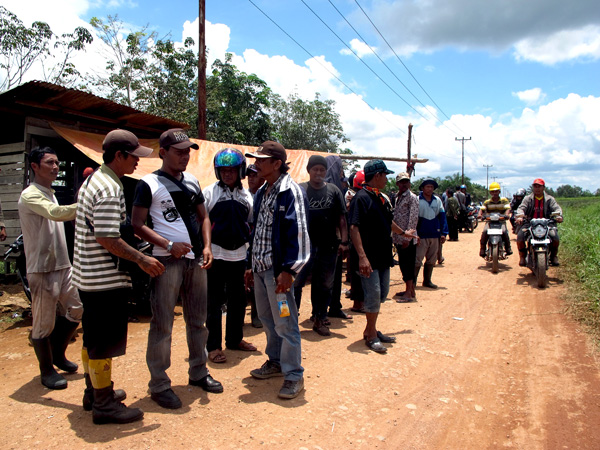 Local people and day laborers block access to a Wilmar mill in West Kalimantan on April 1. Photo: Andi Fachrizal Local people blocked the road to a Wilmar palm oil mill in Sungai Malaya, a village in Indonesia’s West Kalimantan province, demanding the release of nine day laborers who were arrested during an earlier protest […]
Local people and day laborers block access to a Wilmar mill in West Kalimantan on April 1. Photo: Andi Fachrizal Local people blocked the road to a Wilmar palm oil mill in Sungai Malaya, a village in Indonesia’s West Kalimantan province, demanding the release of nine day laborers who were arrested during an earlier protest […]
Dams or indigenous land: the battle over the Munduruku frontier
 Other Special Reporting Initiative Articles by Pública Exclusive: Funai confirms that land threatened by dam projects belongs to indigenous tribe After working in the woodland, the Munduruku warriors get together to sing traditional songs of celebration. Photo: Marcio Isensee e Sá The Munduruku indigenous tribe have begun to mark out the limits of their land, […]
Other Special Reporting Initiative Articles by Pública Exclusive: Funai confirms that land threatened by dam projects belongs to indigenous tribe After working in the woodland, the Munduruku warriors get together to sing traditional songs of celebration. Photo: Marcio Isensee e Sá The Munduruku indigenous tribe have begun to mark out the limits of their land, […]
Exclusive: Funai confirms that land threatened by dam projects belongs to indigenous tribe
 Other Special Reporting Initiatives Articles by Pública Dams or indigenous land: the battle over the Munduruku frontier The Brazilian government opposes granting traditional land to the Munduruku people since it would jeopardize seven proposed hydroelectric dams on the Tapajós River. For this reason, a year-old report by Funai that supports the Munduruku claim has not […]
Other Special Reporting Initiatives Articles by Pública Dams or indigenous land: the battle over the Munduruku frontier The Brazilian government opposes granting traditional land to the Munduruku people since it would jeopardize seven proposed hydroelectric dams on the Tapajós River. For this reason, a year-old report by Funai that supports the Munduruku claim has not […]
Endangered environmentalists: investigating government crackdowns on green groups
 Mongabay.org offers journalists opportunity to report on government muzzling of environmental activists Mongabay.org recently announced a new Special Reporting Opportunity for journalists to focus on governmental shutdown of environmental groups and NGOs. As climate change, pollution, and habitat destruction worsen across the globe, environmental groups are responding by ratcheting up the pressure on governments and […]
Mongabay.org offers journalists opportunity to report on government muzzling of environmental activists Mongabay.org recently announced a new Special Reporting Opportunity for journalists to focus on governmental shutdown of environmental groups and NGOs. As climate change, pollution, and habitat destruction worsen across the globe, environmental groups are responding by ratcheting up the pressure on governments and […]
Brazilian tribes demarcate territory in bid to block dams
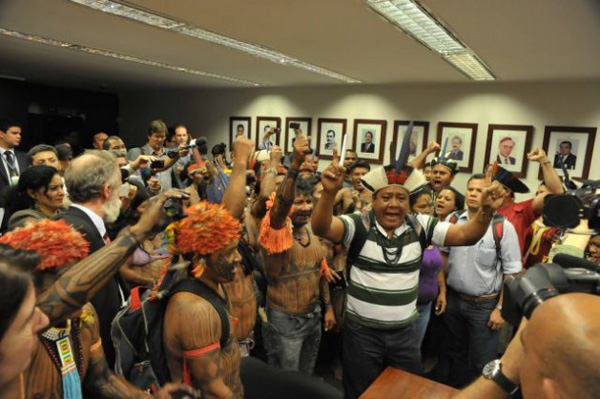 Mundurukú chiefs and warriors protest in Brazil’s lower house of Congress Tuesday Dec. 10, 2013. Photo courtesy of Luis Macedo/Acerv Indigenous communities in Brazil have taken the unusual step of demarcating their own land — without the approval of the Brazilian government — in a bid to block two dams they say threaten their territory […]
Mundurukú chiefs and warriors protest in Brazil’s lower house of Congress Tuesday Dec. 10, 2013. Photo courtesy of Luis Macedo/Acerv Indigenous communities in Brazil have taken the unusual step of demarcating their own land — without the approval of the Brazilian government — in a bid to block two dams they say threaten their territory […]
Bali uprising: Plan to convert protected area into golf courses, mall spurs outrage
 Protesters in Bali in June 2014. Photo by Anton Muhajir. In a reversal sparking outrage from locals, and concern from environmentalists, the Governor of Bali, Indonesia has given the green light to a controversial development project in Benoa Bay. The plan would convert 700 acres of theoretically protected mangrove and ocean front into a tourist […]
Protesters in Bali in June 2014. Photo by Anton Muhajir. In a reversal sparking outrage from locals, and concern from environmentalists, the Governor of Bali, Indonesia has given the green light to a controversial development project in Benoa Bay. The plan would convert 700 acres of theoretically protected mangrove and ocean front into a tourist […]
Photos: Greenpeace stages protest in rainforest destroyed for palm oil
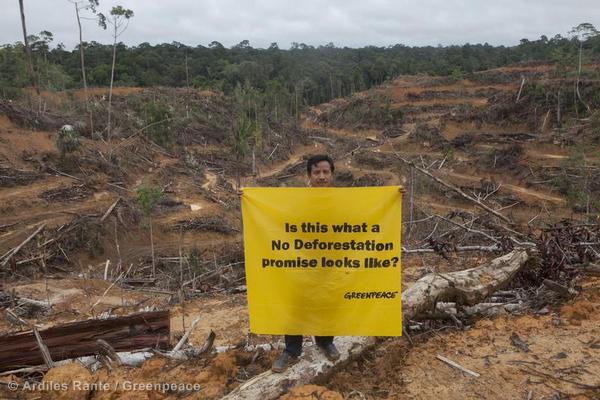 On Monday, Greenpeace activists in Indonesia staged a dramatic protest in an area of rainforest freshly cleared for a new oil palm plantation in Central Kalimantan. The demonstration came under the group’s campaign to push consumer products giant Proctor & Gamble (P&G) to strengthen its palm oil sourcing policy to include a zero deforestation commitment […]
On Monday, Greenpeace activists in Indonesia staged a dramatic protest in an area of rainforest freshly cleared for a new oil palm plantation in Central Kalimantan. The demonstration came under the group’s campaign to push consumer products giant Proctor & Gamble (P&G) to strengthen its palm oil sourcing policy to include a zero deforestation commitment […]
Snickers, Twix to be deforestation-free
 Concession owned by PT Multi Persada Gatramegah (PT MPG), a subsidiary of Musim Mas company, a palm oil supplier to Procter and Gamble in Muara Teweh, North Barito, Central Kalimantan. Mars, Inc., the maker of M&M’s, Snickers, Twix, and a variety of other food products, has committed to a zero deforestation policy for the palm […]
Concession owned by PT Multi Persada Gatramegah (PT MPG), a subsidiary of Musim Mas company, a palm oil supplier to Procter and Gamble in Muara Teweh, North Barito, Central Kalimantan. Mars, Inc., the maker of M&M’s, Snickers, Twix, and a variety of other food products, has committed to a zero deforestation policy for the palm […]
The price of gold: winners and losers in Latin America’s mining industry
 On a Friday afternoon in June, the Plaza de Armas in Cajamarca is pulsing with life. It’s winter here, and although thick white clouds hover low in the distance, the sun in this northern Peruvian city is warm. Couples sit on benches facing one another. Kids run in the grass between flowerbeds. Men in suits […]
On a Friday afternoon in June, the Plaza de Armas in Cajamarca is pulsing with life. It’s winter here, and although thick white clouds hover low in the distance, the sun in this northern Peruvian city is warm. Couples sit on benches facing one another. Kids run in the grass between flowerbeds. Men in suits […]
Greenpeace stunt targets Procter & Gamble’s Cincinnati headquarters over palm oil
 In addition to the stunt in Cincinnati, Greenpeace also released a spoof of Procter & Gamble’s recent “Thank You Mom” advertisement. Nine Greenpeace activists were arrested after they scaled Procter & Gamble’s headquarters in a demonstration against the company’s use of palm oil linked to deforestation in Indonesia. The activists scaled the Procter & Gamble […]
In addition to the stunt in Cincinnati, Greenpeace also released a spoof of Procter & Gamble’s recent “Thank You Mom” advertisement. Nine Greenpeace activists were arrested after they scaled Procter & Gamble’s headquarters in a demonstration against the company’s use of palm oil linked to deforestation in Indonesia. The activists scaled the Procter & Gamble […]
Uprising against illegal mining in Indonesia pits villagers against miners, police
 Ship carrying heavy mining equipment intercepted by hundreds of fishermen using dozens of fishing boats in the waters of Bangka Island. Photo: Save Bangka Island. Hundreds of villagers and fishermen on Bangka Island in North Sulawesi attempted to stop a ship owned by PT Mikgro Metal Perdana (MMP) from offloading heavy machinery to be used […]
Ship carrying heavy mining equipment intercepted by hundreds of fishermen using dozens of fishing boats in the waters of Bangka Island. Photo: Save Bangka Island. Hundreds of villagers and fishermen on Bangka Island in North Sulawesi attempted to stop a ship owned by PT Mikgro Metal Perdana (MMP) from offloading heavy machinery to be used […]
60,000 protest in Australia to keep carbon price
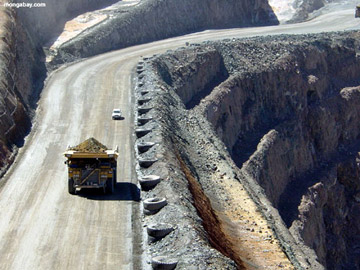 Around 60,000 Australians marched yesterday across the country calling on their government not to go backwards on climate action, according to organizers. Australia has taken a sudden U-turn on climate policy with the election of Prime Minister Tony Abbott in September, including legislation to end its carbon pricing, cutting funding to renewable energies, and obstructing […]
Around 60,000 Australians marched yesterday across the country calling on their government not to go backwards on climate action, according to organizers. Australia has taken a sudden U-turn on climate policy with the election of Prime Minister Tony Abbott in September, including legislation to end its carbon pricing, cutting funding to renewable energies, and obstructing […]
Murum dam blockaders may be suffering human rights violations warns NGOs
 A coalition of nearly 30 organizations has sent a letter to top authorities in Sarawak and Malaysia warning them of possible human right violations against a group of indigenous Penan who are blocking roads to the construction site for Murum Dam. Over 100 indigenous people have been blocking a road for over a month as […]
A coalition of nearly 30 organizations has sent a letter to top authorities in Sarawak and Malaysia warning them of possible human right violations against a group of indigenous Penan who are blocking roads to the construction site for Murum Dam. Over 100 indigenous people have been blocking a road for over a month as […]
Bangladesh plans massive coal plant in world’s biggest mangrove forest
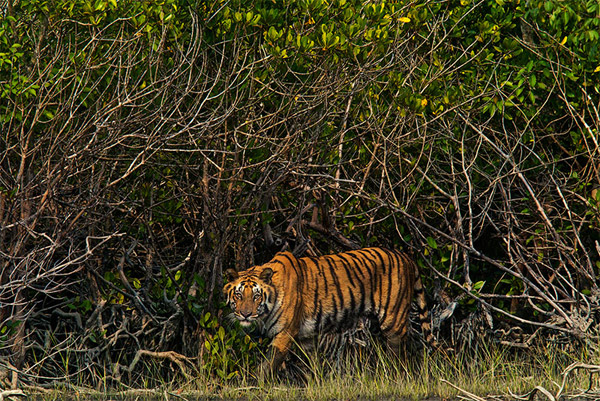 This is an expanded version of an article that ran on Yale e360 on October 29th, 2013: A Key Mangrove Forest Faces Major Threat from a Coal Plant. Bengal tiger in the Sundarbans mangrove forest. Photo by: Steve Winter/National Geographic and Panthera. On October 22nd Bangladeshi and Indian officials were supposed to hold a ceremony […]
This is an expanded version of an article that ran on Yale e360 on October 29th, 2013: A Key Mangrove Forest Faces Major Threat from a Coal Plant. Bengal tiger in the Sundarbans mangrove forest. Photo by: Steve Winter/National Geographic and Panthera. On October 22nd Bangladeshi and Indian officials were supposed to hold a ceremony […]
8 tribesmen arrested in Borneo dam protest
Malaysian authorities arrested eight indigenous protestors on Thursday in a crackdown on a long-running demonstration against a dam the tribesmen say will flood their homeland in Malaysian Borneo. According to a report from the AFP, police arrested eight Penan protesters and dismantled barriers that had been blockading a road to the Murum dam site. The […]
Indigenous groups expel workers, blockade another dam in Sarawak
 Hundreds of tribal people in Sarawak have started blockading a second big hydroelectric dam project being built by a government, which critics accuse of nepotism and corruption. Late last month around 200 native Kenyah, Kayan and Penan people chased away workers and set up a blockade on a road leading to the site of the […]
Hundreds of tribal people in Sarawak have started blockading a second big hydroelectric dam project being built by a government, which critics accuse of nepotism and corruption. Late last month around 200 native Kenyah, Kayan and Penan people chased away workers and set up a blockade on a road leading to the site of the […]
Russia charges imprisoned Greenpeace protestors with hooliganism, instead of piracy
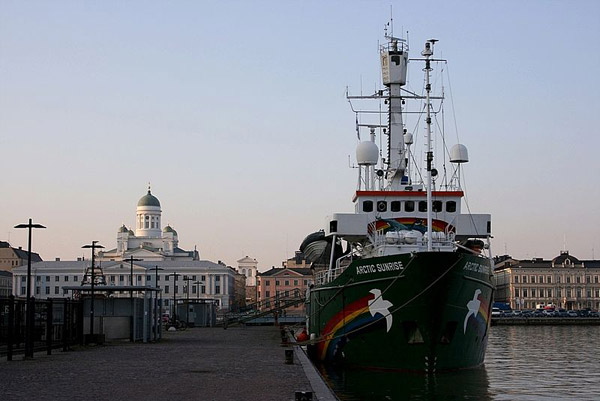 Russian investigators announced on Wednesday they are dropping piracy charges against 28 environmental activists and two freelance journalists who have spent a month in custody since they were seized aboard Greenpeace’s boat, the Arctic Sunrise. All 30 will still be charged with hooliganism as part of an organized group, which carries a potential jail sentence […]
Russian investigators announced on Wednesday they are dropping piracy charges against 28 environmental activists and two freelance journalists who have spent a month in custody since they were seized aboard Greenpeace’s boat, the Arctic Sunrise. All 30 will still be charged with hooliganism as part of an organized group, which carries a potential jail sentence […]
Russia charges non-violent activists with ‘piracy’ for protesting Arctic oil drilling
 In what is being described by Greenpeace as an ‘imaginary offense,’ Russia has charged 30 people with piracy after activists protested against oil exploitation in the Arctic. The 30 charged included not only protestors, but a British journalist and Russian videographer who were on board Greenpeace’s ship, the Arctic Sunrise, when it was stormed by […]
In what is being described by Greenpeace as an ‘imaginary offense,’ Russia has charged 30 people with piracy after activists protested against oil exploitation in the Arctic. The 30 charged included not only protestors, but a British journalist and Russian videographer who were on board Greenpeace’s ship, the Arctic Sunrise, when it was stormed by […]
Borneo tribesmen block road as controversial rainforest dam impoundment begins
 Indigenous leaders have set up roadblocks in Malaysian Borneo to protest Sarawak’s newest dam, report environmental activists who oppose the project. According to the Borneo Project and the Bruno Manser Fund, more than 100 Penan are blocking road traffic to protest for higher compensation from Sarawak Energy Berhad, the state-owned power company behind the Murum […]
Indigenous leaders have set up roadblocks in Malaysian Borneo to protest Sarawak’s newest dam, report environmental activists who oppose the project. According to the Borneo Project and the Bruno Manser Fund, more than 100 Penan are blocking road traffic to protest for higher compensation from Sarawak Energy Berhad, the state-owned power company behind the Murum […]
Attempt to export nearly-extinct pygmy sloths sets off international incident in Panama
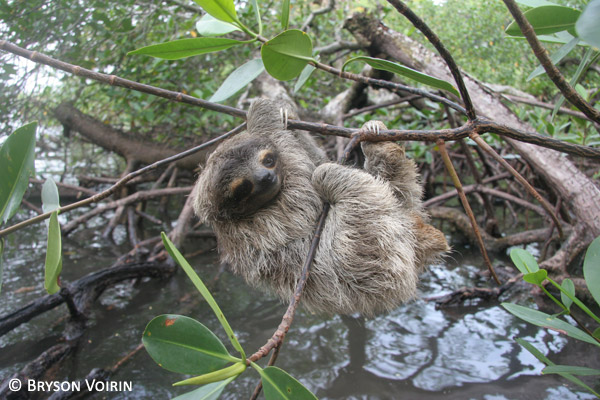 After this story was published, Dallas World Aquarium (DWA) complained that its side of the story had not been fairly represented, that elements of our reporting contained inaccuracies and made legal threats against Mongabay. As a result of the new input we have added a series of annotations, correcting several points and adding DWA’s views. […]
After this story was published, Dallas World Aquarium (DWA) complained that its side of the story had not been fairly represented, that elements of our reporting contained inaccuracies and made legal threats against Mongabay. As a result of the new input we have added a series of annotations, correcting several points and adding DWA’s views. […]
Indigenous peoples resume occupation of Brazil’s Belo Monte dam site
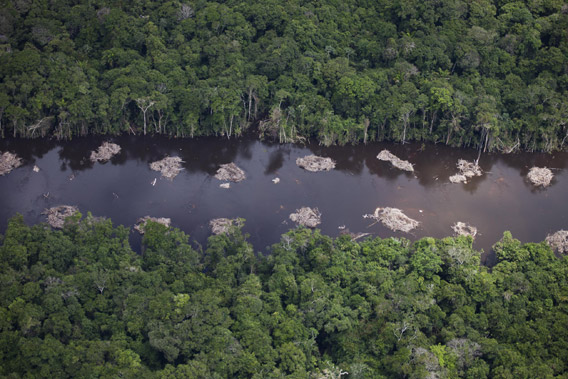 150 indigenous protesters have once again occupied the Belo Monte dam site in an effort to block the controversial project, reports Amazon Watch, an NGO that is helping lead the fight against the dam. Amazon watch says that members of the Parakanã and Juruna indigenous communities blocked a key access road, shutting down construction activities […]
150 indigenous protesters have once again occupied the Belo Monte dam site in an effort to block the controversial project, reports Amazon Watch, an NGO that is helping lead the fight against the dam. Amazon watch says that members of the Parakanã and Juruna indigenous communities blocked a key access road, shutting down construction activities […]
Colombian mining dispute highlights legislative disarray
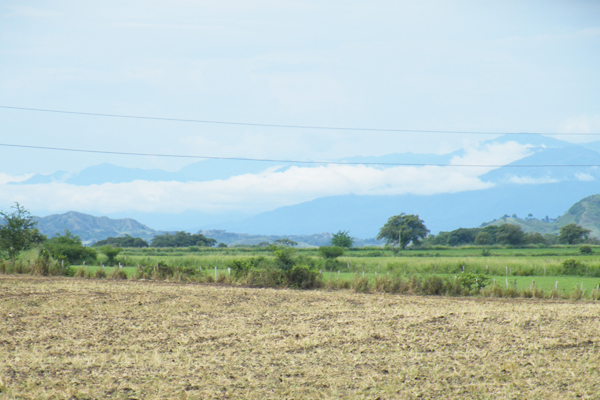 Colombia rules against multinational corporation that demanded disciplining of environment officials. Colombian authorities have ruled that local environmental officials acted correctly in ordering South African mining giant AngloGold Ashanti to halt their work, following demands from the multinational corporation for their disciplining. Cortolima, the environmental authority of the department of Tolima in central Colombia, stopped […]
Colombia rules against multinational corporation that demanded disciplining of environment officials. Colombian authorities have ruled that local environmental officials acted correctly in ordering South African mining giant AngloGold Ashanti to halt their work, following demands from the multinational corporation for their disciplining. Cortolima, the environmental authority of the department of Tolima in central Colombia, stopped […]
Indigenous groups protest hydropower congress as controversy hits meeting in Malaysia
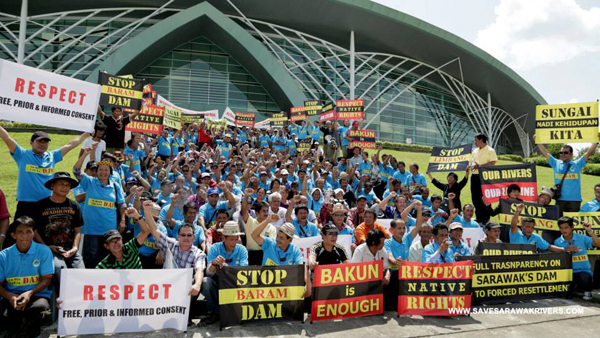 The opening of the International Hydropower Association (IHA) World Congress in the Malaysian state of Sarawak was marred today by indigenous protests and controversy after a local indigenous leader was barred from attending a pre-conference workshop. Over 300 people from local indigenous people protested the ongoing construction of around a dozen mega-dams in the state […]
The opening of the International Hydropower Association (IHA) World Congress in the Malaysian state of Sarawak was marred today by indigenous protests and controversy after a local indigenous leader was barred from attending a pre-conference workshop. Over 300 people from local indigenous people protested the ongoing construction of around a dozen mega-dams in the state […]
Tribesmen launch ‘occupy’ protest at dam site in the Amazon rainforest
 On Thursday roughly 200 indigenous people launched an occupation of a key construction site for the controversial Belo Monte dam in the Brazilian Amazon. The protestors, who represent communities that will be affected by the massive dam, are demanding immediate suspension of all work on hydroelectric projects on the Xingu, Tapajós and Teles Pires rivers […]
On Thursday roughly 200 indigenous people launched an occupation of a key construction site for the controversial Belo Monte dam in the Brazilian Amazon. The protestors, who represent communities that will be affected by the massive dam, are demanding immediate suspension of all work on hydroelectric projects on the Xingu, Tapajós and Teles Pires rivers […]
Indigenous protester killed by masked assailants in Panama over UN-condemned dam
 Barro Blanco hydroelectric dam under construction. Photo courtesy of Robin Oisín Llewellyn. A Ngäbe indigenous Panamanian, Onesimo Rodriguez, opposing the Barro Blanco hydroelectric dam project was killed last Friday evening by four masked men. His body was then thrown into a nearby stream where it was discovered the following day. Onesimo Rodriguez was attacked with […]
Barro Blanco hydroelectric dam under construction. Photo courtesy of Robin Oisín Llewellyn. A Ngäbe indigenous Panamanian, Onesimo Rodriguez, opposing the Barro Blanco hydroelectric dam project was killed last Friday evening by four masked men. His body was then thrown into a nearby stream where it was discovered the following day. Onesimo Rodriguez was attacked with […]
Over 35,000 march on Washington demanding climate action and rejection of Canada’s ‘carbon bomb’
 Forward on Climate Rally in Washington DC. Photo by: Project Survival Media. Yesterday over 35,000 people rallied in Washington D.C. for urgent action on climate change, which, according to organizers, was the largest climate march in U.S. history. Activists called on the Obama Administration to do much more to tackle climate change, including rejecting the […]
Forward on Climate Rally in Washington DC. Photo by: Project Survival Media. Yesterday over 35,000 people rallied in Washington D.C. for urgent action on climate change, which, according to organizers, was the largest climate march in U.S. history. Activists called on the Obama Administration to do much more to tackle climate change, including rejecting the […]
Troops in Madagascar free miners held hostage by local protesters
 NASA Goddard Institute for Space Studies map representing global temperature anomalies averaged from 2008 through 2012. Visualization credit: NASA Goddard’s Scientific Visualization Studio Troops in Madagascar last weekend freed nearly 200 employees of Rio Tinto who were trapped inside by a mine by local people protesting the project, reports AFP. Soldiers, police and paratroopers launched […]
NASA Goddard Institute for Space Studies map representing global temperature anomalies averaged from 2008 through 2012. Visualization credit: NASA Goddard’s Scientific Visualization Studio Troops in Madagascar last weekend freed nearly 200 employees of Rio Tinto who were trapped inside by a mine by local people protesting the project, reports AFP. Soldiers, police and paratroopers launched […]
China plans over 300 dam projects worldwide
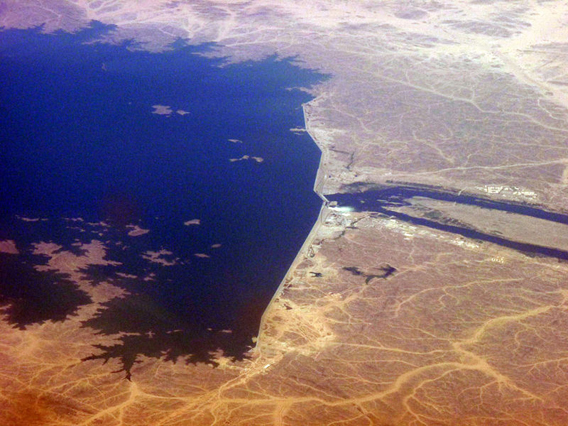 A new report by the NGO, International Rivers, takes an in-depth look at the role China is playing in building mega-dams worldwide. According to the report, Chinese companies are involved in 308 hydroelectric projects across 70 nations. While dams are often billed as “green energy,” they can have massive ecological impacts on rivers, raise local […]
A new report by the NGO, International Rivers, takes an in-depth look at the role China is playing in building mega-dams worldwide. According to the report, Chinese companies are involved in 308 hydroelectric projects across 70 nations. While dams are often billed as “green energy,” they can have massive ecological impacts on rivers, raise local […]
Photos reveal destruction of Cameroon rainforest for palm oil
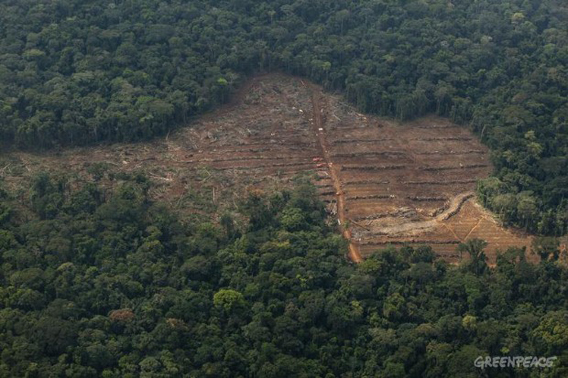 Clearing of trees in a concession area of Herakles Farm’s area for a palm oil plantation. Greenpeace says these clearings are illegal since Herakles’ lease has not been given final approval. Herakles Farm did not respond to request for comment. Photo: © Greenpeace/Alex Yallop. Newly released photos by Greenpeace show the dramatic destruction of tropical […]
Clearing of trees in a concession area of Herakles Farm’s area for a palm oil plantation. Greenpeace says these clearings are illegal since Herakles’ lease has not been given final approval. Herakles Farm did not respond to request for comment. Photo: © Greenpeace/Alex Yallop. Newly released photos by Greenpeace show the dramatic destruction of tropical […]
Climate activists march on White House again to oppose Keystone XL pipeline
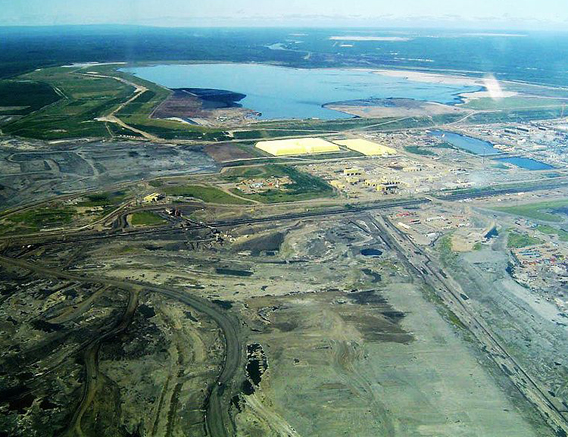 A portion of the tar sands in Alberta as viewed from the air in 2006. Some have dubbed this the ‘largest energy project in the world.’ Yesterday, climate activists marched around the White House in opposition against the Keystone XL pipeline, which if built will carry tar sands from Canada to the Gulf of Mexico […]
A portion of the tar sands in Alberta as viewed from the air in 2006. Some have dubbed this the ‘largest energy project in the world.’ Yesterday, climate activists marched around the White House in opposition against the Keystone XL pipeline, which if built will carry tar sands from Canada to the Gulf of Mexico […]
Penan suspend dam blockade, give government one month to respond to demands
 Villagers blocking the road to Murum dam September 26, 2012. Photo courtesy of Bruno Manser Fond.. Members of the Penan tribe have suspended their month long blockade of the Murum dam in the Malaysian state of Sarawak, reports Survival International. However, according to the indigenous group the fight is not over: the departing Penan said […]
Villagers blocking the road to Murum dam September 26, 2012. Photo courtesy of Bruno Manser Fond.. Members of the Penan tribe have suspended their month long blockade of the Murum dam in the Malaysian state of Sarawak, reports Survival International. However, according to the indigenous group the fight is not over: the departing Penan said […]
Day after Obama re-elected, group plans massive march over Keystone Pipeline and climate change
 Protestor against Keystone XL Pipeline escorted away after arrest in 2010. Photo by: Josh Lopez/Tar Sands Action. Hours after President Obama’s historic re-election, climate group 350.org announced a massive rally and march to apply pressure on the administration to reject the Keystone Pipeline, which would bring tar sands from Alberta down to the Gulf of […]
Protestor against Keystone XL Pipeline escorted away after arrest in 2010. Photo by: Josh Lopez/Tar Sands Action. Hours after President Obama’s historic re-election, climate group 350.org announced a massive rally and march to apply pressure on the administration to reject the Keystone Pipeline, which would bring tar sands from Alberta down to the Gulf of […]
Indigenous groups re-occupy Belo Monte dam in the Amazon
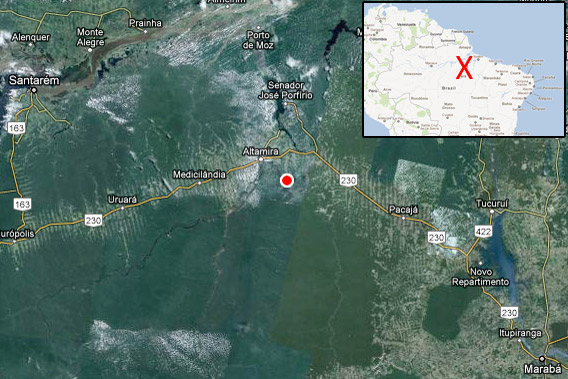 Belo Monte location. Courtesy of Google Earth. Construction on Brazil’s megadam, Belo Monte, has been halted again as around 150 demonstrators, most of them from nearby indigenous tribes, have occupied the main construction site at Pimental. Over a hundred indigenous people joined local fishermen who had been protesting the dam for 24 days straight. Indigenous […]
Belo Monte location. Courtesy of Google Earth. Construction on Brazil’s megadam, Belo Monte, has been halted again as around 150 demonstrators, most of them from nearby indigenous tribes, have occupied the main construction site at Pimental. Over a hundred indigenous people joined local fishermen who had been protesting the dam for 24 days straight. Indigenous […]
Indigenous blockade expands against massive dam in Sarawak
.568.jpg) Over 300 Penan people are living in makeshift shelters as they blockade roads to the Murum dam construction site. Photo courtesy of Sarawak Conservation Alliance for Natural Environment (SCANE). Indigenous people have expanded their blockade against the Murum dam in the Malaysian state of Sarawak, taking over an additional road to prevent construction materials from […]
Over 300 Penan people are living in makeshift shelters as they blockade roads to the Murum dam construction site. Photo courtesy of Sarawak Conservation Alliance for Natural Environment (SCANE). Indigenous people have expanded their blockade against the Murum dam in the Malaysian state of Sarawak, taking over an additional road to prevent construction materials from […]
Greenpeace abandons occupation of Arctic oil drilling rig after workers throw metal at them
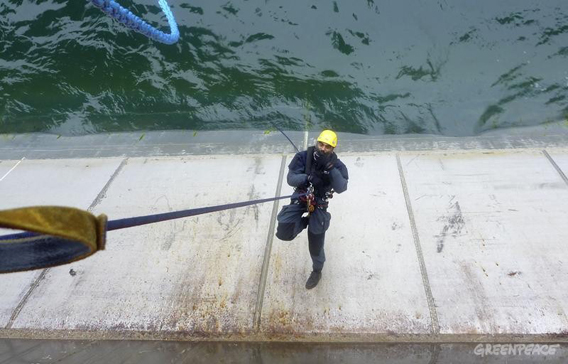 UPDATE: After failing to slow down Gazprom by occupying its oil rig, Greenpeace is trying a different tact: activists have now attached their boat to a Gazprom passenger vessel preventing workers from reaching the oil rig and forcing an ongoing delay in operations. Kumi Naidoo, head of Greenpeace, scaling a Gazprom oil platform for drilling […]
UPDATE: After failing to slow down Gazprom by occupying its oil rig, Greenpeace is trying a different tact: activists have now attached their boat to a Gazprom passenger vessel preventing workers from reaching the oil rig and forcing an ongoing delay in operations. Kumi Naidoo, head of Greenpeace, scaling a Gazprom oil platform for drilling […]
Cambodia’s largest lowland rainforest spared from new land concessions
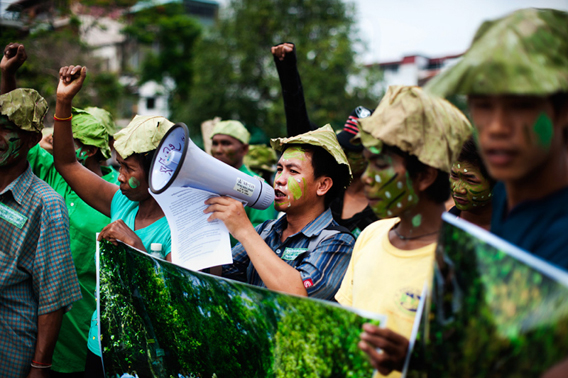 Activists dress as avatars to protest the destruction of Prey Lang forest. Photo courtesy of Prey Lang: It’s Our Forest Too. Four economic land concessions have been cancelled in Cambodia’s Prey Lang forest, known as the largest intact lowland forest in Southeast Asia, reports the Phnom Penh Post. The economic land concessions, totaling over 40,000 […]
Activists dress as avatars to protest the destruction of Prey Lang forest. Photo courtesy of Prey Lang: It’s Our Forest Too. Four economic land concessions have been cancelled in Cambodia’s Prey Lang forest, known as the largest intact lowland forest in Southeast Asia, reports the Phnom Penh Post. The economic land concessions, totaling over 40,000 […]
Peru considers big changes to its environmental reviews
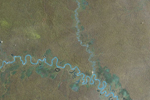 The Peruvian government is looking into making large-scale changes to its Environment Impact Assessments (EIA) after a review found significant problems with the vast majority of past reviews, reports the Inter Press Service. The news comes a few weeks after protests over a proposed gold and copper mine in the Andes left five people dead, […]
The Peruvian government is looking into making large-scale changes to its Environment Impact Assessments (EIA) after a review found significant problems with the vast majority of past reviews, reports the Inter Press Service. The news comes a few weeks after protests over a proposed gold and copper mine in the Andes left five people dead, […]
Indigenous tribes hold 3 engineers hostage over Belo Monte dam
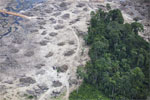 Three engineers are being held hostage by the Juruna and Arara indigenous tribes as tensions rise over the on-going construction of the Belo Monte dam in Brazil, reports the Indigenous rights NGO Amazon Watch. The company building the dam, Norte Energia, has confirmed that three of its employees were being held against their will. Tribal […]
Three engineers are being held hostage by the Juruna and Arara indigenous tribes as tensions rise over the on-going construction of the Belo Monte dam in Brazil, reports the Indigenous rights NGO Amazon Watch. The company building the dam, Norte Energia, has confirmed that three of its employees were being held against their will. Tribal […]
Saving ‘Avatar Grove’: the battle to preserve old-growth forests in British Columbia
- A picture is worth a thousand words: this common adage comes instantly to mind when viewing T.J. Watt’s unforgettable photos of lost trees.
- For years, Watt has been photographing the beauty of Vancouver Island’s ancient temperate rainforests, and documenting their loss to clearcut logging.
- The photographer and environmental activist recently helped co-found the Ancient Forest Alliance (AFA), a group devoted to saving the island’s and British Columbia’s (BC) last old-growth while working with the logging industry to adopt sustainable practices.
- This February the organization succeeded in saving Avatar Grove—which was only discovered in 2009—from being clearcut.
Indigenous tribes end occupation of Belo Monte
 Belo Monte location. Courtesy of Google Earth. After occupying the construction site of the massive Belo Monte dam for 21 days, some 300 indigenous people have left and gone home. The representatives from nine Amazonian tribes abandoned their occupation after two days of meeting with the dam’s builder, the Norte Energia consortium. Belo Monte, if […]
Belo Monte location. Courtesy of Google Earth. After occupying the construction site of the massive Belo Monte dam for 21 days, some 300 indigenous people have left and gone home. The representatives from nine Amazonian tribes abandoned their occupation after two days of meeting with the dam’s builder, the Norte Energia consortium. Belo Monte, if […]
Indigenous tribes occupy Belo Monte dam for over 10 days
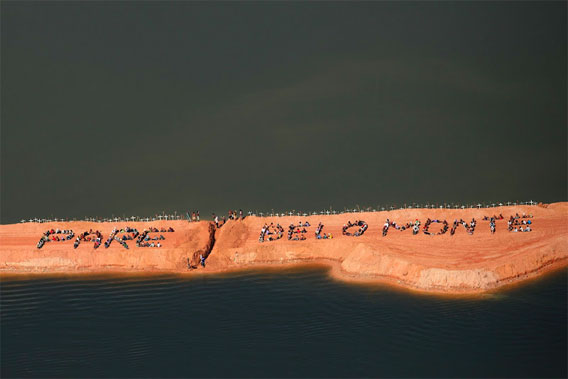 Belo Monte protest: around 300 people dug a channel though an earthen dam blocking the Xingu River last month. Photo credit: Atossa Soltani/ Amazon Watch / Spectral Q. As of Tuesday, the occupation of Belo Monte dam by indigenous tribes entered its 13th day. Indigenous people, who have fought the planned Brazilian dam for decades, […]
Belo Monte protest: around 300 people dug a channel though an earthen dam blocking the Xingu River last month. Photo credit: Atossa Soltani/ Amazon Watch / Spectral Q. As of Tuesday, the occupation of Belo Monte dam by indigenous tribes entered its 13th day. Indigenous people, who have fought the planned Brazilian dam for decades, […]
Cowards at Rio?: organizations decry ‘pathetic’ agreement
 A Malagasy girl. While Madagascar faces widespread deforestation and erosion, it is estimated that 70 percent of its people suffer from malnutrition. The Rio+20 Summit is attempting to tackle both environmental degradation and poverty, but civil groups say the agreement falls far short of what is needed. Photo by: Rhett A. Butler. As world leaders […]
A Malagasy girl. While Madagascar faces widespread deforestation and erosion, it is estimated that 70 percent of its people suffer from malnutrition. The Rio+20 Summit is attempting to tackle both environmental degradation and poverty, but civil groups say the agreement falls far short of what is needed. Photo by: Rhett A. Butler. As world leaders […]
Photo: Human canvas on Rio beach protests Brazil’s dam-building spree in the Amazon
 The image was a collaboration between aerial artist John Quigley and a committee of indigenous peoples including Aldamir Sataré-Mawé (Amapá), Sheyla Juruna (Pará), Dione Vison Terena (Mato Groso do Sul), Augusto Kaigamg (Rio Grande do Sul), and Capitao Potuguara. Image courtesy of Amazon Watch. Nearly 1500 people formed a human banner on a beach in […]
The image was a collaboration between aerial artist John Quigley and a committee of indigenous peoples including Aldamir Sataré-Mawé (Amapá), Sheyla Juruna (Pará), Dione Vison Terena (Mato Groso do Sul), Augusto Kaigamg (Rio Grande do Sul), and Capitao Potuguara. Image courtesy of Amazon Watch. Nearly 1500 people formed a human banner on a beach in […]
IKEA logging old-growth forest for low-price furniture in Russia
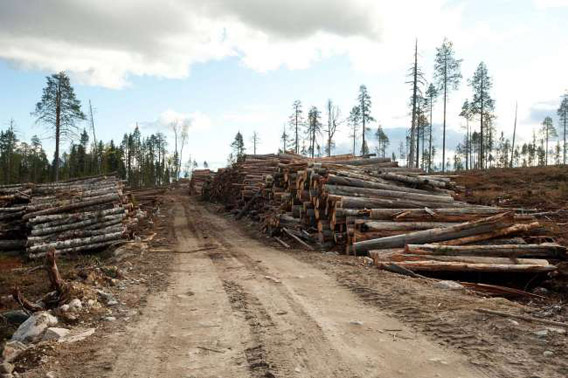 Destroyed old-growth forest with piles of timber on land leased by IKEA/Swedwood in Russian Karelia. Photo © Robert Svensson, Protect the Forest 2011. A new campaign is targeting IKEA, the world’s biggest furniture retailer, for logging old-growth forests in the Karelia region of Russia. An alliance of groups, headed by the Swedish NGO Protect the […]
Destroyed old-growth forest with piles of timber on land leased by IKEA/Swedwood in Russian Karelia. Photo © Robert Svensson, Protect the Forest 2011. A new campaign is targeting IKEA, the world’s biggest furniture retailer, for logging old-growth forests in the Karelia region of Russia. An alliance of groups, headed by the Swedish NGO Protect the […]
13 arrested for blockading coal train, including Nobel Prize winning economist
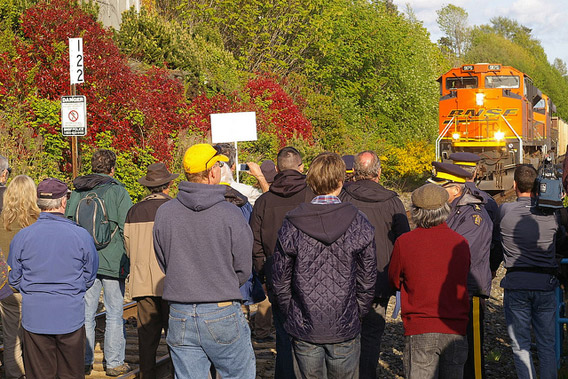 In British Colombia a group of concerned residents, along with scientists, blocked four trains of Wyoming coal bound for Asia. Thirteen were arrested. Photo courtesy of: 350.org. Thirteen Canadians were peacefully arrested this weekend for blockading Burlington Northern Santa Fe (BNSF) railway tracks in order to prevent the passage of coal from the United States […]
In British Colombia a group of concerned residents, along with scientists, blocked four trains of Wyoming coal bound for Asia. Thirteen were arrested. Photo courtesy of: 350.org. Thirteen Canadians were peacefully arrested this weekend for blockading Burlington Northern Santa Fe (BNSF) railway tracks in order to prevent the passage of coal from the United States […]
Cambodia suspends economic land concessions
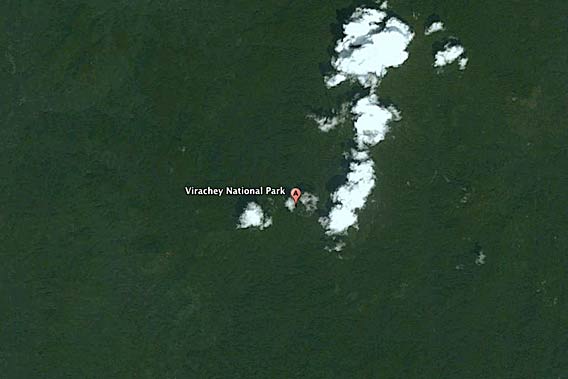 A portion of Virachey National Park as viewed by Google Earth in Cambodia. Last year Cambodian Prime Minister, Hun Sen, approved a 9,000 hectare (22,200 acre) rubber plantation inside the park as apart of the government’s economic land concessions. Cambodian Prime Minister Hun Sen announced today that Cambodia would be temporarily suspending new economic land […]
A portion of Virachey National Park as viewed by Google Earth in Cambodia. Last year Cambodian Prime Minister, Hun Sen, approved a 9,000 hectare (22,200 acre) rubber plantation inside the park as apart of the government’s economic land concessions. Cambodian Prime Minister Hun Sen announced today that Cambodia would be temporarily suspending new economic land […]
Pictures of the day: activists highlight personal impacts of climate change worldwide
 Activists hold a banner in front of a damaged coral reef in the vulnerable Marshall islands. Rising temperatures and increased CO2 uptake are raising the acidity of the ocean, which bleaches and ultimately may kill fragile coral reefs. Photo courtesy of: 350.org. On Saturday, people around the world gathered to highlight the varied impacts of […]
Activists hold a banner in front of a damaged coral reef in the vulnerable Marshall islands. Rising temperatures and increased CO2 uptake are raising the acidity of the ocean, which bleaches and ultimately may kill fragile coral reefs. Photo courtesy of: 350.org. On Saturday, people around the world gathered to highlight the varied impacts of […]
Thousands worldwide to “connect the dots” between climate change and extreme weather this weekend
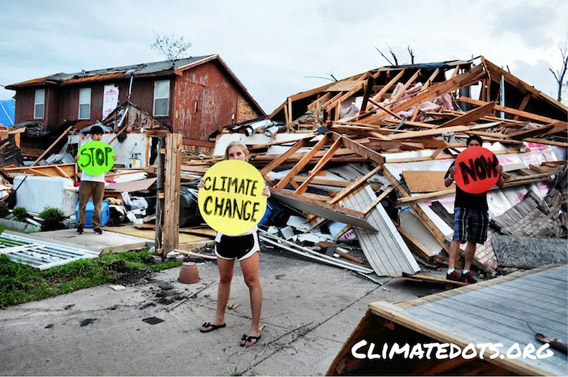 High school students in Texas connect the dots between climate change and tornados that appear earlier and earlier ever year. Scientists are just beginning to explore whether or not there is a connection between climate change and tornadoes. Photo courtesy of 350.org. On Saturday, May 5th vulnerable populations from the United States to Bangladesh will […]
High school students in Texas connect the dots between climate change and tornados that appear earlier and earlier ever year. Scientists are just beginning to explore whether or not there is a connection between climate change and tornadoes. Photo courtesy of 350.org. On Saturday, May 5th vulnerable populations from the United States to Bangladesh will […]
David vs. Goliath: Goldman Environmental Prize winners highlight development projects gone awry
 Right of left: Evgenia Chirikova, Edwin Gariguez, Ma Jun, Ikal Angelei, Caroline Cannon, and Sofia Gatica. Photo courtesy of Goldman Environmental Prize. A controversial dam, a massive mine, poisonous pesticides, a devastating road, and criminal polluters: many of this year’s Goldman Environmental Prize winners point to the dangers of poorly-planned, and ultimately destructive, development initiatives. […]
Right of left: Evgenia Chirikova, Edwin Gariguez, Ma Jun, Ikal Angelei, Caroline Cannon, and Sofia Gatica. Photo courtesy of Goldman Environmental Prize. A controversial dam, a massive mine, poisonous pesticides, a devastating road, and criminal polluters: many of this year’s Goldman Environmental Prize winners point to the dangers of poorly-planned, and ultimately destructive, development initiatives. […]
Police hired by loggers in Papua New Guinea lock locals in shipping containers
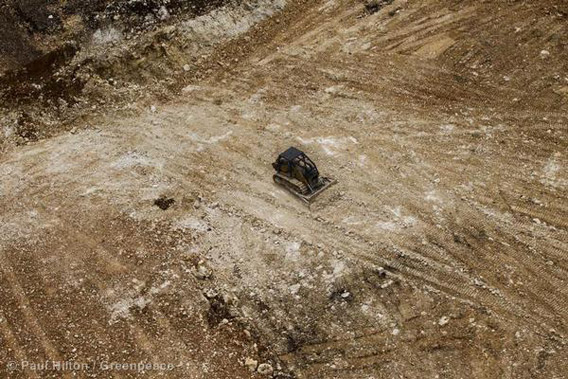 A bulldozer rumbles over a recently deforested area in Pomio District, East New Britain, Papua New Guinea. Photo by: Paul Hilton/Greenpeace. Locals protesting the destruction of their forest in Papua New Guinea for two palm oil plantations say police have been sent in for a second time to crack-down on their activities, even as a […]
A bulldozer rumbles over a recently deforested area in Pomio District, East New Britain, Papua New Guinea. Photo by: Paul Hilton/Greenpeace. Locals protesting the destruction of their forest in Papua New Guinea for two palm oil plantations say police have been sent in for a second time to crack-down on their activities, even as a […]
Rally calls on Brazil President to veto new forest code
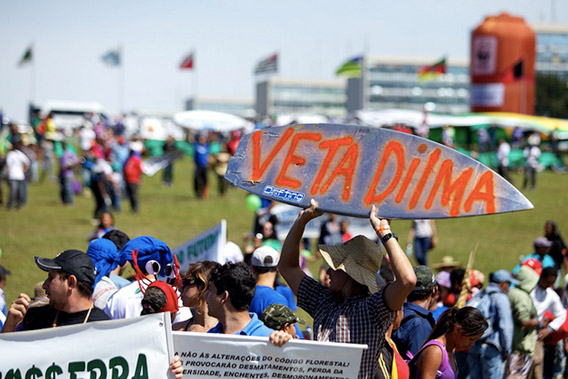 Crowd rallies for President Dilma Rousseff to veto changes to Brazil’s forest code. Photo by: WWF-Brasil. A coalition of 200 organizations, known as the Comitê Brasil in Defense of Forests and Sustainable Development, rallied today in Brasilia against proposed changes to Brazil’s Forestry Code. The code, which was supposed to be voted on this week […]
Crowd rallies for President Dilma Rousseff to veto changes to Brazil’s forest code. Photo by: WWF-Brasil. A coalition of 200 organizations, known as the Comitê Brasil in Defense of Forests and Sustainable Development, rallied today in Brasilia against proposed changes to Brazil’s Forestry Code. The code, which was supposed to be voted on this week […]
TransCanada to build southern half of Keystone to avoid State Department approval
 View Larger Map The tar sands as seen from Google Earth near Fort McMurray, Alberta. Keystone XL is becoming the project that refuses to die: TransCanada, the company behind the pipeline, has said it plans to build the southern half of the pipeline while it waits to determine a new route for the northern section. […]
View Larger Map The tar sands as seen from Google Earth near Fort McMurray, Alberta. Keystone XL is becoming the project that refuses to die: TransCanada, the company behind the pipeline, has said it plans to build the southern half of the pipeline while it waits to determine a new route for the northern section. […]
Kelly Blynn: activists not “letting the pressure off” on Keystone pipeline
 View Larger Map The tar sands as seen from Google Earth near Fort McMurray, Alberta. Along with Bill McKibben and a small cadre of passionate environmental activists, Kelly Blynn co-founded the climate activism group “350.” 350 exemplifies the power of online networks combined with activism and has coordinated some of the largest and most successful […]
View Larger Map The tar sands as seen from Google Earth near Fort McMurray, Alberta. Along with Bill McKibben and a small cadre of passionate environmental activists, Kelly Blynn co-founded the climate activism group “350.” 350 exemplifies the power of online networks combined with activism and has coordinated some of the largest and most successful […]
U.S. media favored Keystone pipeline in coverage
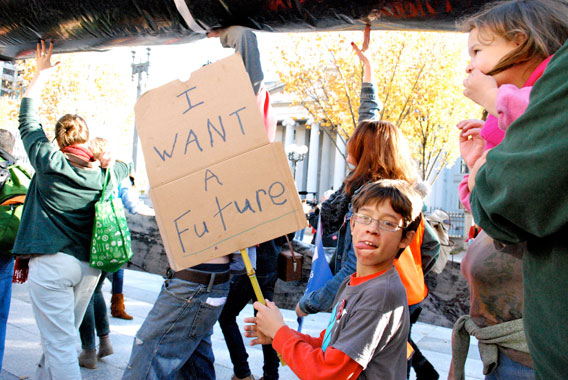 Around 12,000 protestors, including children, encircled the White House in November. A new report by Media Matters finds that the U.S. media largely ignored these protestors and their message. Photo by: Amy Dewan. A new report by Media Matters finds that U.S. TV and print media were largely biased toward the construction of TransCanada’s Keystone […]
Around 12,000 protestors, including children, encircled the White House in November. A new report by Media Matters finds that the U.S. media largely ignored these protestors and their message. Photo by: Amy Dewan. A new report by Media Matters finds that U.S. TV and print media were largely biased toward the construction of TransCanada’s Keystone […]
Featured video: music in Madagascar to protest illegal logging
A new video highlights the plight of Madagascar’s protected tropical forests, which are falling prey to illegal logging and foreign contractors. Featuring Razia Said, Malagasy singer and songwriter, the video shows concerts to raise awareness about illegal logging, especially near Maosala National Park. Said has recently founded the group Musicians Against Illegal Logging to support […]
Brazil begins preliminary damming of Xingu River as protests continue
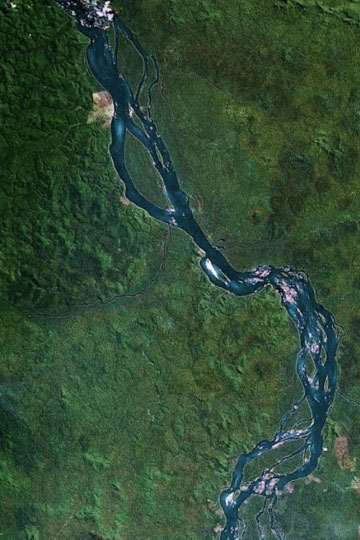 Damming of the Xingu River has begun in Brazil to make way for the eventual construction of the hugely controversial, Belo Monte dam. The Norte Energia (NESA) consortium has begun building coffer dams across the Xingu, which will dry out parts of the river before permanent damming, reports the NGO International Rivers. Indigenous tribes, who […]
Damming of the Xingu River has begun in Brazil to make way for the eventual construction of the hugely controversial, Belo Monte dam. The Norte Energia (NESA) consortium has begun building coffer dams across the Xingu, which will dry out parts of the river before permanent damming, reports the NGO International Rivers. Indigenous tribes, who […]
Obama rejects Keystone pipeline, but leaves door open for tar sands
 View Larger Map The tar sands as seen from Google Earth near Fort McMurray, Alberta. The Obama administration today announced it is scrapping TransCanada’s Keystone pipeline after Republicans forced a 60-day deadline on the issue in a Congressional rider. The State Department advised against the pipeline arguing that the deadline did not give the department […]
View Larger Map The tar sands as seen from Google Earth near Fort McMurray, Alberta. The Obama administration today announced it is scrapping TransCanada’s Keystone pipeline after Republicans forced a 60-day deadline on the issue in a Congressional rider. The State Department advised against the pipeline arguing that the deadline did not give the department […]
Extreme mouth-sewing protest in Indonesia leads to logging inquiry
 View Larger Map A protest in which 28 Indonesian sewed their mouths shut has led to an inquiry into a logging concession on Padang Island. The Ministry of Forestry has formed a mediation team to look into the controversial concession, reports Kompas. Around a hundred natives of Padang Island rallied for weeks against the logging […]
View Larger Map A protest in which 28 Indonesian sewed their mouths shut has led to an inquiry into a logging concession on Padang Island. The Ministry of Forestry has formed a mediation team to look into the controversial concession, reports Kompas. Around a hundred natives of Padang Island rallied for weeks against the logging […]
Mouths are sewn shut in protest against deforestation in Indonesia
 Controversial logging concession covers over one third of Padang Island. View Larger Map Twenty-eight Indonesians have taken the extreme measure of sewing their mouths shut in a protest turned hunger-strike against a forest concession on Padang Island, reports the Jakarta Globe. Around a hundred protesters, mostly natives of Padang Island, have camped outside the Indonesian […]
Controversial logging concession covers over one third of Padang Island. View Larger Map Twenty-eight Indonesians have taken the extreme measure of sewing their mouths shut in a protest turned hunger-strike against a forest concession on Padang Island, reports the Jakarta Globe. Around a hundred protesters, mostly natives of Padang Island, have camped outside the Indonesian […]
Small town rises up against deforestation in Pakistan
 View Larger Map The town of Ayun, home to 16,000 people in the Chitral district of Pakistan, has been rocked by large-scale protests and mass arrests over the issue of corruption and deforestation in recent days. Villagers are protesting forest destruction in the Kalasha Valleys, the home of the indigenous Kalash people. The protests first […]
View Larger Map The town of Ayun, home to 16,000 people in the Chitral district of Pakistan, has been rocked by large-scale protests and mass arrests over the issue of corruption and deforestation in recent days. Villagers are protesting forest destruction in the Kalasha Valleys, the home of the indigenous Kalash people. The protests first […]
Top 10 Environmental Stories of 2011
 Victories won by activists around the world tops our list of the big environmental stories of the year. In this photo: a young woman is placed in handcuffs and arrested for civil disobedience against the Keystone XL Pipeline in the U.S. In all, 1,252 people were arrested in the two week long action. Photo by: […]
Victories won by activists around the world tops our list of the big environmental stories of the year. In this photo: a young woman is placed in handcuffs and arrested for civil disobedience against the Keystone XL Pipeline in the U.S. In all, 1,252 people were arrested in the two week long action. Photo by: […]
Thousands protest giant gold mine in Peru’s mountains
 Fearing water contamination and pollution, over ten thousand people in Cajamarca, Peru are taking part in protests against mining plans by US-company Newmont Mining Corporation. In its sixth day, the growing protests have caused flights in and out of Cajamarca to be cancelled. According to Reuters, police also clashed with protestors today, injuring two dozen. […]
Fearing water contamination and pollution, over ten thousand people in Cajamarca, Peru are taking part in protests against mining plans by US-company Newmont Mining Corporation. In its sixth day, the growing protests have caused flights in and out of Cajamarca to be cancelled. According to Reuters, police also clashed with protestors today, injuring two dozen. […]
Brazilian dam-builder quits Peru project after indigenous protest
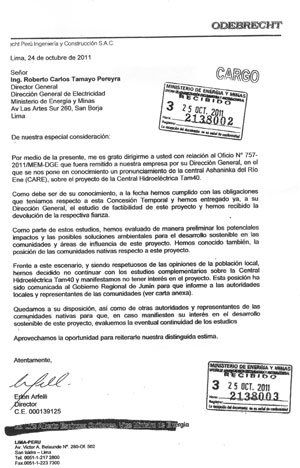 A large Brazilian construction company has pulled out of a Peruvian dam project citing opposition from indigenous communities, reports International Rivers. In a letter addressed to the Peruvian Ministry of Energy and Mines, Odebrecht said it was withdrawing from the 1278-megawatt Tambo-40 Dam on the Tambo River in the Peruvian Amazon. The company said it […]
A large Brazilian construction company has pulled out of a Peruvian dam project citing opposition from indigenous communities, reports International Rivers. In a letter addressed to the Peruvian Ministry of Energy and Mines, Odebrecht said it was withdrawing from the 1278-megawatt Tambo-40 Dam on the Tambo River in the Peruvian Amazon. The company said it […]
Obama Administration bows to pressure, delays tar sands pipeline
 View Larger Map The tar sands as seen from Google Earth near Fort McMurray, Alberta. In what can only be described as a major victory for green activists, the Obama Administration has announced it will delay a decision on TransCanada’s controversial Keystone XL pipeline for 12-18 months. Notably, putting the decision off until after the […]
View Larger Map The tar sands as seen from Google Earth near Fort McMurray, Alberta. In what can only be described as a major victory for green activists, the Obama Administration has announced it will delay a decision on TransCanada’s controversial Keystone XL pipeline for 12-18 months. Notably, putting the decision off until after the […]
12,000 surround White House to protest tar sands pipeline
 Around 12,000 protestors surrounded the White House, some carrying a symbolic pipeline. Photo by: Clayton Conn. One year to the day before the 2012 US election, up to 12,000 activists encircled the White House to protest the Keystone XL pipeline, a proposed 1,700 mile pipeline that would carry oil from Canada’s infamous tar sands to […]
Around 12,000 protestors surrounded the White House, some carrying a symbolic pipeline. Photo by: Clayton Conn. One year to the day before the 2012 US election, up to 12,000 activists encircled the White House to protest the Keystone XL pipeline, a proposed 1,700 mile pipeline that would carry oil from Canada’s infamous tar sands to […]
Bolivian road project through Amazon reserve canceled
Following a violent crackdown on protestors which deeply embarrassed the Bolivian government, president Evo Morales has thrown-out plans to build a road through an indigenous reserve, reports the BBC. Protestors marched 310 miles (498 kilometers) from the Amazon to La Paz to show their opposition to the road, saying that the project would destroy vast […]
Tar sands pipeline ‘another dirty needle feeding America’s fossil fuel addiction’
 Protestor against Keystone XL Pipeline escorted away after arrest. Photo by: Josh Lopez/Tar Sands Action. Climate and environmental activism in the US received a shot of enthusiasm this summer when it focused unwaveringly on the Keystone XL Pipeline. During a two week protest in front of the White House, 1,253 activists—from young students to elder […]
Protestor against Keystone XL Pipeline escorted away after arrest. Photo by: Josh Lopez/Tar Sands Action. Climate and environmental activism in the US received a shot of enthusiasm this summer when it focused unwaveringly on the Keystone XL Pipeline. During a two week protest in front of the White House, 1,253 activists—from young students to elder […]
Keystone pipeline company hand-picked US government’s environmental assessor
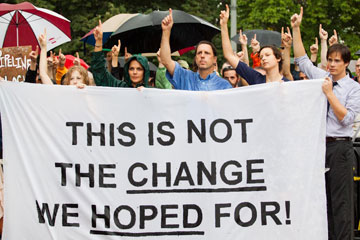 A little over a month after 1,252 people were arrested in two weeks of civil action against the Keystone XL Pipeline, The New York Times has revealed that the Obama administration allowed a consulting firm with financial ties to the pipeline to conduct the project’s Environmental Impact Assessment (EIA). While it is not uncommon for […]
A little over a month after 1,252 people were arrested in two weeks of civil action against the Keystone XL Pipeline, The New York Times has revealed that the Obama administration allowed a consulting firm with financial ties to the pipeline to conduct the project’s Environmental Impact Assessment (EIA). While it is not uncommon for […]
Tea Party rallies in favor of Gibson Guitar, ignores reasons instrument-maker is under investigation
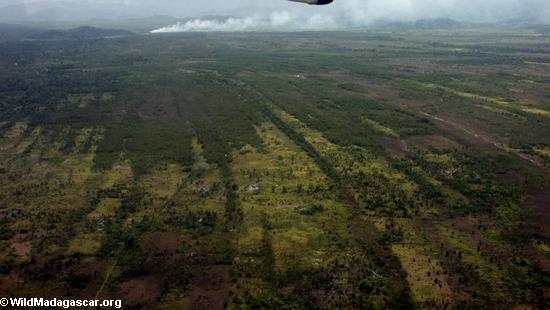 Deforested area in Madagascar in the western watershed of the Bay of Antongil. Photo by: Rhett A. Butler. This weekend around 500 people showed up for a rally and concert in Nashville, Tennessee. The rally was in support of Gibson Guitars, a US-company currently under investigation for allegedly importing illegally logged wood into the country, […]
Deforested area in Madagascar in the western watershed of the Bay of Antongil. Photo by: Rhett A. Butler. This weekend around 500 people showed up for a rally and concert in Nashville, Tennessee. The rally was in support of Gibson Guitars, a US-company currently under investigation for allegedly importing illegally logged wood into the country, […]
Public opposition pushes Myanmar to suspend giant Chinese dam
 Large-scale opposition has pushed the Myanmar government to suspend construction of a massive Chinese dam. Being built on the confluence of the Mayhka amd Malihka rivers at the head of Irrawaddy River, the Myitsone Dam would have created a reservoir the size of Singapore and has already pushed 12,000 people off their land. China Power […]
Large-scale opposition has pushed the Myanmar government to suspend construction of a massive Chinese dam. Being built on the confluence of the Mayhka amd Malihka rivers at the head of Irrawaddy River, the Myitsone Dam would have created a reservoir the size of Singapore and has already pushed 12,000 people off their land. China Power […]
Over 100 arrested as tar sands civil disobedience spreads to Canada
 After two weeks of sustained protesting at the US White House against the Keystone XL pipeline, with 1,252 people arrested, civil disobedience has now spread to Canada, home of the tar sands. Yesterday, around 500 people protested in Ottawa against Canada’s controversial tar sands; 117 were arrested as they purposefully crossed a barrier separating them […]
After two weeks of sustained protesting at the US White House against the Keystone XL pipeline, with 1,252 people arrested, civil disobedience has now spread to Canada, home of the tar sands. Yesterday, around 500 people protested in Ottawa against Canada’s controversial tar sands; 117 were arrested as they purposefully crossed a barrier separating them […]
Following violent crackdown against protestors, Bolivia puts Amazon road project on ice
After a police crackdown against indigenous activists, Bolivian President Evo Morales has suspended a large highway project through the Amazon rainforest. The police reaction—which included tear gas, rounding up protestors en masse, and allegations of violence—resulted in several officials stepping down in protest of the government’s handling. Some indigenous people marched 310 miles (498 kilometers) […]
Activists worldwide push for leaving the fossil fuel age behind
 Young people rally in Kiev, Ukraine at apart of the Moving Planet campaign. Photo by: Maxm Gorpenyuk. On six continents, in over 75 percent of the world’s countries, people came out en masse yesterday to attend over 2,000 events to demonstrate the power of renewable energy to combat global climate change. As apart of the […]
Young people rally in Kiev, Ukraine at apart of the Moving Planet campaign. Photo by: Maxm Gorpenyuk. On six continents, in over 75 percent of the world’s countries, people came out en masse yesterday to attend over 2,000 events to demonstrate the power of renewable energy to combat global climate change. As apart of the […]
Climate test for Obama: 1,252 people arrested over notorious oil pipeline
 James Hansen (on the left) with religious leaders at Keystone XL civil disobedience. Photo by: Josh Lopez/Tar Sands Action. Two weeks of climate disobedience at the White House ended over the weekend with 1,252 people arrested in total. Activists were protesting the controversial Keystone XL pipeline in an effort to pressure US President Barack Obama […]
James Hansen (on the left) with religious leaders at Keystone XL civil disobedience. Photo by: Josh Lopez/Tar Sands Action. Two weeks of climate disobedience at the White House ended over the weekend with 1,252 people arrested in total. Activists were protesting the controversial Keystone XL pipeline in an effort to pressure US President Barack Obama […]
Featured video: debating the tar sands pipeline as arrests mount
As arrests during a two week long civil action against the Keystone Pipeline XL in Washington DC rose to nearly 600 people, Bill McKibben, head of 350.org, and Robert Bryce, Manhattan Institute for Policy Research, debated the issue on PBS. While activists oppose the massive pipeline (from Canada to Texas) for a variety of reasons, […]
Over 100 protestors arrested as civil action begins against tar sands pipeline to US
In the first two days of a planned two week sit-in at the White House in Washington DC, over 100 activists against the Keystone XL pipeline have been arrested, reports Reuters. If approved by the Obama Administration, the 1,700 mile pipeline would bring around 700,000 barrels of oil daily from Canada’s notorious tar sands to […]
Indigenous protestors embark on 300-mile walk to protest Amazon road in Bolivia
 Indigenous protesters are targeting a new road in the Bolivian Amazon, reports the BBC. The 190-mile highway under construction in the Bolivian Amazon will pass through the Isiboro-Secure Indigenous Territory and National Park (Tipnis), a 4,600-square mile (11,900 square kilometers) preserve which boasts exceptional levels of rainforest biodiversity, including endangered blue macaws and fresh-water dolphins. […]
Indigenous protesters are targeting a new road in the Bolivian Amazon, reports the BBC. The 190-mile highway under construction in the Bolivian Amazon will pass through the Isiboro-Secure Indigenous Territory and National Park (Tipnis), a 4,600-square mile (11,900 square kilometers) preserve which boasts exceptional levels of rainforest biodiversity, including endangered blue macaws and fresh-water dolphins. […]
Arctic on the line: oil industry versus Greenpeace at the top of the world
 Not long ago such an image would have been impossible, but here polar bears meet a US attack submarine. US Navy Photo by: Chief Yeoman Alphonso Braggs, US-Navy. At the top of the world sits a lone region of shifting sea ice, bare islands, and strange creatures. For most of human history the Arctic remained […]
Not long ago such an image would have been impossible, but here polar bears meet a US attack submarine. US Navy Photo by: Chief Yeoman Alphonso Braggs, US-Navy. At the top of the world sits a lone region of shifting sea ice, bare islands, and strange creatures. For most of human history the Arctic remained […]
Photos: Cambodians rally as ‘Avatars’ to save one of the region’s last great rainforests
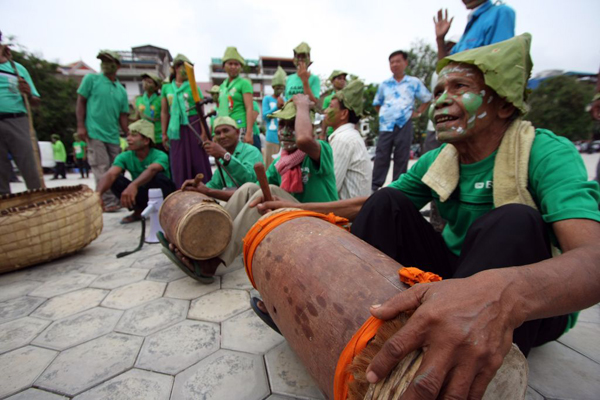 Cambodian villagers dressed as ‘avatars’ to protest the destruction of their forest. Photo courtesy of: Prey Lang Network. Two hundred Cambodians rallied in Phnom Penh last week to protest the widespread destruction of one of Southeast Asia’s last intact lowland rainforests, known as Prey Lang. In an effort to gain wider media attention, protestors donned […]
Cambodian villagers dressed as ‘avatars’ to protest the destruction of their forest. Photo courtesy of: Prey Lang Network. Two hundred Cambodians rallied in Phnom Penh last week to protest the widespread destruction of one of Southeast Asia’s last intact lowland rainforests, known as Prey Lang. In an effort to gain wider media attention, protestors donned […]
Violent protests follow approval of massive dam project in Patagonia
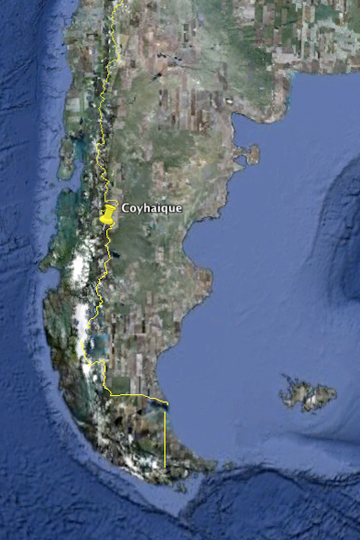 The wild rivers of Patagonia may soon never be the same. Last week, Chile’s Aysén Environmental Review Commission approved the environmental assessment of a five dam proposal on two rivers. The approval, however, is marred in controversy and has set off protests in many cities, including Santiago. Critics say the series of dams will destroy […]
The wild rivers of Patagonia may soon never be the same. Last week, Chile’s Aysén Environmental Review Commission approved the environmental assessment of a five dam proposal on two rivers. The approval, however, is marred in controversy and has set off protests in many cities, including Santiago. Critics say the series of dams will destroy […]
Feeds: news | india | latam | brasil | indonesia
 Berta Cáceres, a high-profile environmental activist in Honduras, was assassinated in 2016. While seven men were convicted for her murder less than a month ago, her death is a reminder of the dire conditions that front-line environmental defenders still face around the world. Throughout 2018, environmental defenders in the tropics continued to endure harassment and […]
Berta Cáceres, a high-profile environmental activist in Honduras, was assassinated in 2016. While seven men were convicted for her murder less than a month ago, her death is a reminder of the dire conditions that front-line environmental defenders still face around the world. Throughout 2018, environmental defenders in the tropics continued to endure harassment and […] They came at dawn. Police officers in riot gear wielding assault rifles and flanked by attack dogs took aim at protesters in the camp. Their targets, the police had been told, were dangerous and possibly armed. The protesters were there to stop an American company exploring for fracking opportunities near the Elsipogtog First Nation in […]
They came at dawn. Police officers in riot gear wielding assault rifles and flanked by attack dogs took aim at protesters in the camp. Their targets, the police had been told, were dangerous and possibly armed. The protesters were there to stop an American company exploring for fracking opportunities near the Elsipogtog First Nation in […] Other Special Reporting Initiatives Articles by Sandra Cuffe Nickel Mine, Lead Bullets: Maya Q’eqchi’ seek justice in Guatemala and Canada The Guatemalan cabinet ministers for the environment, the interior, and energy and mines stepped down May 21 amid corruption scandals and massive protests. Investigations into alleged irregularities in mining, energy, and other environmental project […]
Other Special Reporting Initiatives Articles by Sandra Cuffe Nickel Mine, Lead Bullets: Maya Q’eqchi’ seek justice in Guatemala and Canada The Guatemalan cabinet ministers for the environment, the interior, and energy and mines stepped down May 21 amid corruption scandals and massive protests. Investigations into alleged irregularities in mining, energy, and other environmental project […] Local people and day laborers block access to a Wilmar mill in West Kalimantan on April 1. Photo: Andi Fachrizal Local people blocked the road to a Wilmar palm oil mill in Sungai Malaya, a village in Indonesia’s West Kalimantan province, demanding the release of nine day laborers who were arrested during an earlier protest […]
Local people and day laborers block access to a Wilmar mill in West Kalimantan on April 1. Photo: Andi Fachrizal Local people blocked the road to a Wilmar palm oil mill in Sungai Malaya, a village in Indonesia’s West Kalimantan province, demanding the release of nine day laborers who were arrested during an earlier protest […] Other Special Reporting Initiative Articles by Pública Exclusive: Funai confirms that land threatened by dam projects belongs to indigenous tribe After working in the woodland, the Munduruku warriors get together to sing traditional songs of celebration. Photo: Marcio Isensee e Sá The Munduruku indigenous tribe have begun to mark out the limits of their land, […]
Other Special Reporting Initiative Articles by Pública Exclusive: Funai confirms that land threatened by dam projects belongs to indigenous tribe After working in the woodland, the Munduruku warriors get together to sing traditional songs of celebration. Photo: Marcio Isensee e Sá The Munduruku indigenous tribe have begun to mark out the limits of their land, […] Other Special Reporting Initiatives Articles by Pública Dams or indigenous land: the battle over the Munduruku frontier The Brazilian government opposes granting traditional land to the Munduruku people since it would jeopardize seven proposed hydroelectric dams on the Tapajós River. For this reason, a year-old report by Funai that supports the Munduruku claim has not […]
Other Special Reporting Initiatives Articles by Pública Dams or indigenous land: the battle over the Munduruku frontier The Brazilian government opposes granting traditional land to the Munduruku people since it would jeopardize seven proposed hydroelectric dams on the Tapajós River. For this reason, a year-old report by Funai that supports the Munduruku claim has not […] Mongabay.org offers journalists opportunity to report on government muzzling of environmental activists Mongabay.org recently announced a new Special Reporting Opportunity for journalists to focus on governmental shutdown of environmental groups and NGOs. As climate change, pollution, and habitat destruction worsen across the globe, environmental groups are responding by ratcheting up the pressure on governments and […]
Mongabay.org offers journalists opportunity to report on government muzzling of environmental activists Mongabay.org recently announced a new Special Reporting Opportunity for journalists to focus on governmental shutdown of environmental groups and NGOs. As climate change, pollution, and habitat destruction worsen across the globe, environmental groups are responding by ratcheting up the pressure on governments and […] Mundurukú chiefs and warriors protest in Brazil’s lower house of Congress Tuesday Dec. 10, 2013. Photo courtesy of Luis Macedo/Acerv Indigenous communities in Brazil have taken the unusual step of demarcating their own land — without the approval of the Brazilian government — in a bid to block two dams they say threaten their territory […]
Mundurukú chiefs and warriors protest in Brazil’s lower house of Congress Tuesday Dec. 10, 2013. Photo courtesy of Luis Macedo/Acerv Indigenous communities in Brazil have taken the unusual step of demarcating their own land — without the approval of the Brazilian government — in a bid to block two dams they say threaten their territory […] Protesters in Bali in June 2014. Photo by Anton Muhajir. In a reversal sparking outrage from locals, and concern from environmentalists, the Governor of Bali, Indonesia has given the green light to a controversial development project in Benoa Bay. The plan would convert 700 acres of theoretically protected mangrove and ocean front into a tourist […]
Protesters in Bali in June 2014. Photo by Anton Muhajir. In a reversal sparking outrage from locals, and concern from environmentalists, the Governor of Bali, Indonesia has given the green light to a controversial development project in Benoa Bay. The plan would convert 700 acres of theoretically protected mangrove and ocean front into a tourist […] On Monday, Greenpeace activists in Indonesia staged a dramatic protest in an area of rainforest freshly cleared for a new oil palm plantation in Central Kalimantan. The demonstration came under the group’s campaign to push consumer products giant Proctor & Gamble (P&G) to strengthen its palm oil sourcing policy to include a zero deforestation commitment […]
On Monday, Greenpeace activists in Indonesia staged a dramatic protest in an area of rainforest freshly cleared for a new oil palm plantation in Central Kalimantan. The demonstration came under the group’s campaign to push consumer products giant Proctor & Gamble (P&G) to strengthen its palm oil sourcing policy to include a zero deforestation commitment […] Concession owned by PT Multi Persada Gatramegah (PT MPG), a subsidiary of Musim Mas company, a palm oil supplier to Procter and Gamble in Muara Teweh, North Barito, Central Kalimantan. Mars, Inc., the maker of M&M’s, Snickers, Twix, and a variety of other food products, has committed to a zero deforestation policy for the palm […]
Concession owned by PT Multi Persada Gatramegah (PT MPG), a subsidiary of Musim Mas company, a palm oil supplier to Procter and Gamble in Muara Teweh, North Barito, Central Kalimantan. Mars, Inc., the maker of M&M’s, Snickers, Twix, and a variety of other food products, has committed to a zero deforestation policy for the palm […] On a Friday afternoon in June, the Plaza de Armas in Cajamarca is pulsing with life. It’s winter here, and although thick white clouds hover low in the distance, the sun in this northern Peruvian city is warm. Couples sit on benches facing one another. Kids run in the grass between flowerbeds. Men in suits […]
On a Friday afternoon in June, the Plaza de Armas in Cajamarca is pulsing with life. It’s winter here, and although thick white clouds hover low in the distance, the sun in this northern Peruvian city is warm. Couples sit on benches facing one another. Kids run in the grass between flowerbeds. Men in suits […] In addition to the stunt in Cincinnati, Greenpeace also released a spoof of Procter & Gamble’s recent “Thank You Mom” advertisement. Nine Greenpeace activists were arrested after they scaled Procter & Gamble’s headquarters in a demonstration against the company’s use of palm oil linked to deforestation in Indonesia. The activists scaled the Procter & Gamble […]
In addition to the stunt in Cincinnati, Greenpeace also released a spoof of Procter & Gamble’s recent “Thank You Mom” advertisement. Nine Greenpeace activists were arrested after they scaled Procter & Gamble’s headquarters in a demonstration against the company’s use of palm oil linked to deforestation in Indonesia. The activists scaled the Procter & Gamble […] Ship carrying heavy mining equipment intercepted by hundreds of fishermen using dozens of fishing boats in the waters of Bangka Island. Photo: Save Bangka Island. Hundreds of villagers and fishermen on Bangka Island in North Sulawesi attempted to stop a ship owned by PT Mikgro Metal Perdana (MMP) from offloading heavy machinery to be used […]
Ship carrying heavy mining equipment intercepted by hundreds of fishermen using dozens of fishing boats in the waters of Bangka Island. Photo: Save Bangka Island. Hundreds of villagers and fishermen on Bangka Island in North Sulawesi attempted to stop a ship owned by PT Mikgro Metal Perdana (MMP) from offloading heavy machinery to be used […] Around 60,000 Australians marched yesterday across the country calling on their government not to go backwards on climate action, according to organizers. Australia has taken a sudden U-turn on climate policy with the election of Prime Minister Tony Abbott in September, including legislation to end its carbon pricing, cutting funding to renewable energies, and obstructing […]
Around 60,000 Australians marched yesterday across the country calling on their government not to go backwards on climate action, according to organizers. Australia has taken a sudden U-turn on climate policy with the election of Prime Minister Tony Abbott in September, including legislation to end its carbon pricing, cutting funding to renewable energies, and obstructing […] A coalition of nearly 30 organizations has sent a letter to top authorities in Sarawak and Malaysia warning them of possible human right violations against a group of indigenous Penan who are blocking roads to the construction site for Murum Dam. Over 100 indigenous people have been blocking a road for over a month as […]
A coalition of nearly 30 organizations has sent a letter to top authorities in Sarawak and Malaysia warning them of possible human right violations against a group of indigenous Penan who are blocking roads to the construction site for Murum Dam. Over 100 indigenous people have been blocking a road for over a month as […] This is an expanded version of an article that ran on Yale e360 on October 29th, 2013: A Key Mangrove Forest Faces Major Threat from a Coal Plant. Bengal tiger in the Sundarbans mangrove forest. Photo by: Steve Winter/National Geographic and Panthera. On October 22nd Bangladeshi and Indian officials were supposed to hold a ceremony […]
This is an expanded version of an article that ran on Yale e360 on October 29th, 2013: A Key Mangrove Forest Faces Major Threat from a Coal Plant. Bengal tiger in the Sundarbans mangrove forest. Photo by: Steve Winter/National Geographic and Panthera. On October 22nd Bangladeshi and Indian officials were supposed to hold a ceremony […] Hundreds of tribal people in Sarawak have started blockading a second big hydroelectric dam project being built by a government, which critics accuse of nepotism and corruption. Late last month around 200 native Kenyah, Kayan and Penan people chased away workers and set up a blockade on a road leading to the site of the […]
Hundreds of tribal people in Sarawak have started blockading a second big hydroelectric dam project being built by a government, which critics accuse of nepotism and corruption. Late last month around 200 native Kenyah, Kayan and Penan people chased away workers and set up a blockade on a road leading to the site of the […] Russian investigators announced on Wednesday they are dropping piracy charges against 28 environmental activists and two freelance journalists who have spent a month in custody since they were seized aboard Greenpeace’s boat, the Arctic Sunrise. All 30 will still be charged with hooliganism as part of an organized group, which carries a potential jail sentence […]
Russian investigators announced on Wednesday they are dropping piracy charges against 28 environmental activists and two freelance journalists who have spent a month in custody since they were seized aboard Greenpeace’s boat, the Arctic Sunrise. All 30 will still be charged with hooliganism as part of an organized group, which carries a potential jail sentence […] In what is being described by Greenpeace as an ‘imaginary offense,’ Russia has charged 30 people with piracy after activists protested against oil exploitation in the Arctic. The 30 charged included not only protestors, but a British journalist and Russian videographer who were on board Greenpeace’s ship, the Arctic Sunrise, when it was stormed by […]
In what is being described by Greenpeace as an ‘imaginary offense,’ Russia has charged 30 people with piracy after activists protested against oil exploitation in the Arctic. The 30 charged included not only protestors, but a British journalist and Russian videographer who were on board Greenpeace’s ship, the Arctic Sunrise, when it was stormed by […] Indigenous leaders have set up roadblocks in Malaysian Borneo to protest Sarawak’s newest dam, report environmental activists who oppose the project. According to the Borneo Project and the Bruno Manser Fund, more than 100 Penan are blocking road traffic to protest for higher compensation from Sarawak Energy Berhad, the state-owned power company behind the Murum […]
Indigenous leaders have set up roadblocks in Malaysian Borneo to protest Sarawak’s newest dam, report environmental activists who oppose the project. According to the Borneo Project and the Bruno Manser Fund, more than 100 Penan are blocking road traffic to protest for higher compensation from Sarawak Energy Berhad, the state-owned power company behind the Murum […] After this story was published, Dallas World Aquarium (DWA) complained that its side of the story had not been fairly represented, that elements of our reporting contained inaccuracies and made legal threats against Mongabay. As a result of the new input we have added a series of annotations, correcting several points and adding DWA’s views. […]
After this story was published, Dallas World Aquarium (DWA) complained that its side of the story had not been fairly represented, that elements of our reporting contained inaccuracies and made legal threats against Mongabay. As a result of the new input we have added a series of annotations, correcting several points and adding DWA’s views. […] 150 indigenous protesters have once again occupied the Belo Monte dam site in an effort to block the controversial project, reports Amazon Watch, an NGO that is helping lead the fight against the dam. Amazon watch says that members of the Parakanã and Juruna indigenous communities blocked a key access road, shutting down construction activities […]
150 indigenous protesters have once again occupied the Belo Monte dam site in an effort to block the controversial project, reports Amazon Watch, an NGO that is helping lead the fight against the dam. Amazon watch says that members of the Parakanã and Juruna indigenous communities blocked a key access road, shutting down construction activities […] Colombia rules against multinational corporation that demanded disciplining of environment officials. Colombian authorities have ruled that local environmental officials acted correctly in ordering South African mining giant AngloGold Ashanti to halt their work, following demands from the multinational corporation for their disciplining. Cortolima, the environmental authority of the department of Tolima in central Colombia, stopped […]
Colombia rules against multinational corporation that demanded disciplining of environment officials. Colombian authorities have ruled that local environmental officials acted correctly in ordering South African mining giant AngloGold Ashanti to halt their work, following demands from the multinational corporation for their disciplining. Cortolima, the environmental authority of the department of Tolima in central Colombia, stopped […] The opening of the International Hydropower Association (IHA) World Congress in the Malaysian state of Sarawak was marred today by indigenous protests and controversy after a local indigenous leader was barred from attending a pre-conference workshop. Over 300 people from local indigenous people protested the ongoing construction of around a dozen mega-dams in the state […]
The opening of the International Hydropower Association (IHA) World Congress in the Malaysian state of Sarawak was marred today by indigenous protests and controversy after a local indigenous leader was barred from attending a pre-conference workshop. Over 300 people from local indigenous people protested the ongoing construction of around a dozen mega-dams in the state […] On Thursday roughly 200 indigenous people launched an occupation of a key construction site for the controversial Belo Monte dam in the Brazilian Amazon. The protestors, who represent communities that will be affected by the massive dam, are demanding immediate suspension of all work on hydroelectric projects on the Xingu, Tapajós and Teles Pires rivers […]
On Thursday roughly 200 indigenous people launched an occupation of a key construction site for the controversial Belo Monte dam in the Brazilian Amazon. The protestors, who represent communities that will be affected by the massive dam, are demanding immediate suspension of all work on hydroelectric projects on the Xingu, Tapajós and Teles Pires rivers […] Barro Blanco hydroelectric dam under construction. Photo courtesy of Robin Oisín Llewellyn. A Ngäbe indigenous Panamanian, Onesimo Rodriguez, opposing the Barro Blanco hydroelectric dam project was killed last Friday evening by four masked men. His body was then thrown into a nearby stream where it was discovered the following day. Onesimo Rodriguez was attacked with […]
Barro Blanco hydroelectric dam under construction. Photo courtesy of Robin Oisín Llewellyn. A Ngäbe indigenous Panamanian, Onesimo Rodriguez, opposing the Barro Blanco hydroelectric dam project was killed last Friday evening by four masked men. His body was then thrown into a nearby stream where it was discovered the following day. Onesimo Rodriguez was attacked with […] Forward on Climate Rally in Washington DC. Photo by: Project Survival Media. Yesterday over 35,000 people rallied in Washington D.C. for urgent action on climate change, which, according to organizers, was the largest climate march in U.S. history. Activists called on the Obama Administration to do much more to tackle climate change, including rejecting the […]
Forward on Climate Rally in Washington DC. Photo by: Project Survival Media. Yesterday over 35,000 people rallied in Washington D.C. for urgent action on climate change, which, according to organizers, was the largest climate march in U.S. history. Activists called on the Obama Administration to do much more to tackle climate change, including rejecting the […] NASA Goddard Institute for Space Studies map representing global temperature anomalies averaged from 2008 through 2012. Visualization credit: NASA Goddard’s Scientific Visualization Studio Troops in Madagascar last weekend freed nearly 200 employees of Rio Tinto who were trapped inside by a mine by local people protesting the project, reports AFP. Soldiers, police and paratroopers launched […]
NASA Goddard Institute for Space Studies map representing global temperature anomalies averaged from 2008 through 2012. Visualization credit: NASA Goddard’s Scientific Visualization Studio Troops in Madagascar last weekend freed nearly 200 employees of Rio Tinto who were trapped inside by a mine by local people protesting the project, reports AFP. Soldiers, police and paratroopers launched […] A new report by the NGO, International Rivers, takes an in-depth look at the role China is playing in building mega-dams worldwide. According to the report, Chinese companies are involved in 308 hydroelectric projects across 70 nations. While dams are often billed as “green energy,” they can have massive ecological impacts on rivers, raise local […]
A new report by the NGO, International Rivers, takes an in-depth look at the role China is playing in building mega-dams worldwide. According to the report, Chinese companies are involved in 308 hydroelectric projects across 70 nations. While dams are often billed as “green energy,” they can have massive ecological impacts on rivers, raise local […] Clearing of trees in a concession area of Herakles Farm’s area for a palm oil plantation. Greenpeace says these clearings are illegal since Herakles’ lease has not been given final approval. Herakles Farm did not respond to request for comment. Photo: © Greenpeace/Alex Yallop. Newly released photos by Greenpeace show the dramatic destruction of tropical […]
Clearing of trees in a concession area of Herakles Farm’s area for a palm oil plantation. Greenpeace says these clearings are illegal since Herakles’ lease has not been given final approval. Herakles Farm did not respond to request for comment. Photo: © Greenpeace/Alex Yallop. Newly released photos by Greenpeace show the dramatic destruction of tropical […] A portion of the tar sands in Alberta as viewed from the air in 2006. Some have dubbed this the ‘largest energy project in the world.’ Yesterday, climate activists marched around the White House in opposition against the Keystone XL pipeline, which if built will carry tar sands from Canada to the Gulf of Mexico […]
A portion of the tar sands in Alberta as viewed from the air in 2006. Some have dubbed this the ‘largest energy project in the world.’ Yesterday, climate activists marched around the White House in opposition against the Keystone XL pipeline, which if built will carry tar sands from Canada to the Gulf of Mexico […] Villagers blocking the road to Murum dam September 26, 2012. Photo courtesy of Bruno Manser Fond.. Members of the Penan tribe have suspended their month long blockade of the Murum dam in the Malaysian state of Sarawak, reports Survival International. However, according to the indigenous group the fight is not over: the departing Penan said […]
Villagers blocking the road to Murum dam September 26, 2012. Photo courtesy of Bruno Manser Fond.. Members of the Penan tribe have suspended their month long blockade of the Murum dam in the Malaysian state of Sarawak, reports Survival International. However, according to the indigenous group the fight is not over: the departing Penan said […] Protestor against Keystone XL Pipeline escorted away after arrest in 2010. Photo by: Josh Lopez/Tar Sands Action. Hours after President Obama’s historic re-election, climate group 350.org announced a massive rally and march to apply pressure on the administration to reject the Keystone Pipeline, which would bring tar sands from Alberta down to the Gulf of […]
Protestor against Keystone XL Pipeline escorted away after arrest in 2010. Photo by: Josh Lopez/Tar Sands Action. Hours after President Obama’s historic re-election, climate group 350.org announced a massive rally and march to apply pressure on the administration to reject the Keystone Pipeline, which would bring tar sands from Alberta down to the Gulf of […] Belo Monte location. Courtesy of Google Earth. Construction on Brazil’s megadam, Belo Monte, has been halted again as around 150 demonstrators, most of them from nearby indigenous tribes, have occupied the main construction site at Pimental. Over a hundred indigenous people joined local fishermen who had been protesting the dam for 24 days straight. Indigenous […]
Belo Monte location. Courtesy of Google Earth. Construction on Brazil’s megadam, Belo Monte, has been halted again as around 150 demonstrators, most of them from nearby indigenous tribes, have occupied the main construction site at Pimental. Over a hundred indigenous people joined local fishermen who had been protesting the dam for 24 days straight. Indigenous […].568.jpg) Over 300 Penan people are living in makeshift shelters as they blockade roads to the Murum dam construction site. Photo courtesy of Sarawak Conservation Alliance for Natural Environment (SCANE). Indigenous people have expanded their blockade against the Murum dam in the Malaysian state of Sarawak, taking over an additional road to prevent construction materials from […]
Over 300 Penan people are living in makeshift shelters as they blockade roads to the Murum dam construction site. Photo courtesy of Sarawak Conservation Alliance for Natural Environment (SCANE). Indigenous people have expanded their blockade against the Murum dam in the Malaysian state of Sarawak, taking over an additional road to prevent construction materials from […] UPDATE: After failing to slow down Gazprom by occupying its oil rig, Greenpeace is trying a different tact: activists have now attached their boat to a Gazprom passenger vessel preventing workers from reaching the oil rig and forcing an ongoing delay in operations. Kumi Naidoo, head of Greenpeace, scaling a Gazprom oil platform for drilling […]
UPDATE: After failing to slow down Gazprom by occupying its oil rig, Greenpeace is trying a different tact: activists have now attached their boat to a Gazprom passenger vessel preventing workers from reaching the oil rig and forcing an ongoing delay in operations. Kumi Naidoo, head of Greenpeace, scaling a Gazprom oil platform for drilling […] The Peruvian government is looking into making large-scale changes to its Environment Impact Assessments (EIA) after a review found significant problems with the vast majority of past reviews, reports the Inter Press Service. The news comes a few weeks after protests over a proposed gold and copper mine in the Andes left five people dead, […]
The Peruvian government is looking into making large-scale changes to its Environment Impact Assessments (EIA) after a review found significant problems with the vast majority of past reviews, reports the Inter Press Service. The news comes a few weeks after protests over a proposed gold and copper mine in the Andes left five people dead, […] Three engineers are being held hostage by the Juruna and Arara indigenous tribes as tensions rise over the on-going construction of the Belo Monte dam in Brazil, reports the Indigenous rights NGO Amazon Watch. The company building the dam, Norte Energia, has confirmed that three of its employees were being held against their will. Tribal […]
Three engineers are being held hostage by the Juruna and Arara indigenous tribes as tensions rise over the on-going construction of the Belo Monte dam in Brazil, reports the Indigenous rights NGO Amazon Watch. The company building the dam, Norte Energia, has confirmed that three of its employees were being held against their will. Tribal […] Belo Monte location. Courtesy of Google Earth. After occupying the construction site of the massive Belo Monte dam for 21 days, some 300 indigenous people have left and gone home. The representatives from nine Amazonian tribes abandoned their occupation after two days of meeting with the dam’s builder, the Norte Energia consortium. Belo Monte, if […]
Belo Monte location. Courtesy of Google Earth. After occupying the construction site of the massive Belo Monte dam for 21 days, some 300 indigenous people have left and gone home. The representatives from nine Amazonian tribes abandoned their occupation after two days of meeting with the dam’s builder, the Norte Energia consortium. Belo Monte, if […] Belo Monte protest: around 300 people dug a channel though an earthen dam blocking the Xingu River last month. Photo credit: Atossa Soltani/ Amazon Watch / Spectral Q. As of Tuesday, the occupation of Belo Monte dam by indigenous tribes entered its 13th day. Indigenous people, who have fought the planned Brazilian dam for decades, […]
Belo Monte protest: around 300 people dug a channel though an earthen dam blocking the Xingu River last month. Photo credit: Atossa Soltani/ Amazon Watch / Spectral Q. As of Tuesday, the occupation of Belo Monte dam by indigenous tribes entered its 13th day. Indigenous people, who have fought the planned Brazilian dam for decades, […] A Malagasy girl. While Madagascar faces widespread deforestation and erosion, it is estimated that 70 percent of its people suffer from malnutrition. The Rio+20 Summit is attempting to tackle both environmental degradation and poverty, but civil groups say the agreement falls far short of what is needed. Photo by: Rhett A. Butler. As world leaders […]
A Malagasy girl. While Madagascar faces widespread deforestation and erosion, it is estimated that 70 percent of its people suffer from malnutrition. The Rio+20 Summit is attempting to tackle both environmental degradation and poverty, but civil groups say the agreement falls far short of what is needed. Photo by: Rhett A. Butler. As world leaders […] The image was a collaboration between aerial artist John Quigley and a committee of indigenous peoples including Aldamir Sataré-Mawé (Amapá), Sheyla Juruna (Pará), Dione Vison Terena (Mato Groso do Sul), Augusto Kaigamg (Rio Grande do Sul), and Capitao Potuguara. Image courtesy of Amazon Watch. Nearly 1500 people formed a human banner on a beach in […]
The image was a collaboration between aerial artist John Quigley and a committee of indigenous peoples including Aldamir Sataré-Mawé (Amapá), Sheyla Juruna (Pará), Dione Vison Terena (Mato Groso do Sul), Augusto Kaigamg (Rio Grande do Sul), and Capitao Potuguara. Image courtesy of Amazon Watch. Nearly 1500 people formed a human banner on a beach in […] Destroyed old-growth forest with piles of timber on land leased by IKEA/Swedwood in Russian Karelia. Photo © Robert Svensson, Protect the Forest 2011. A new campaign is targeting IKEA, the world’s biggest furniture retailer, for logging old-growth forests in the Karelia region of Russia. An alliance of groups, headed by the Swedish NGO Protect the […]
Destroyed old-growth forest with piles of timber on land leased by IKEA/Swedwood in Russian Karelia. Photo © Robert Svensson, Protect the Forest 2011. A new campaign is targeting IKEA, the world’s biggest furniture retailer, for logging old-growth forests in the Karelia region of Russia. An alliance of groups, headed by the Swedish NGO Protect the […] In British Colombia a group of concerned residents, along with scientists, blocked four trains of Wyoming coal bound for Asia. Thirteen were arrested. Photo courtesy of: 350.org. Thirteen Canadians were peacefully arrested this weekend for blockading Burlington Northern Santa Fe (BNSF) railway tracks in order to prevent the passage of coal from the United States […]
In British Colombia a group of concerned residents, along with scientists, blocked four trains of Wyoming coal bound for Asia. Thirteen were arrested. Photo courtesy of: 350.org. Thirteen Canadians were peacefully arrested this weekend for blockading Burlington Northern Santa Fe (BNSF) railway tracks in order to prevent the passage of coal from the United States […] A portion of Virachey National Park as viewed by Google Earth in Cambodia. Last year Cambodian Prime Minister, Hun Sen, approved a 9,000 hectare (22,200 acre) rubber plantation inside the park as apart of the government’s economic land concessions. Cambodian Prime Minister Hun Sen announced today that Cambodia would be temporarily suspending new economic land […]
A portion of Virachey National Park as viewed by Google Earth in Cambodia. Last year Cambodian Prime Minister, Hun Sen, approved a 9,000 hectare (22,200 acre) rubber plantation inside the park as apart of the government’s economic land concessions. Cambodian Prime Minister Hun Sen announced today that Cambodia would be temporarily suspending new economic land […] Activists hold a banner in front of a damaged coral reef in the vulnerable Marshall islands. Rising temperatures and increased CO2 uptake are raising the acidity of the ocean, which bleaches and ultimately may kill fragile coral reefs. Photo courtesy of: 350.org. On Saturday, people around the world gathered to highlight the varied impacts of […]
Activists hold a banner in front of a damaged coral reef in the vulnerable Marshall islands. Rising temperatures and increased CO2 uptake are raising the acidity of the ocean, which bleaches and ultimately may kill fragile coral reefs. Photo courtesy of: 350.org. On Saturday, people around the world gathered to highlight the varied impacts of […] High school students in Texas connect the dots between climate change and tornados that appear earlier and earlier ever year. Scientists are just beginning to explore whether or not there is a connection between climate change and tornadoes. Photo courtesy of 350.org. On Saturday, May 5th vulnerable populations from the United States to Bangladesh will […]
High school students in Texas connect the dots between climate change and tornados that appear earlier and earlier ever year. Scientists are just beginning to explore whether or not there is a connection between climate change and tornadoes. Photo courtesy of 350.org. On Saturday, May 5th vulnerable populations from the United States to Bangladesh will […] Right of left: Evgenia Chirikova, Edwin Gariguez, Ma Jun, Ikal Angelei, Caroline Cannon, and Sofia Gatica. Photo courtesy of Goldman Environmental Prize. A controversial dam, a massive mine, poisonous pesticides, a devastating road, and criminal polluters: many of this year’s Goldman Environmental Prize winners point to the dangers of poorly-planned, and ultimately destructive, development initiatives. […]
Right of left: Evgenia Chirikova, Edwin Gariguez, Ma Jun, Ikal Angelei, Caroline Cannon, and Sofia Gatica. Photo courtesy of Goldman Environmental Prize. A controversial dam, a massive mine, poisonous pesticides, a devastating road, and criminal polluters: many of this year’s Goldman Environmental Prize winners point to the dangers of poorly-planned, and ultimately destructive, development initiatives. […] A bulldozer rumbles over a recently deforested area in Pomio District, East New Britain, Papua New Guinea. Photo by: Paul Hilton/Greenpeace. Locals protesting the destruction of their forest in Papua New Guinea for two palm oil plantations say police have been sent in for a second time to crack-down on their activities, even as a […]
A bulldozer rumbles over a recently deforested area in Pomio District, East New Britain, Papua New Guinea. Photo by: Paul Hilton/Greenpeace. Locals protesting the destruction of their forest in Papua New Guinea for two palm oil plantations say police have been sent in for a second time to crack-down on their activities, even as a […] Crowd rallies for President Dilma Rousseff to veto changes to Brazil’s forest code. Photo by: WWF-Brasil. A coalition of 200 organizations, known as the Comitê Brasil in Defense of Forests and Sustainable Development, rallied today in Brasilia against proposed changes to Brazil’s Forestry Code. The code, which was supposed to be voted on this week […]
Crowd rallies for President Dilma Rousseff to veto changes to Brazil’s forest code. Photo by: WWF-Brasil. A coalition of 200 organizations, known as the Comitê Brasil in Defense of Forests and Sustainable Development, rallied today in Brasilia against proposed changes to Brazil’s Forestry Code. The code, which was supposed to be voted on this week […] View Larger Map The tar sands as seen from Google Earth near Fort McMurray, Alberta. Keystone XL is becoming the project that refuses to die: TransCanada, the company behind the pipeline, has said it plans to build the southern half of the pipeline while it waits to determine a new route for the northern section. […]
View Larger Map The tar sands as seen from Google Earth near Fort McMurray, Alberta. Keystone XL is becoming the project that refuses to die: TransCanada, the company behind the pipeline, has said it plans to build the southern half of the pipeline while it waits to determine a new route for the northern section. […] View Larger Map The tar sands as seen from Google Earth near Fort McMurray, Alberta. Along with Bill McKibben and a small cadre of passionate environmental activists, Kelly Blynn co-founded the climate activism group “350.” 350 exemplifies the power of online networks combined with activism and has coordinated some of the largest and most successful […]
View Larger Map The tar sands as seen from Google Earth near Fort McMurray, Alberta. Along with Bill McKibben and a small cadre of passionate environmental activists, Kelly Blynn co-founded the climate activism group “350.” 350 exemplifies the power of online networks combined with activism and has coordinated some of the largest and most successful […] Around 12,000 protestors, including children, encircled the White House in November. A new report by Media Matters finds that the U.S. media largely ignored these protestors and their message. Photo by: Amy Dewan. A new report by Media Matters finds that U.S. TV and print media were largely biased toward the construction of TransCanada’s Keystone […]
Around 12,000 protestors, including children, encircled the White House in November. A new report by Media Matters finds that the U.S. media largely ignored these protestors and their message. Photo by: Amy Dewan. A new report by Media Matters finds that U.S. TV and print media were largely biased toward the construction of TransCanada’s Keystone […] Damming of the Xingu River has begun in Brazil to make way for the eventual construction of the hugely controversial, Belo Monte dam. The Norte Energia (NESA) consortium has begun building coffer dams across the Xingu, which will dry out parts of the river before permanent damming, reports the NGO International Rivers. Indigenous tribes, who […]
Damming of the Xingu River has begun in Brazil to make way for the eventual construction of the hugely controversial, Belo Monte dam. The Norte Energia (NESA) consortium has begun building coffer dams across the Xingu, which will dry out parts of the river before permanent damming, reports the NGO International Rivers. Indigenous tribes, who […] View Larger Map The tar sands as seen from Google Earth near Fort McMurray, Alberta. The Obama administration today announced it is scrapping TransCanada’s Keystone pipeline after Republicans forced a 60-day deadline on the issue in a Congressional rider. The State Department advised against the pipeline arguing that the deadline did not give the department […]
View Larger Map The tar sands as seen from Google Earth near Fort McMurray, Alberta. The Obama administration today announced it is scrapping TransCanada’s Keystone pipeline after Republicans forced a 60-day deadline on the issue in a Congressional rider. The State Department advised against the pipeline arguing that the deadline did not give the department […] View Larger Map A protest in which 28 Indonesian sewed their mouths shut has led to an inquiry into a logging concession on Padang Island. The Ministry of Forestry has formed a mediation team to look into the controversial concession, reports Kompas. Around a hundred natives of Padang Island rallied for weeks against the logging […]
View Larger Map A protest in which 28 Indonesian sewed their mouths shut has led to an inquiry into a logging concession on Padang Island. The Ministry of Forestry has formed a mediation team to look into the controversial concession, reports Kompas. Around a hundred natives of Padang Island rallied for weeks against the logging […] Controversial logging concession covers over one third of Padang Island. View Larger Map Twenty-eight Indonesians have taken the extreme measure of sewing their mouths shut in a protest turned hunger-strike against a forest concession on Padang Island, reports the Jakarta Globe. Around a hundred protesters, mostly natives of Padang Island, have camped outside the Indonesian […]
Controversial logging concession covers over one third of Padang Island. View Larger Map Twenty-eight Indonesians have taken the extreme measure of sewing their mouths shut in a protest turned hunger-strike against a forest concession on Padang Island, reports the Jakarta Globe. Around a hundred protesters, mostly natives of Padang Island, have camped outside the Indonesian […] View Larger Map The town of Ayun, home to 16,000 people in the Chitral district of Pakistan, has been rocked by large-scale protests and mass arrests over the issue of corruption and deforestation in recent days. Villagers are protesting forest destruction in the Kalasha Valleys, the home of the indigenous Kalash people. The protests first […]
View Larger Map The town of Ayun, home to 16,000 people in the Chitral district of Pakistan, has been rocked by large-scale protests and mass arrests over the issue of corruption and deforestation in recent days. Villagers are protesting forest destruction in the Kalasha Valleys, the home of the indigenous Kalash people. The protests first […] Victories won by activists around the world tops our list of the big environmental stories of the year. In this photo: a young woman is placed in handcuffs and arrested for civil disobedience against the Keystone XL Pipeline in the U.S. In all, 1,252 people were arrested in the two week long action. Photo by: […]
Victories won by activists around the world tops our list of the big environmental stories of the year. In this photo: a young woman is placed in handcuffs and arrested for civil disobedience against the Keystone XL Pipeline in the U.S. In all, 1,252 people were arrested in the two week long action. Photo by: […] Fearing water contamination and pollution, over ten thousand people in Cajamarca, Peru are taking part in protests against mining plans by US-company Newmont Mining Corporation. In its sixth day, the growing protests have caused flights in and out of Cajamarca to be cancelled. According to Reuters, police also clashed with protestors today, injuring two dozen. […]
Fearing water contamination and pollution, over ten thousand people in Cajamarca, Peru are taking part in protests against mining plans by US-company Newmont Mining Corporation. In its sixth day, the growing protests have caused flights in and out of Cajamarca to be cancelled. According to Reuters, police also clashed with protestors today, injuring two dozen. […] A large Brazilian construction company has pulled out of a Peruvian dam project citing opposition from indigenous communities, reports International Rivers. In a letter addressed to the Peruvian Ministry of Energy and Mines, Odebrecht said it was withdrawing from the 1278-megawatt Tambo-40 Dam on the Tambo River in the Peruvian Amazon. The company said it […]
A large Brazilian construction company has pulled out of a Peruvian dam project citing opposition from indigenous communities, reports International Rivers. In a letter addressed to the Peruvian Ministry of Energy and Mines, Odebrecht said it was withdrawing from the 1278-megawatt Tambo-40 Dam on the Tambo River in the Peruvian Amazon. The company said it […] View Larger Map The tar sands as seen from Google Earth near Fort McMurray, Alberta. In what can only be described as a major victory for green activists, the Obama Administration has announced it will delay a decision on TransCanada’s controversial Keystone XL pipeline for 12-18 months. Notably, putting the decision off until after the […]
View Larger Map The tar sands as seen from Google Earth near Fort McMurray, Alberta. In what can only be described as a major victory for green activists, the Obama Administration has announced it will delay a decision on TransCanada’s controversial Keystone XL pipeline for 12-18 months. Notably, putting the decision off until after the […] Around 12,000 protestors surrounded the White House, some carrying a symbolic pipeline. Photo by: Clayton Conn. One year to the day before the 2012 US election, up to 12,000 activists encircled the White House to protest the Keystone XL pipeline, a proposed 1,700 mile pipeline that would carry oil from Canada’s infamous tar sands to […]
Around 12,000 protestors surrounded the White House, some carrying a symbolic pipeline. Photo by: Clayton Conn. One year to the day before the 2012 US election, up to 12,000 activists encircled the White House to protest the Keystone XL pipeline, a proposed 1,700 mile pipeline that would carry oil from Canada’s infamous tar sands to […] Protestor against Keystone XL Pipeline escorted away after arrest. Photo by: Josh Lopez/Tar Sands Action. Climate and environmental activism in the US received a shot of enthusiasm this summer when it focused unwaveringly on the Keystone XL Pipeline. During a two week protest in front of the White House, 1,253 activists—from young students to elder […]
Protestor against Keystone XL Pipeline escorted away after arrest. Photo by: Josh Lopez/Tar Sands Action. Climate and environmental activism in the US received a shot of enthusiasm this summer when it focused unwaveringly on the Keystone XL Pipeline. During a two week protest in front of the White House, 1,253 activists—from young students to elder […] A little over a month after 1,252 people were arrested in two weeks of civil action against the Keystone XL Pipeline, The New York Times has revealed that the Obama administration allowed a consulting firm with financial ties to the pipeline to conduct the project’s Environmental Impact Assessment (EIA). While it is not uncommon for […]
A little over a month after 1,252 people were arrested in two weeks of civil action against the Keystone XL Pipeline, The New York Times has revealed that the Obama administration allowed a consulting firm with financial ties to the pipeline to conduct the project’s Environmental Impact Assessment (EIA). While it is not uncommon for […] Deforested area in Madagascar in the western watershed of the Bay of Antongil. Photo by: Rhett A. Butler. This weekend around 500 people showed up for a rally and concert in Nashville, Tennessee. The rally was in support of Gibson Guitars, a US-company currently under investigation for allegedly importing illegally logged wood into the country, […]
Deforested area in Madagascar in the western watershed of the Bay of Antongil. Photo by: Rhett A. Butler. This weekend around 500 people showed up for a rally and concert in Nashville, Tennessee. The rally was in support of Gibson Guitars, a US-company currently under investigation for allegedly importing illegally logged wood into the country, […] Large-scale opposition has pushed the Myanmar government to suspend construction of a massive Chinese dam. Being built on the confluence of the Mayhka amd Malihka rivers at the head of Irrawaddy River, the Myitsone Dam would have created a reservoir the size of Singapore and has already pushed 12,000 people off their land. China Power […]
Large-scale opposition has pushed the Myanmar government to suspend construction of a massive Chinese dam. Being built on the confluence of the Mayhka amd Malihka rivers at the head of Irrawaddy River, the Myitsone Dam would have created a reservoir the size of Singapore and has already pushed 12,000 people off their land. China Power […] After two weeks of sustained protesting at the US White House against the Keystone XL pipeline, with 1,252 people arrested, civil disobedience has now spread to Canada, home of the tar sands. Yesterday, around 500 people protested in Ottawa against Canada’s controversial tar sands; 117 were arrested as they purposefully crossed a barrier separating them […]
After two weeks of sustained protesting at the US White House against the Keystone XL pipeline, with 1,252 people arrested, civil disobedience has now spread to Canada, home of the tar sands. Yesterday, around 500 people protested in Ottawa against Canada’s controversial tar sands; 117 were arrested as they purposefully crossed a barrier separating them […] Young people rally in Kiev, Ukraine at apart of the Moving Planet campaign. Photo by: Maxm Gorpenyuk. On six continents, in over 75 percent of the world’s countries, people came out en masse yesterday to attend over 2,000 events to demonstrate the power of renewable energy to combat global climate change. As apart of the […]
Young people rally in Kiev, Ukraine at apart of the Moving Planet campaign. Photo by: Maxm Gorpenyuk. On six continents, in over 75 percent of the world’s countries, people came out en masse yesterday to attend over 2,000 events to demonstrate the power of renewable energy to combat global climate change. As apart of the […] James Hansen (on the left) with religious leaders at Keystone XL civil disobedience. Photo by: Josh Lopez/Tar Sands Action. Two weeks of climate disobedience at the White House ended over the weekend with 1,252 people arrested in total. Activists were protesting the controversial Keystone XL pipeline in an effort to pressure US President Barack Obama […]
James Hansen (on the left) with religious leaders at Keystone XL civil disobedience. Photo by: Josh Lopez/Tar Sands Action. Two weeks of climate disobedience at the White House ended over the weekend with 1,252 people arrested in total. Activists were protesting the controversial Keystone XL pipeline in an effort to pressure US President Barack Obama […] Indigenous protesters are targeting a new road in the Bolivian Amazon, reports the BBC. The 190-mile highway under construction in the Bolivian Amazon will pass through the Isiboro-Secure Indigenous Territory and National Park (Tipnis), a 4,600-square mile (11,900 square kilometers) preserve which boasts exceptional levels of rainforest biodiversity, including endangered blue macaws and fresh-water dolphins. […]
Indigenous protesters are targeting a new road in the Bolivian Amazon, reports the BBC. The 190-mile highway under construction in the Bolivian Amazon will pass through the Isiboro-Secure Indigenous Territory and National Park (Tipnis), a 4,600-square mile (11,900 square kilometers) preserve which boasts exceptional levels of rainforest biodiversity, including endangered blue macaws and fresh-water dolphins. […] Not long ago such an image would have been impossible, but here polar bears meet a US attack submarine. US Navy Photo by: Chief Yeoman Alphonso Braggs, US-Navy. At the top of the world sits a lone region of shifting sea ice, bare islands, and strange creatures. For most of human history the Arctic remained […]
Not long ago such an image would have been impossible, but here polar bears meet a US attack submarine. US Navy Photo by: Chief Yeoman Alphonso Braggs, US-Navy. At the top of the world sits a lone region of shifting sea ice, bare islands, and strange creatures. For most of human history the Arctic remained […] Cambodian villagers dressed as ‘avatars’ to protest the destruction of their forest. Photo courtesy of: Prey Lang Network. Two hundred Cambodians rallied in Phnom Penh last week to protest the widespread destruction of one of Southeast Asia’s last intact lowland rainforests, known as Prey Lang. In an effort to gain wider media attention, protestors donned […]
Cambodian villagers dressed as ‘avatars’ to protest the destruction of their forest. Photo courtesy of: Prey Lang Network. Two hundred Cambodians rallied in Phnom Penh last week to protest the widespread destruction of one of Southeast Asia’s last intact lowland rainforests, known as Prey Lang. In an effort to gain wider media attention, protestors donned […] The wild rivers of Patagonia may soon never be the same. Last week, Chile’s Aysén Environmental Review Commission approved the environmental assessment of a five dam proposal on two rivers. The approval, however, is marred in controversy and has set off protests in many cities, including Santiago. Critics say the series of dams will destroy […]
The wild rivers of Patagonia may soon never be the same. Last week, Chile’s Aysén Environmental Review Commission approved the environmental assessment of a five dam proposal on two rivers. The approval, however, is marred in controversy and has set off protests in many cities, including Santiago. Critics say the series of dams will destroy […]